
April/May 2023 | Volume 33 Issue 2 linkonline.com.au $9.95AUD / $11.50NZ Assistant Minister for Autism SA Emily Bourke In this issue: ATSA Expo Melbourne Program Guide / Meet Neurodiverse musician Ky Lovell / The latest Assistive Technology news from the US / Our biggest ever Autism Feature / Catch up with Onyx the Assistance Dog and MORE Exclusive Interview
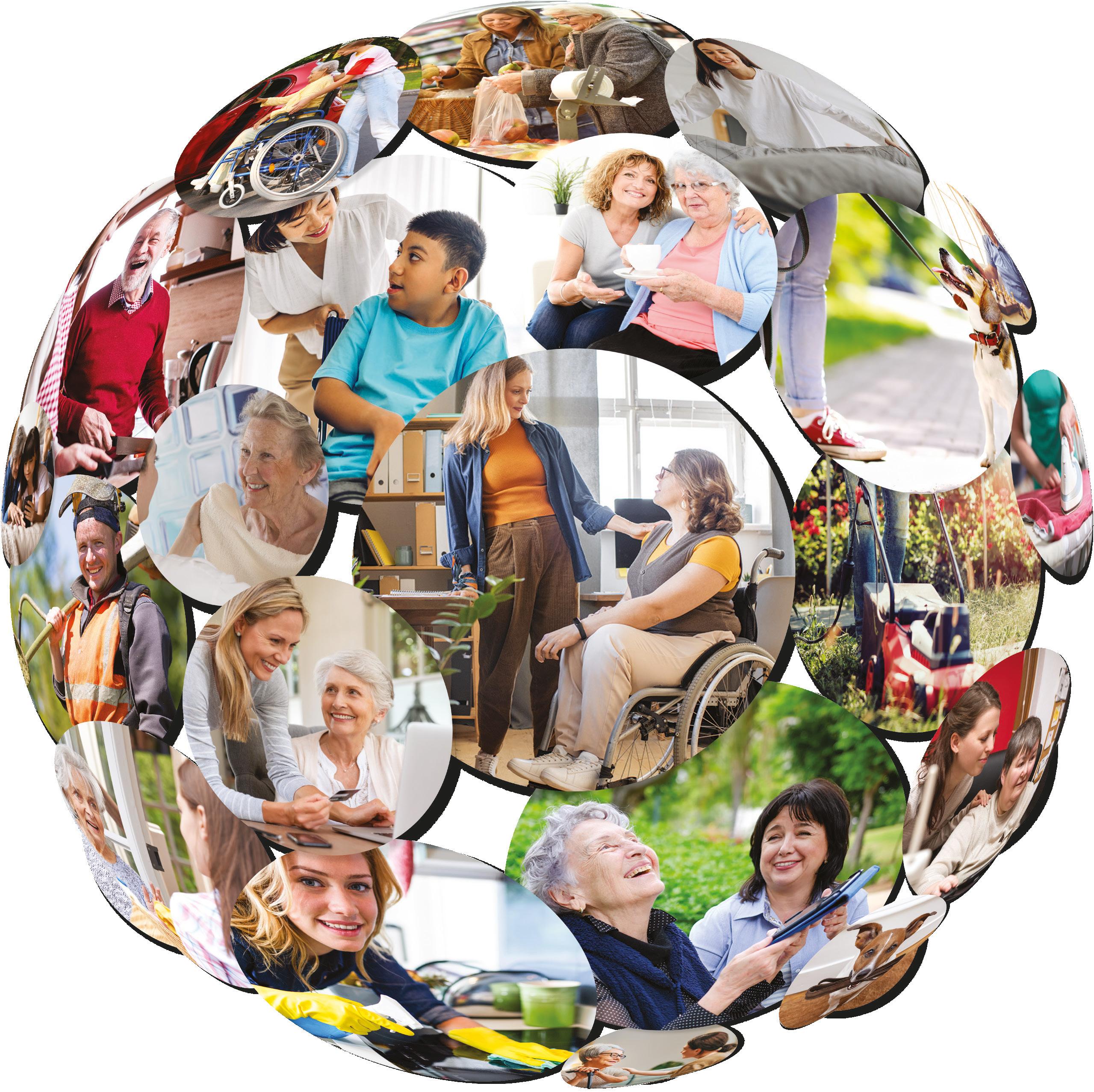
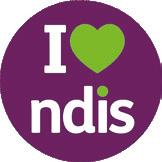

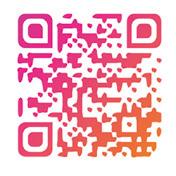

www.simplyhelping.com.au Personalised, flexible in-home care services New South Wales Illawarra 02 4244 3470 Sydney West 02 9623 6655 Victoria Melbourne Bayside & Peninsula 03 9574 0924 Inner & South Eastern Central and Northern 03 9661 0499 Eastern 0448 225 177 Greater Eastern North East 03 9001 8585 Outer South Eastern 0406 316 334 Regional Cntrl Highlands & Djerriwarrh 03 5341 8046 Geelong & Barwon 03 5261 4808 Gippsland South and West 03 9799 4676 Goulburn Valley 03 5795 1635 Loddon Mallee 03 5486 0203 South West 03 5381 2076 Queensland Cairns 0458 720 217 Western Australia Lower North Perth 08 9371 9115
06
From the Editor
08-09
Cover Story: Our first Assistant Minister for Autism Emily Bourke talks about the challenges facing the autism sector
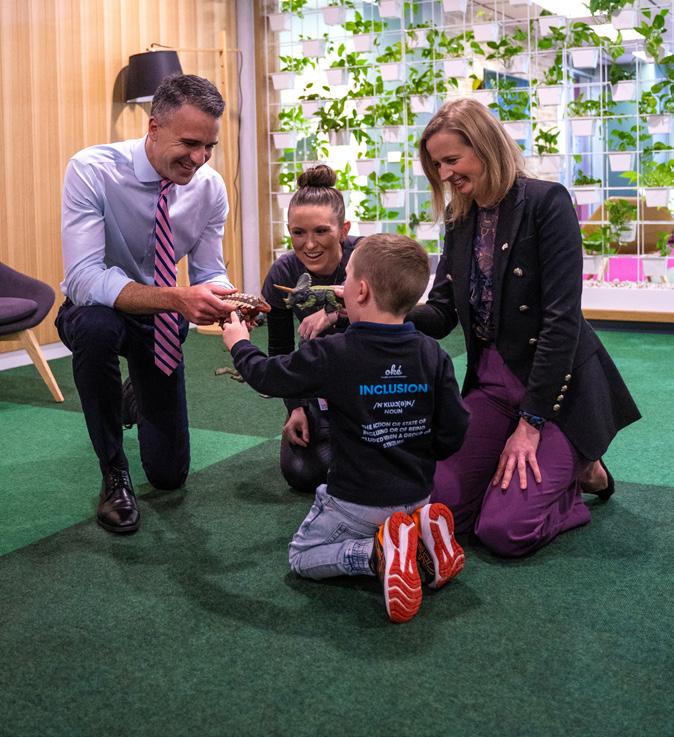
12-13
Why neurodiverse music man Ky Lovell loves performing on stage
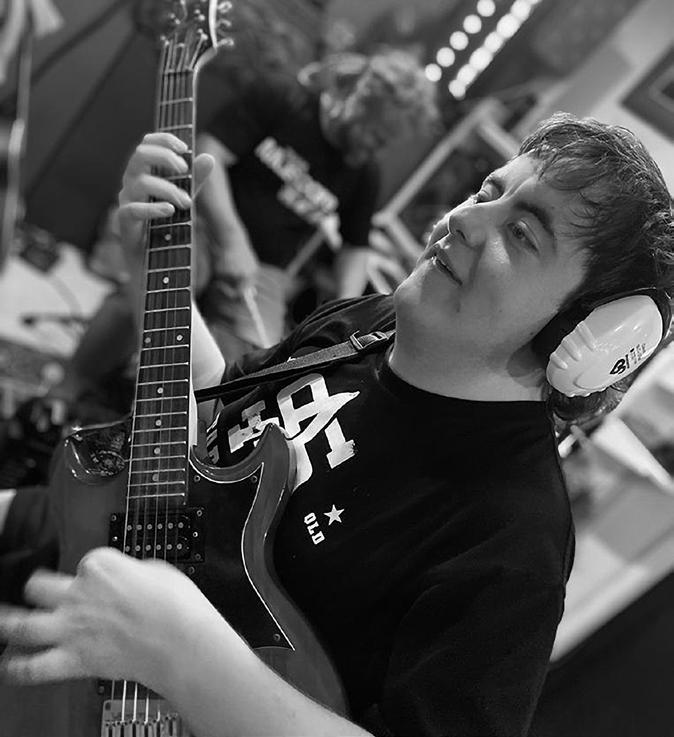
32-33
Scott Hollier reports on the latest assistive technology devices from the US

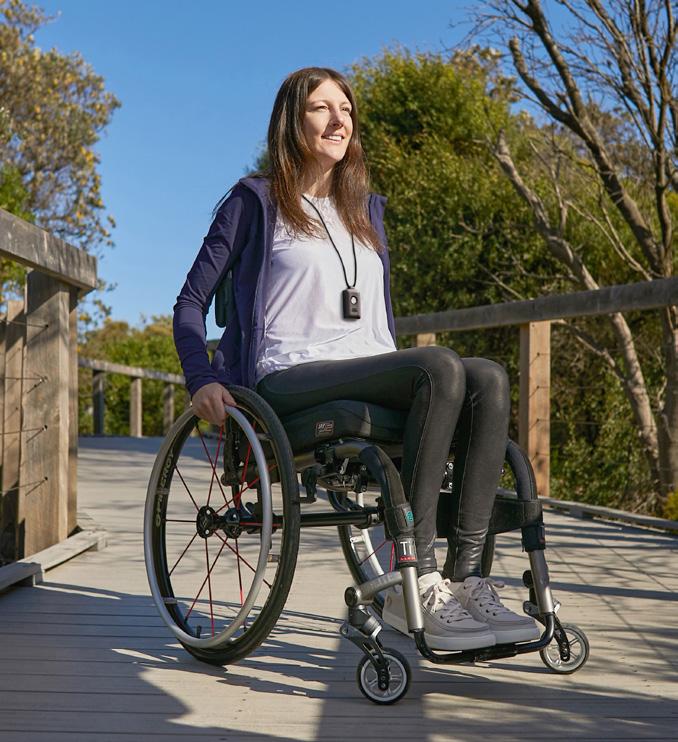
34-47
A preview of the ATSA Melbourne Expo
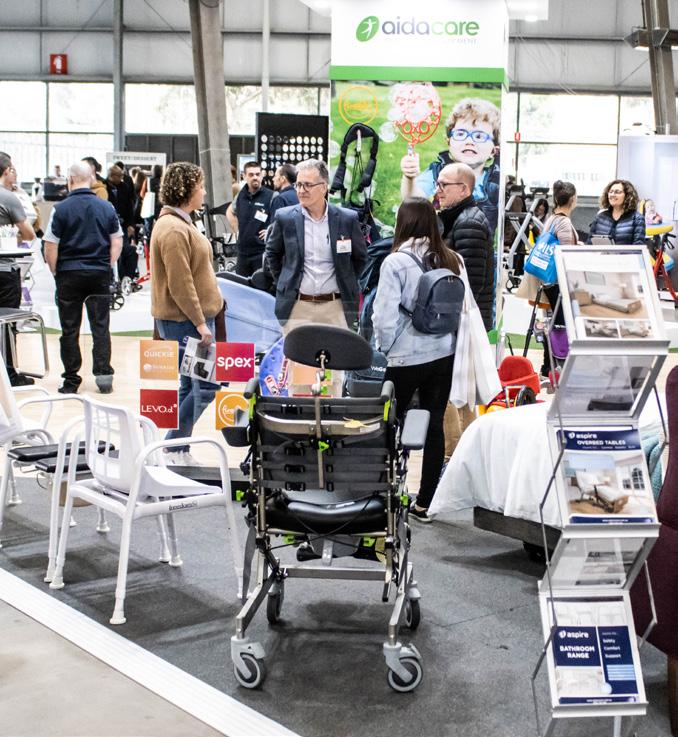
48-57
Accommodation & Home Support – where the living is easy
58-73
The latest news on Autism from a new guideline to resources for autistic adults
79-81
Assistance Dogs – what it takes to become a therapy dog
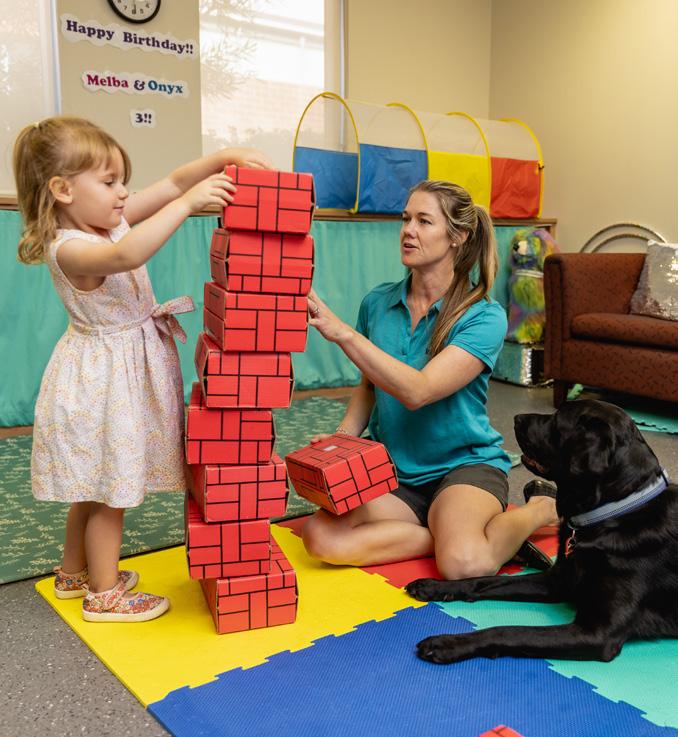
79 50
08 Inside 34 12 32 April/May 2023 4
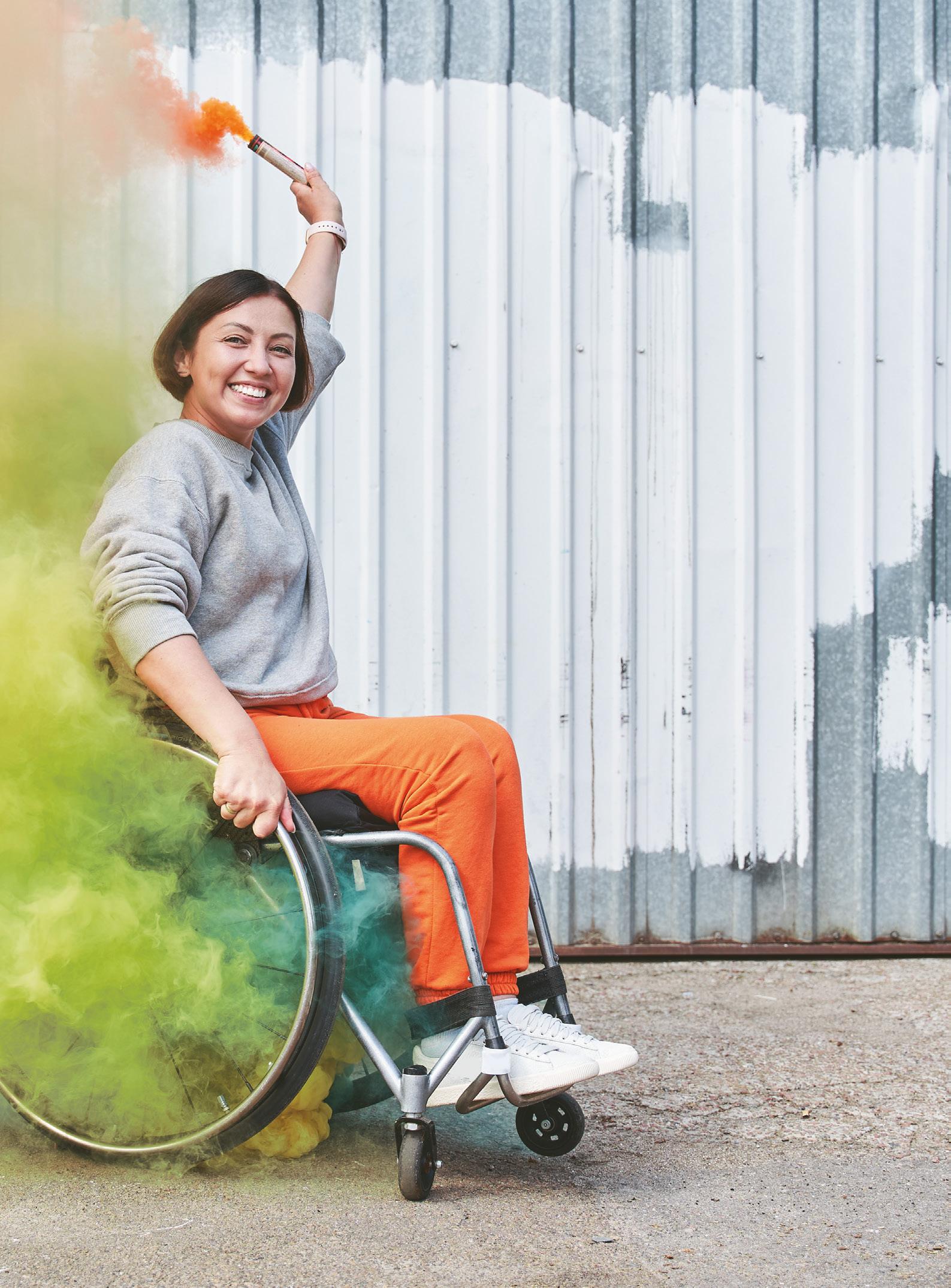

1300 789 845 www.atsaindependentlivingexpo.com.au Organised by Media Partners Australia’s foremost assistive technology event BY THE INDUSTRY FOR THE INDUSTRY MELBOURNE 24-25 MAY 2023 MELBOURNE SHOWGROUNDS PERTH 31 MAY - 1 JUN 2023 CLAREMONT SHOWGROUND CANBERRA 7-8 NOV 2023 EXHIBITION PARK (EPIC) ADELAIDE 6-7 MARCH 2024 ADELAIDE SHOWGROUND
Publisher
Simon Cooper
Editor Kymberly Martin kymberly@intermedia.com.au

Advertising
Michelle Stevens
mstevens@intermedia.com.au
0419 822 717
Design
Sarah Vella
Prepress
Tony Willson
Production Manager
Jacqui Cooper
Subscribe
To subscribe visit www.intermedia.com.au
P: 1800 651 422 or E: subscriptions@intermedia.com.au www.linkonline.com.au
Link is published six times a year by Interpoint Events Pty Ltd.

ABN: 9810 451 2469
A: 41 Bridge Road, Glebe NSW 2037
P: +61 2 9660 2113
F: +61 2 9660 4419
Reprints from Link are permitted only with the permission of the publisher. In all cases, reprints must be acknowledged as follows: ‘Reprinted with permission from Link Magazine’, and must include the author’s byline.
The opinions expressed in this publication are those of the authors and do not necessarily represent those of the publisher.
The Intermedia Group takes its Corporate and Social Responsibilities seriously and is committed to reducing its impact on the environment. We continuously strive to improve our environmental performance and to initiate additional CSR based projects and activities.
As part of our company policy we ensure that the products and services used in the manufacture of this magazine are sourced from environmentally responsible suppliers. This magazine has been printed on paper produced from sustainably sourced wood and pulp fibre and is accredited under PEFC chain of custody.
PEFC certified wood and paper products come from environmentally appropriate, socially beneficial and economically viable management of forests.
From the Editor
Welcome to Autism Awareness Month. On our cover is Australia’s first Assistance Minister for Autism Emily Bourke and she tells us about her unique role and what she hopes to achieve. There is an interview with Professor Andrew Whitehouse on the new National Guideline for supporting the learning, participation and wellbeing of autistic children and families on page 58 and a beautiful story from Suzanna Poredos who has autism, is a poet and has given Link an extract from one of her poems which you can read on page 65.
Elsewhere there was big news on the assistive technology front from the Consumer Electronics Show held earlier this year in Las Vegas. Read Scott Hollier’s report on the quirky and the cool on pages 32-33.
Neurodiverse musician ‘with perfect pitch’ Ky Lovell loves to hang out with fellow musos. He attends all the gigs in town and has some advice for budding musicians you won’t want to miss.
Many of our readers will be heading to Melbourne when the first ATSA Expo event for 2023 kicks off on May 24. The stellar new product lineup includes innovations in wheelchair technology, the latest in adaptive fashion, fitness and vehicles and we also have the complete guide to ATSA’s biggest ever seminar program.
And thank you to those who responded to our giveaways. Liz from Victoria won the Sisterwould beauty products for the blind and visually impaired. Her entry was: “Working out between shampoo and conditioner while in the shower requires memory and preplanning. I need to put one in different areas of the shower. Finally, a product that understands this difficulty and offers a solution”.
Kymberly Martin | Editor kymberly@intermedia.com.au
Like us on Facebook /linkdisabilitymagazine
linkonline.com.au April/May 2023 6
We’re hiring! Find a job you love
Employment opportunities are a critical part of an inclusive, empowering community for people with disability.

Employment with Support
We offer supported employment opportunities for people with disability wanting to gain new skills, feel part of a team and earn an income.
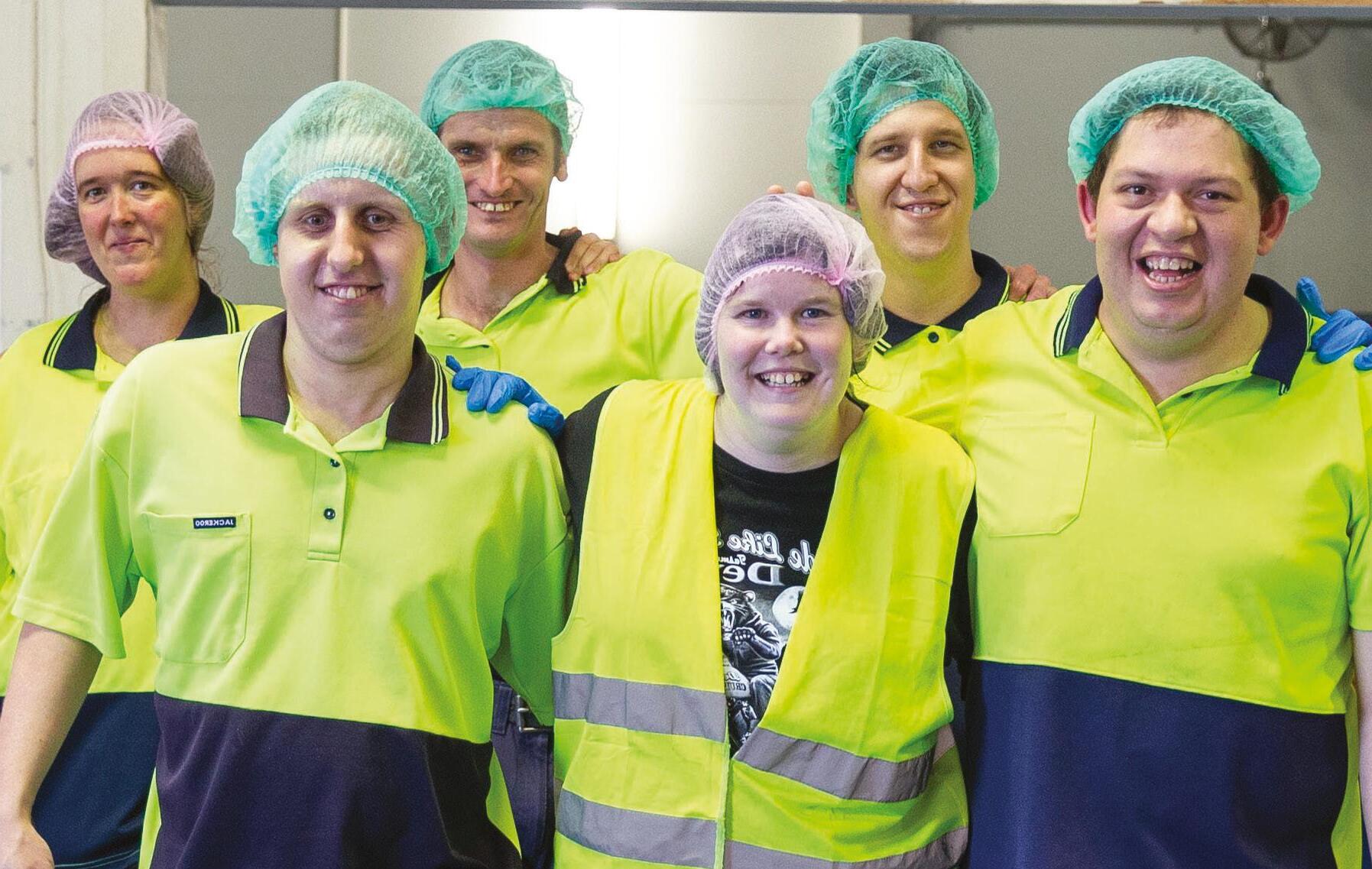
Mainstream Employment
We work in partnership with Community Solutions Group, a Disability Employment Service (DES) provider who can help you find open employment in Queensland and Victoria.
Employment gives you the opportunity to earn an income, have fun with friends and experience new activities, all in a safe and supported environment.
Endeavour Foundation are hiring right now across Sydney, Melbourne and Queensland. Visit endeavour.com.au/supported-employment to find a job you love!

Interview with Australia’s first ASSISTANT MINISTER FOR AUTISM
Assistant Minister for Autism Emily Bourke is responsible for implementing the South Australia State Government’s autism policies. In a first for Australia, she was appointed in August 2022, in addition to her role as Assistant Minister to Premier Peter Malinauskas.
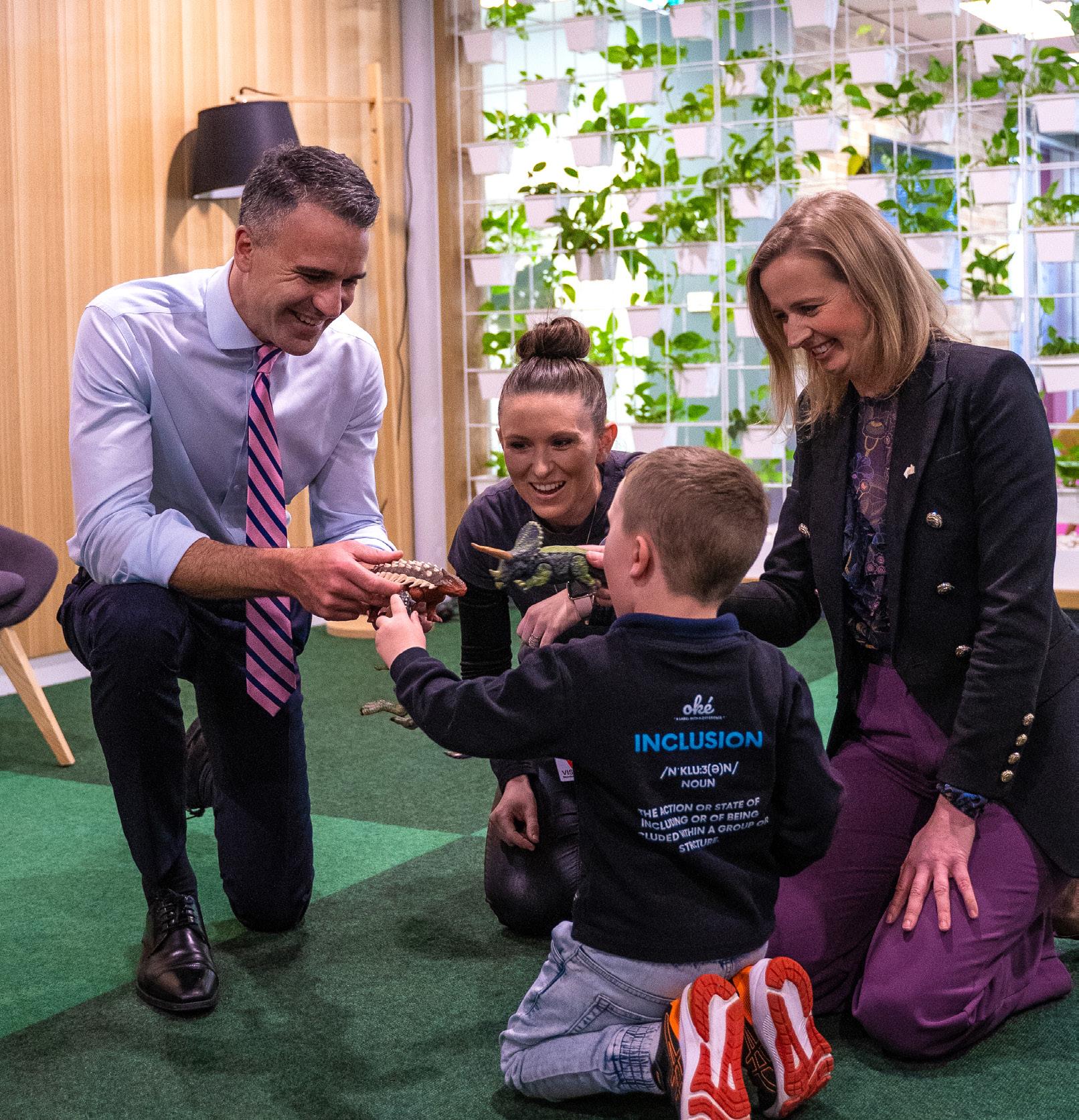
that they want supports that are child and family centered that emphasise the strengths of autism.
Challenges facing the autism sector?
In our most recent consultation on the State’s first Autism Strategy, the autistic and autism communities submitted more than 1000 survey responses and hundreds more provided feedback at face-to-face forums. The autistic and autism communities shared challenges experienced with health, education, employment and community sectors. The challenge that emerged most frequently across these sectors was a lack of broader community knowledge of autism. That is why the Malinauskas Labor Government has committed to changes that will help build knowledge and understanding of autism.
Is the SA Government making any policy changes in relation to autism?
Most recently, the Malinauskas Government established the Office for Autism in the Department of Premier and Cabinet, placing inclusion at the heart and centre of government. During the 12 weeks of consultation on the state’s first Autism Strategy, the autistic and autism communities continually raised the need for a centralised hub of information to be led by autistic people.
Your thoughts on the new National Autism Guideline?
The recent release of the Supporting Autistic Children Guideline can help bring consistency to autistic
families when they are working with service providers. The guidelines share what autistic children and their families have been telling us during consultation,
Having autistic people lead the Office for Autism is crucial to ensuring that the work of the Office will create a fairer and more inclusive and knowledgeable society for the autistic
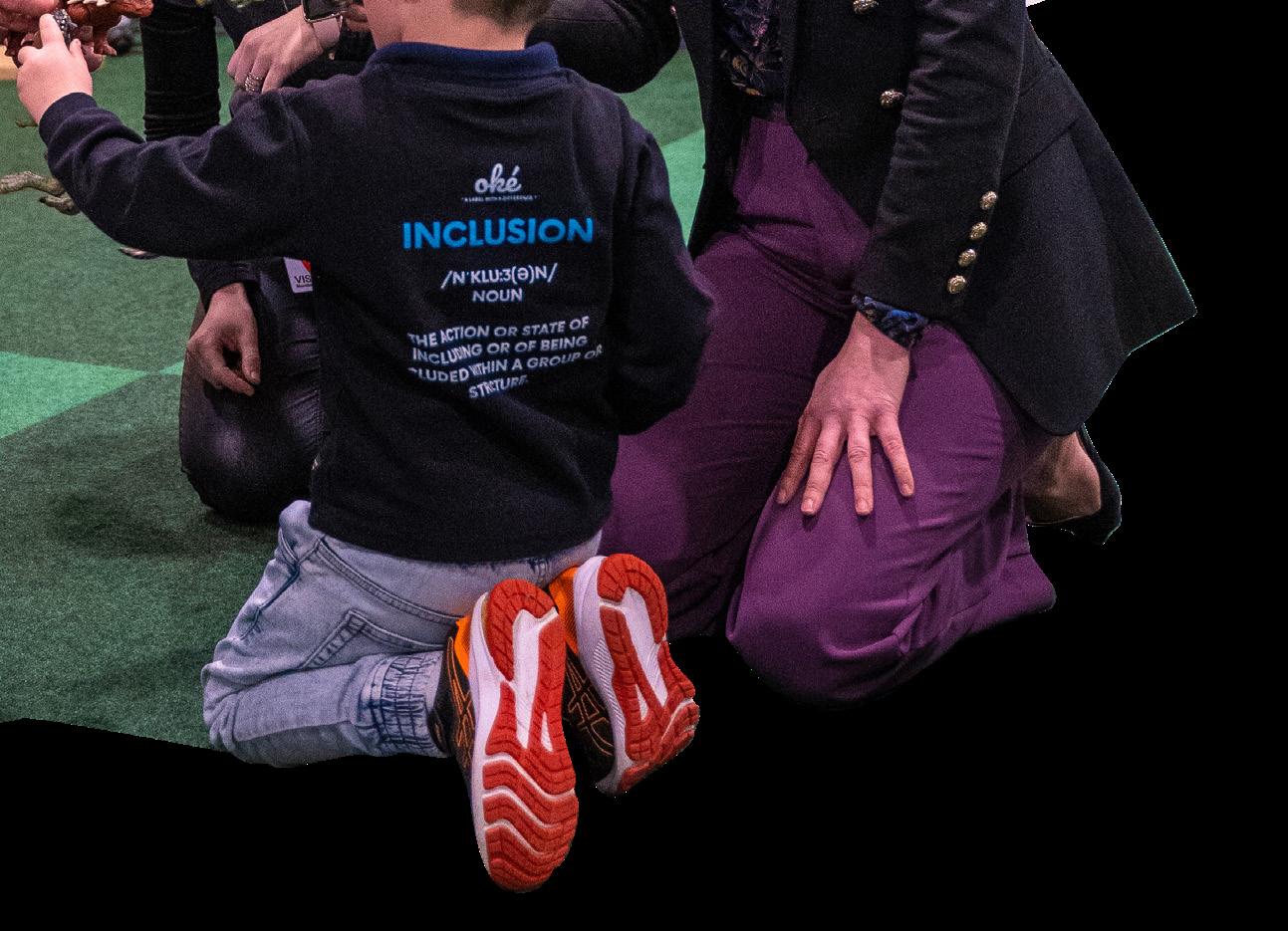
Link to... Cover Story
April/May 2023 8
WithPremierPeterMalinauskas
and autism communities. That is why the Department of Premier and Cabinet have advertised for two senior roles, director and community engagement officer to be filled by autistic people. Autistic people have been included in the creation of these job adverts and will continue to be consulted throughout the recruitment process.
The government is also committed to other changes to support the autistic and autism communities that are already underway:
• Investing $28.8 million to fund access to an Autism Inclusive Teacher in every South Australian public primary school to help build knowledge and understanding of autism amongst school staff
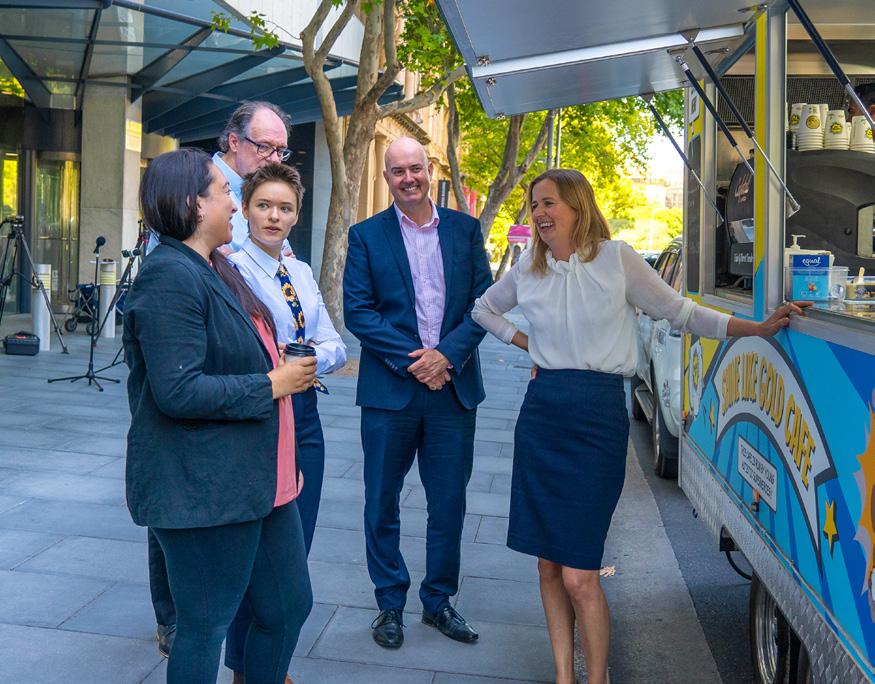
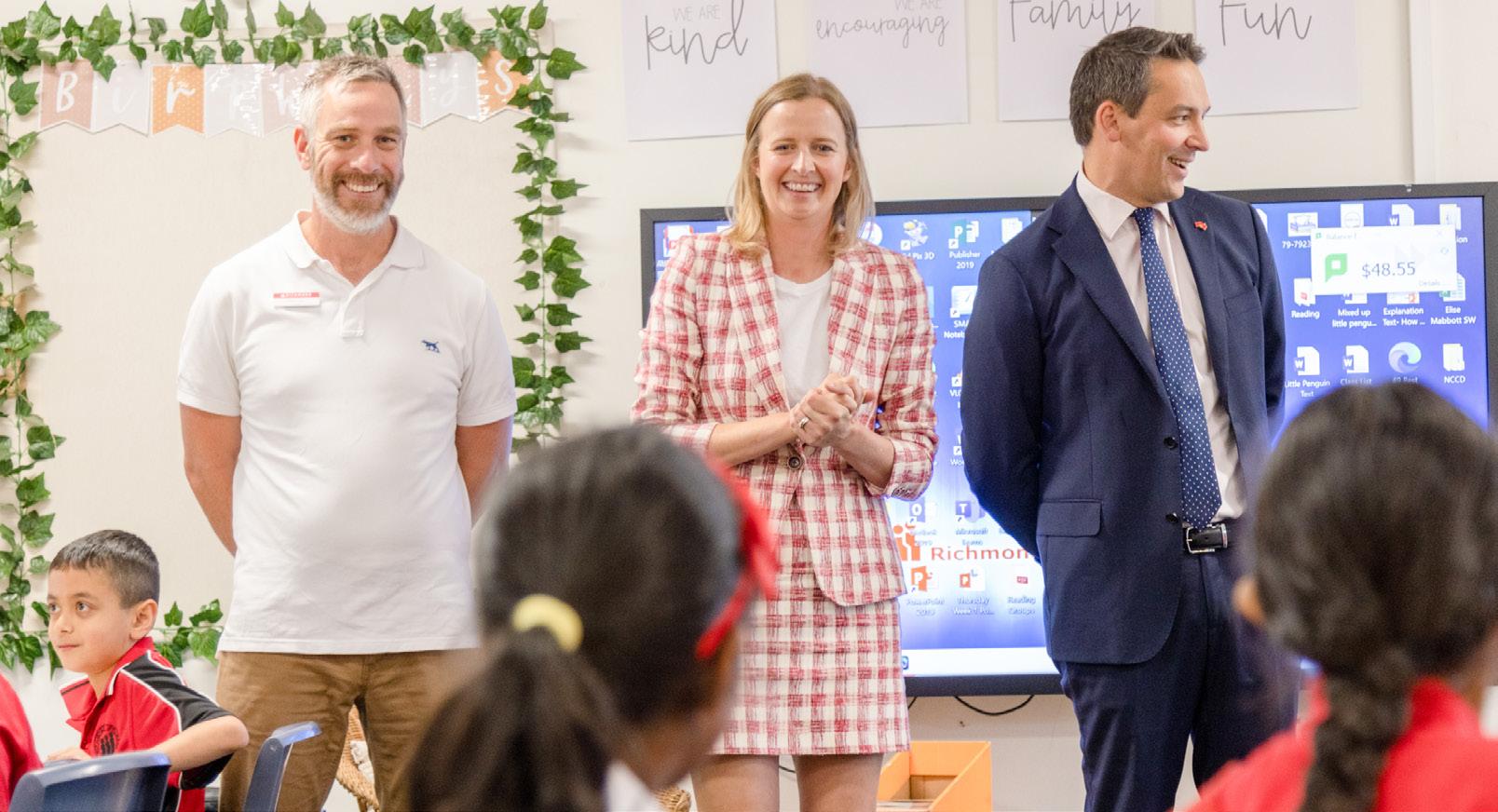
• Seeking to increase the number of staff in preschools with autism qualifications
• Working with service providers to offer support services in children’s centres
• Developing the State’s first Autism Strategy based on feedback provided the autistic and autism communities
• The government is the largest employer in South Australia so all state government departments and agencies will be required to sign up to an Autism Charter
• Investing $50 million to fund 100 speech pathologists, occupational therapists, psychologists and counsellors for access in public schools.
What you hope to achieve in your role?
The role of Assistant Minister for Autism is a first in the nation and perhaps the world. Since undertaking this role there have been other nationleading initiatives, including the establishment of the history making Office for Autism. We’ve achieved this by working with the autistic and autism communities and providing more opportunities for people to have their say. I hope my role demonstrates that things can be done differently, and when they are it’s not only the autistic and autism communities that benefit but the broader community too.
What are you hearing from the community about autism?
During consultation, the autistic and autism communities said there needs to be more autism awareness in the broader community. Many people in the broader community know the word autism but don’t know what it is. Autism occurs on a spectrum so there is no singular way that an autistic person experiences the world. Having autistic people involved in the development of autism initiatives can help bring a diversity of autistic perspectives to public policy.
Any comments on the NDIS?
The Malinauskas Labor Government chose to appoint an Assistant Minister for Autism because autism is the largest primary disability group on the NDIS. Our state also sits above the national average with 40 per cent of South Australian NDIS participants having autism. Autistic people and their families have shared their experiences and challenges with the NDIS. I, along with members of the autistic and autism communities welcome the NDIS Review by the Federal Government.
You mentioned the Autism Charter... is this a first for Australia and what does it entail?
Autism charters have been used in Australia in the private and not-forprofit sectors to increase employee knowledge of autism, but this may represent the first time where a state government has committed to
rolling out an Autism Charter across every state government agency and department. Everyone interacts with government departments and agencies on a daily basis. The autistic and autism communities have told us that more knowledge and understanding of autism is needed to improve these interactions and to make government departments and agencies more inclusive.
The roll out and contents of the Autism Charter will be shaped by the feedback we received during our 12 week consultation on the State’s first Autism Strategy. The South Australian Department of Human Services is currently working its way through the survey responses we received on top of feedback documented at face-toface forums and community catch ups in shopping centres, recreation centres and playgrounds to determine what the community would like it to entail.
COVER STORY
linkonline.com.au 9
Assistant Minister Bourke With Education, Training and Skills Minister Blair Boyer, right and autism teacher Robin Oien,left.
How can the new Astris PME website help you?





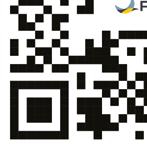
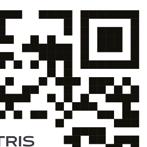
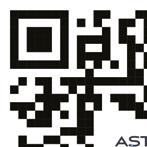
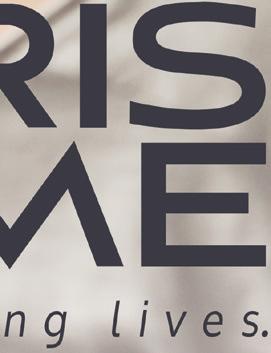















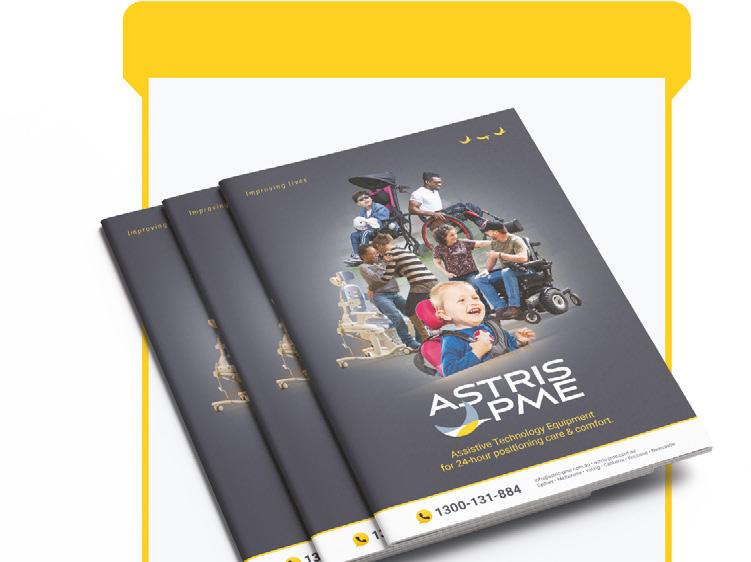
Introducing our newly redesigned website at astris-pme.com.au. Featuring an interactive client portal where you can keep track of your equipment, request service or hire, or make a trial appointment with one of our Specialist Consultants. It’s easier to navigate and find the information you need. The new design has been created with our clients in mind and features product information, brochures, helpful blogs, and much more.

As market leaders in special needs equipment in Australia, Astris PME can provide solutions that match the needs of people with a disability, and help therapists achieve the best outcomes for every client, in every age bracket. Please call us to enquire about any of the products and services we offer – we will be happy to help!
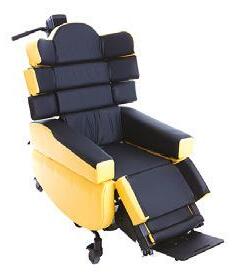
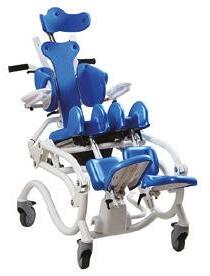
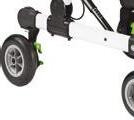
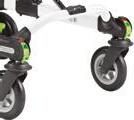
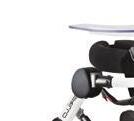
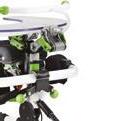

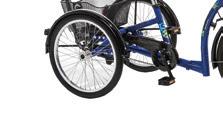
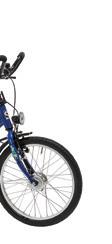
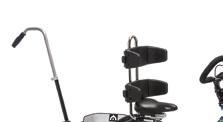

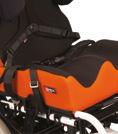
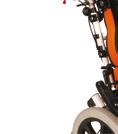
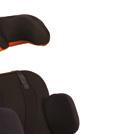
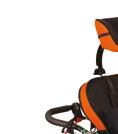
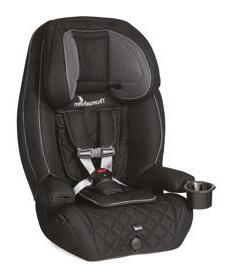


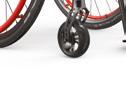

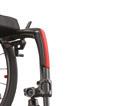
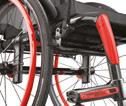


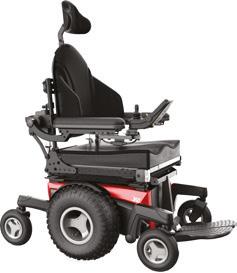
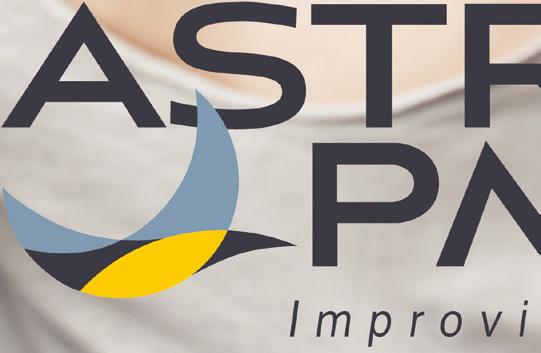

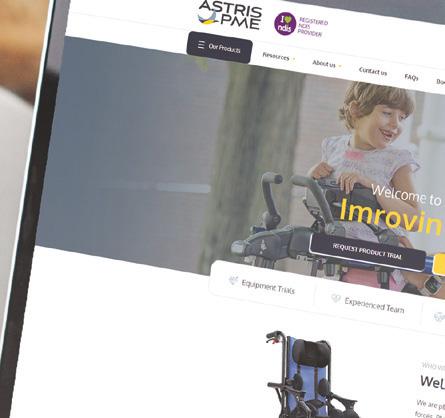





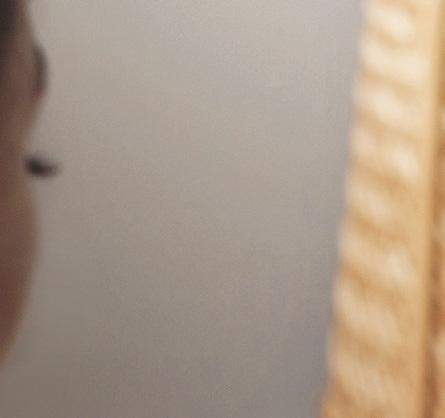
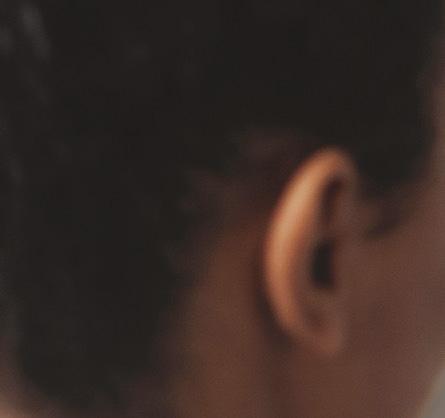


1300-131-884 | astris-pme.com.au Showrooms in Sydney • Melbourne • Young • Canberra • Brisbane • Newscastle
FREE TRIALS 2023 Edition! Scan the QR code to access the brochure Manual Wheelchairs Outdoor Recreation Car Seats Alternate Seating Tilt-In-Space Wheelchairs Gait Training Wheelchair Seating Systems Powered Wheelchairs Hygiene & Bathroom Trikes & Bikes FREE DOWNLOAD
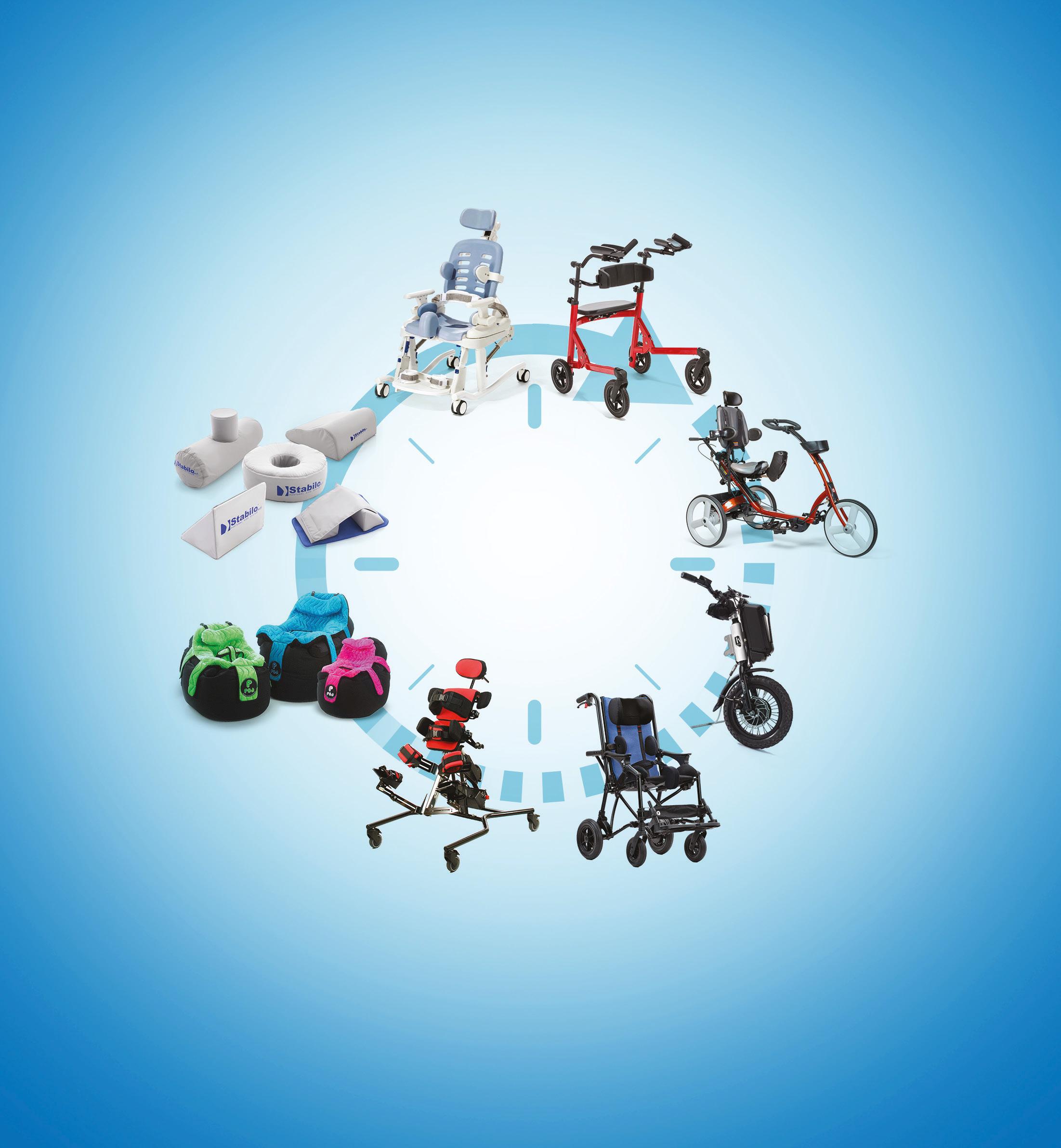































































24-Hour Positioning APEX Mobility supplies Australia and New Zealand’s largest range of specialised Assistive Technology equipment and supports for 24hr positioning, mobility and care. Schuchmann Malte Rifton HTS Rifton Trike 10AM12PM 8-10 AM 6-8 AM 9PM6AM 12-2 PM 2-4 PM 4-6 PM 6-9 PM Klaxon Klick Ormesa Trollino Timo Ella StabiloBed Sleep System SOS P Pod DEALERS THROUGHOUT AUSTRALIA AND NEW ZEALAND apexmobility.com.au 1300 212 192
Meet neurodiverse MUSICIAN KY LOVELL
Ky Lovell is a multi-instrumentalist with perfect pitch who can reproduce notes by ear. He told Link his goal is to work in the music festival scene as an inclusion coordinator, that is, when he is not performing on stage!
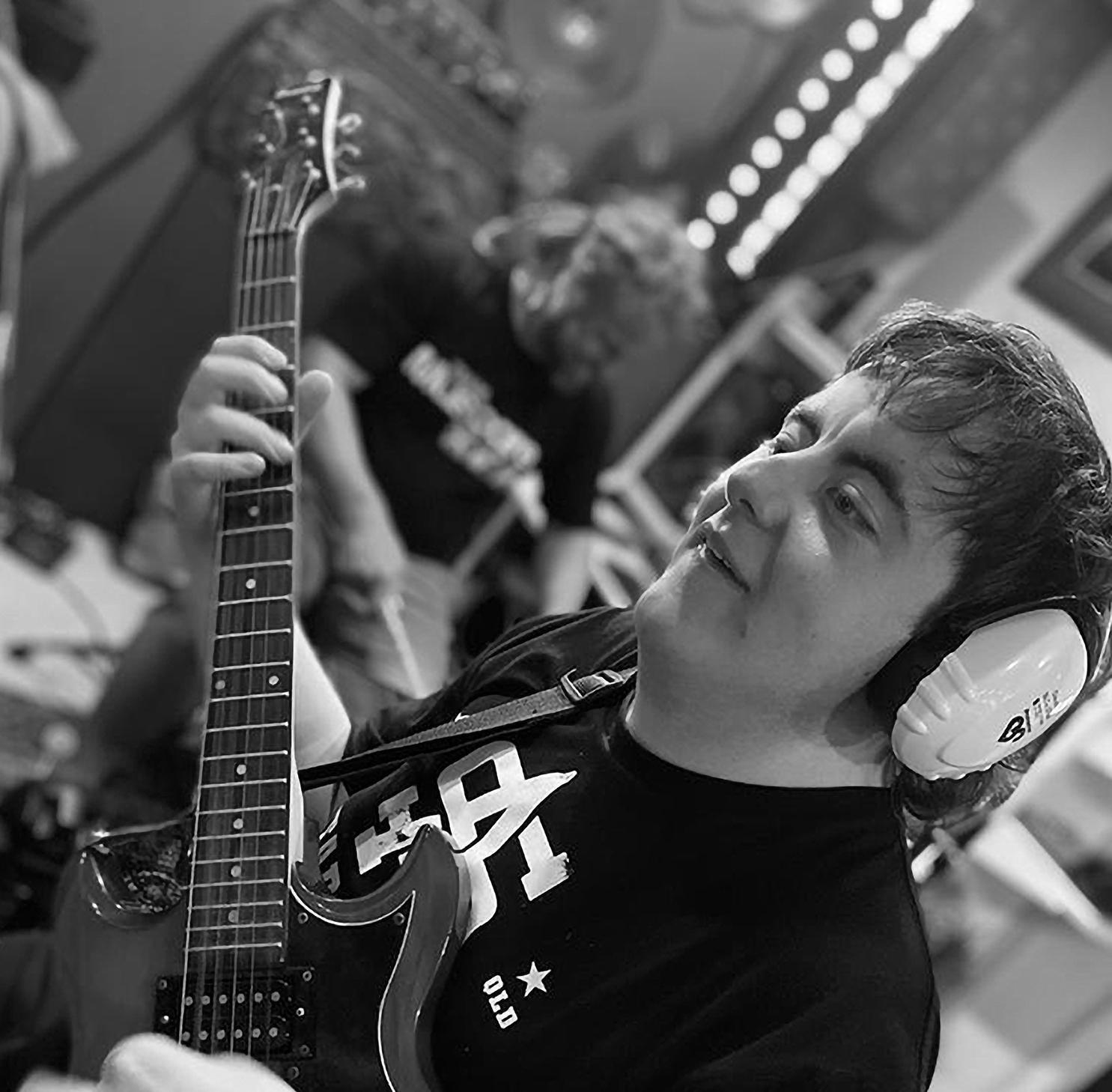
The 21-year-old, from Redcliffe, north of Brisbane, has profound symptoms of autism and other intellectual disabilities, but has discovered music is his way of communicating with the world.
Despite his disabilities, Ky has completed a Cert II in Music from the Queensland College of Music and was chosen as one of only 20 people to participate in the Audio Ability Project, a federally funded
community radio and podcasting course.
His favourite bands are AC/DC, Billy Strings, Tommy Emmanuel, Billie Eilish, John Butler, Foo Fighters, Powderfinger, Juzzie Smith and ZZ Top. And he reckons AC/DC’s Bon Scott should be on our $5 note!
“I have met Juzzie Smith a few times on his busking circuit, and teachers at my high school organised for Juzzie to play
KyLovellmaking music
at our Year 12 celebration Day. He is a super-talented performer/busker from Byron Bay who uses cigar box guitars, harmonica and box drum and juggles percussion with an amazing ability to use six instruments at once.
“I often get to hang out with local musicians such as the DJ who is the drummer for Busby Marou, Elle & Briony from Salt and Steel, Dan from Team Utopia and Amelia from Amelia & the
Link to... Entertainment
April/May 2023 12
Grizzly. Many of the people who support me in daily life are musicians themselves.”
He attended the Woodford Folk Festival, camping for seven days. “This is where I feel the most belonging... my community... so many musicians and music lovers. For me, the festival is the way the world should be, where a creative community the size of a small village, brings a totally inclusive and immersive experience of musicians and wonderment, surrounded by nature... the vibe is out of this world! “
In March for the first time, he headed to Hervey Bay for the Summer Salt Festival with its unique line-up of musicians including Xavier Rudd, John Butler, Boy & Bear, Busby Marou, Kate Miller-Heidke & Steph Strings were performing.
them your music bio, make short videos showcasing your talent and get yourself out there on social media with Instagram being the best choice I think for musos, and get involved by volunteering at festivals.”
He also recommended checking out ‘open mike;’ nights at local venues, collaborating with local musicians and venue owners, attending as many gigs as possible and starting your own local drum circle where people can join in with their own instrument. Also, get connected with the music scene by being a part of community radio and joining your state Music Industry body, such as QMusic in Queensland.
“I have started a drum circle in Redcliffe, Suttons Beach, every Thursday at
11:30am and everyone is welcome to come along and jam. Remember to have balance in your life. I also enjoy connecting with nature and have completed a horticulture course, practice yoga weekly, go sailing and canoeing, drama classes and circus practice.”
Ky is working on establishing his own business that involves consulting to other music festivals on how they can become more inclusive for people who are neurodiverse. He is also looking at setting up music hubs or jamming tents at music festivals where people can chill out and play together.
Contact Ky on: Instagram @kylovellmusic or his Facebook page: Ky Lovell Music or email: info@kylovellmusic.com.au
In March, he was invited to play at the Music in the Park, a Moreton Bay Regional Council initiative.
A huge blues fan he attends the three-day festival, Blues on Broadbeach every year in May and performs at Buskers by the Lake on the Sunshine Coast, in August, “with so many awesomely talented local acts. It's a music lover's paradise. I haven’t travelled interstate yet but would love to attend the Big Red Bash in the Simpson Desert, the Tamworth Country Music Festival and Dylan Alcott’s Ability Festival in Melbourne.”
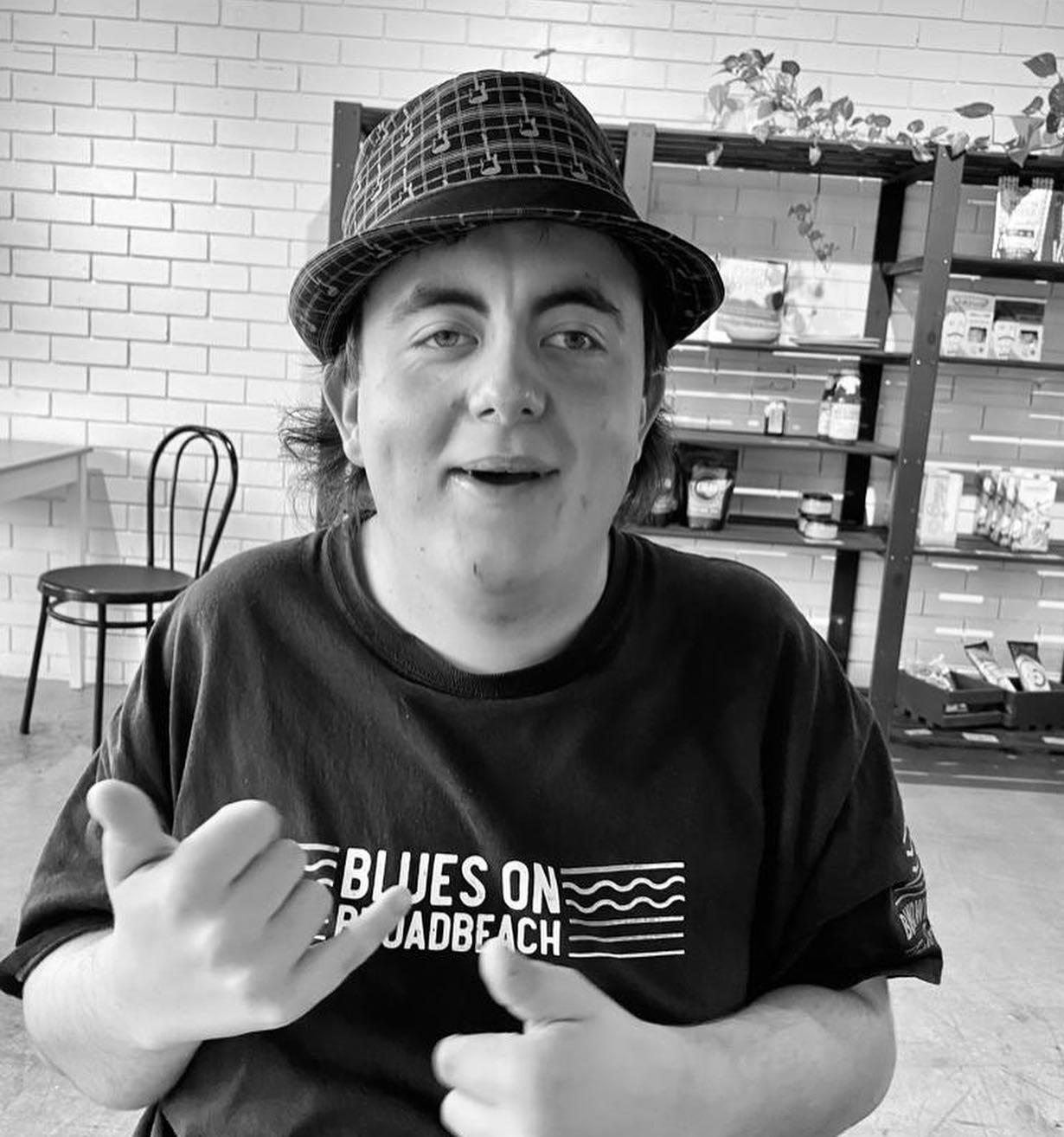
And he has some advice for budding musos with a disability as to how they can get started.
“Contact festival organisers, send
Ky is working on establishing his own business that involves consulting to other music festivals on how they can become more inclusive for people who are neurodiverse.
ENTERTAINMENT KyLovellmaking music linkonline.com.au 13
Telstra celebrates another year of disability confidence
By Layla Clarkson-Eather in collaboration with the Telstra Sustainability team.
Creating an environment where diversity and inclusion are celebrated is part of our T25 goal to be the place where people want to work. That is why we are celebrating being accredited for the fourth year in a row as a Disability Confident Recruiter by the Australian Network on Disability. The Disability Confident Recruiter program aims to remove barriers for people with disabilities during the recruitment process.
My experiences
Even when job ads mention that people with disabilities are encouraged to apply, I often feel uncertain and anxious about whether an employer will be accepting of my disability, or whether I will be discriminated against. Knowing that Telstra is a part of the Disability Confident Recruiter Program makes me feel comfortable applying for jobs, since I know they are able and willing
to make needed adjustments around my disability.
T his was the case when I applied for the Telstra Summer Vacation Internship program, as it had a disability stream. I felt comfortable talking about my disability and the workplace adjustments I would need.
My recruiter, Rachel Betts, even suggested adjustments to help with the hiring process. Knowing that Telstra is a part of the Disability Confident Recruiter, and my positive experience with how accepting the recruitment process for me was definitely encourages me to recommend Telstra to jobseekers with disabilities.
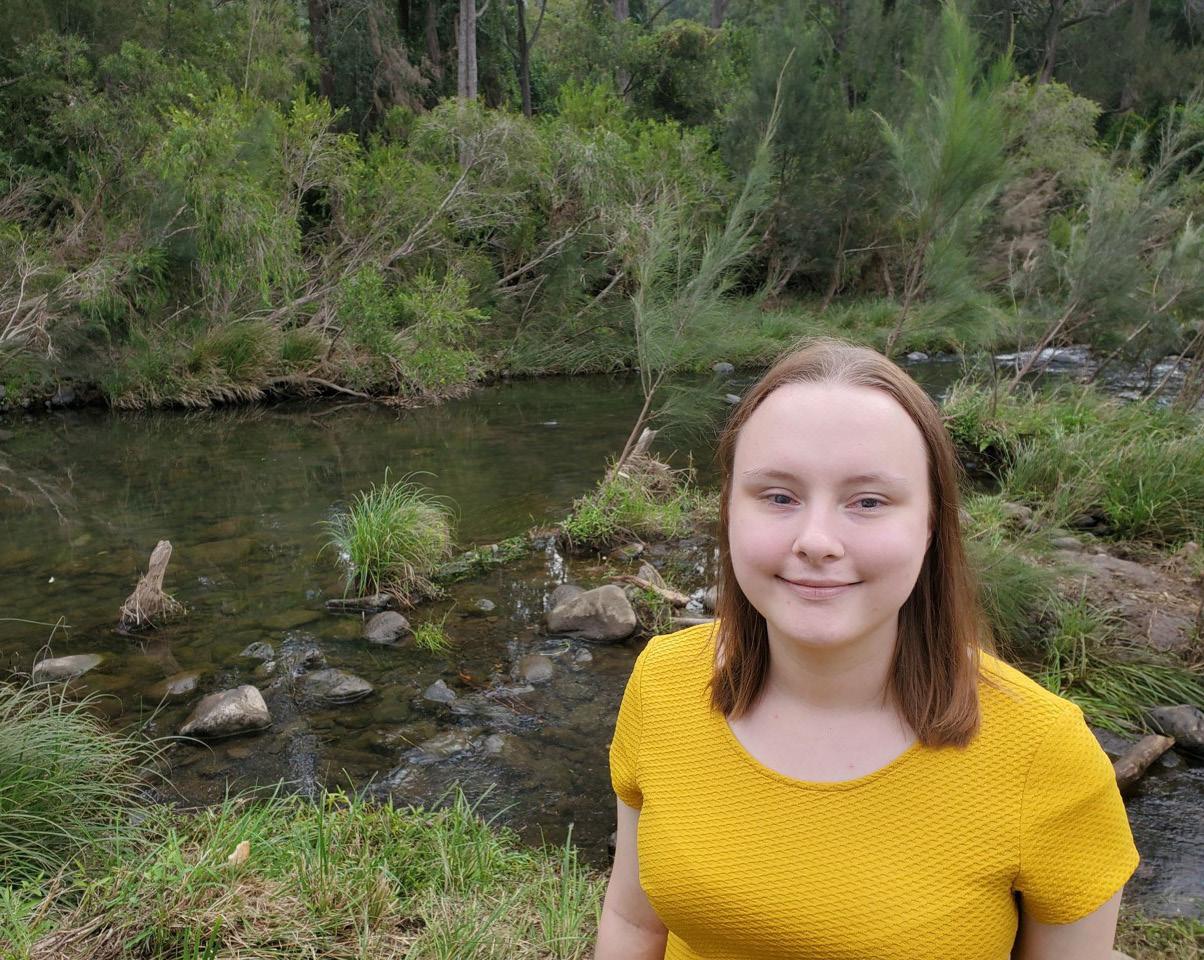
A recruiter’s perspective
I spoke with Robert Gatbonton, who is a recruiter with Telstra and is passionate about diversity, equity, and inclusion.
Disability confident recruitment is only part of the way Telstra is working toward attracting and retaining disability talent. The leading tech and telco company further has a formal Accessibility and Inclusion Action Plan that outlines its commitments to inclusive employment, responsibilities to its employees, its customers, and to the wider community.
You can read more on Telstra.com/AAP
He said that he feels incredibly proud that Telstra has been accredited as a Disability Confident Recruiter and that the company is so committed to having an inclusive workforce.
Through being involved with the Disability Confident Recruiter program, he expressed that Telstra is comfortable and willing to make needed adjustments for people with disabilities. In addition to being a part of the program, he highlights other ways Telstra is driving inclusive employment opportunities for jobseekers with disabilities with initiatives such as its Disability and Accessibility mailbox which provides an avenue for people with disabilities to communicate with their recruitment team; Telstra’s interview shortlist guarantee; in addition to recruiters working with Telstra undergoing annual training to ensure their processes are as inclusive as possible to all candidates, including people with disabilities.
Telstra’s approach to addressing the disability employment gap.
Link to... News 14 April/May 2023
Layla Clarkson-Eather at alpaca farm
More Choice at Hunter Disability Expo
T
he My Future, My Choice expos have kicked off for 2023, with the Hunter Disability Expo next on the calendar on May 12-13 at the Newcastle Entertainment Centre. These expos partner with, and promote, hundreds of locally based key organisations in the disability space, applying their wealth of experience and insight to a program of premium events in an ever-expanding list of locations in 2023 including Melbourne, Sydney, Nepean, Hunter (Newcastle), Gold Coast, Brisbane and Canberra.
community integration with a range of social, recreational, and sporting activities. All-ability entertainers, children’s activities and café food providers add to the culture-rich, weekend atmosphere.
T he Hunter Disability Expo aims to inspire people living with disability, family members and carers. Over 100 exhibitors present cutting-edge equipment, assistive technology, mobility aids, medical, health and support services, long term care options, and a variety of financial, travel, lifestyle and sport options for people of all abilities.
T he program of events promotesD uring the two days, there will be a program of insightful topics from guest speakers, entertainment for all ages, live stage performances, a coffee van and plenty of seating to socialise and chat.
Mel Harrison, of Sitting Low Reaching High, will MC the expo. Diversity and inclusion are a huge passion for Mel as she strives to break down barriers, remove stereotypes about people with disability and show that there is ability within everyone. People like to throw around the word ‘trailblazer’, but when it comes to Mel Harrison, there is perhaps no word more suited. She’s just recently gone down in history as the first person with disability to compete in Australia’s iconic Shitbox Rally.
Doors open for free entry to the massive two-day event from 9:00am to 3:00pm on May 12-13, 2023. Register your group to skip the entry queues at: hunterdisabilityexpo.com.au
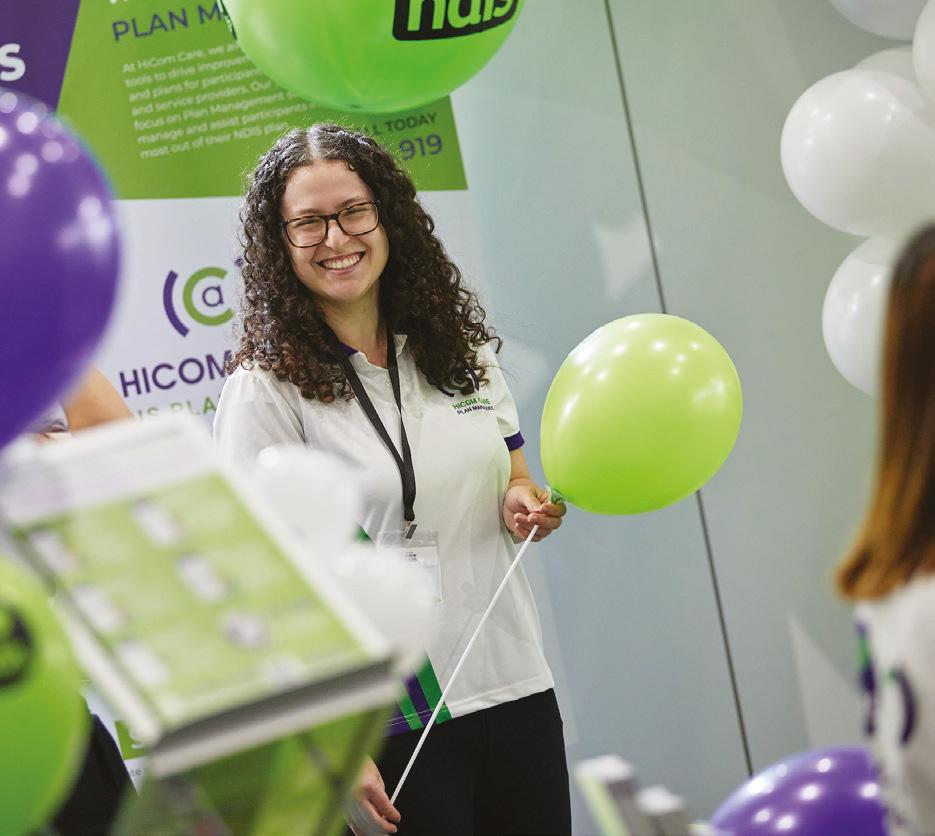
Check out the Expo Guide listed on the website for a schedule of events and parking/transport options as we get closer to the dates.
More choice, more impact from Australia’s biggest disability expos 31 MAR 01 APR 2023 CALENDER FRI & SAT goldcoastdisabilityexpo.com.au
FREE ENTRY
MY FUTURE, MY CHOICE 16 FRI 17 SAT JUN hunterdisabilityexpo.com.au
ImpactInstitute is excited to be bringing you our next season’s suite of seven disability expos occurring in key locations along the eastern seaboard of Australia.
In 2023, the My Future, My Choice expos bring together more than 1000 locally based disability product and service providers to ignite imaginations and equip attendees for a better future.
04 FRI 13 FRI

05 SAT 14 SAT
AUG OCT events@impactinstitute.com.au 02 9025 9380
sydneydisabilityexpo.com.au brisbanedisabilityexpo.com.au
01 FRI 17 FRI

02 SAT 18 SAT
SEP NOV
12 FRI 13 SAT MAY canberradisabilityexpo.com.au melbournedisabilityexpo.com.au
NEWS linkonline.com.au 15
Our first Expo of the year will be the Nepean Disability Expo 31 March & 1 April 2023, at the Penrith Valley Regional Sports Centre. nepeandisabilityexpo.com.au
T he Impact Institute recognises that people with disability are in dire need of accurate information from government agencies, local politicians, and keynote speakers and to interact with exhibitors to spark a picture of a hopeful, more fulfilled future.
WHILL power chairs for living an active life
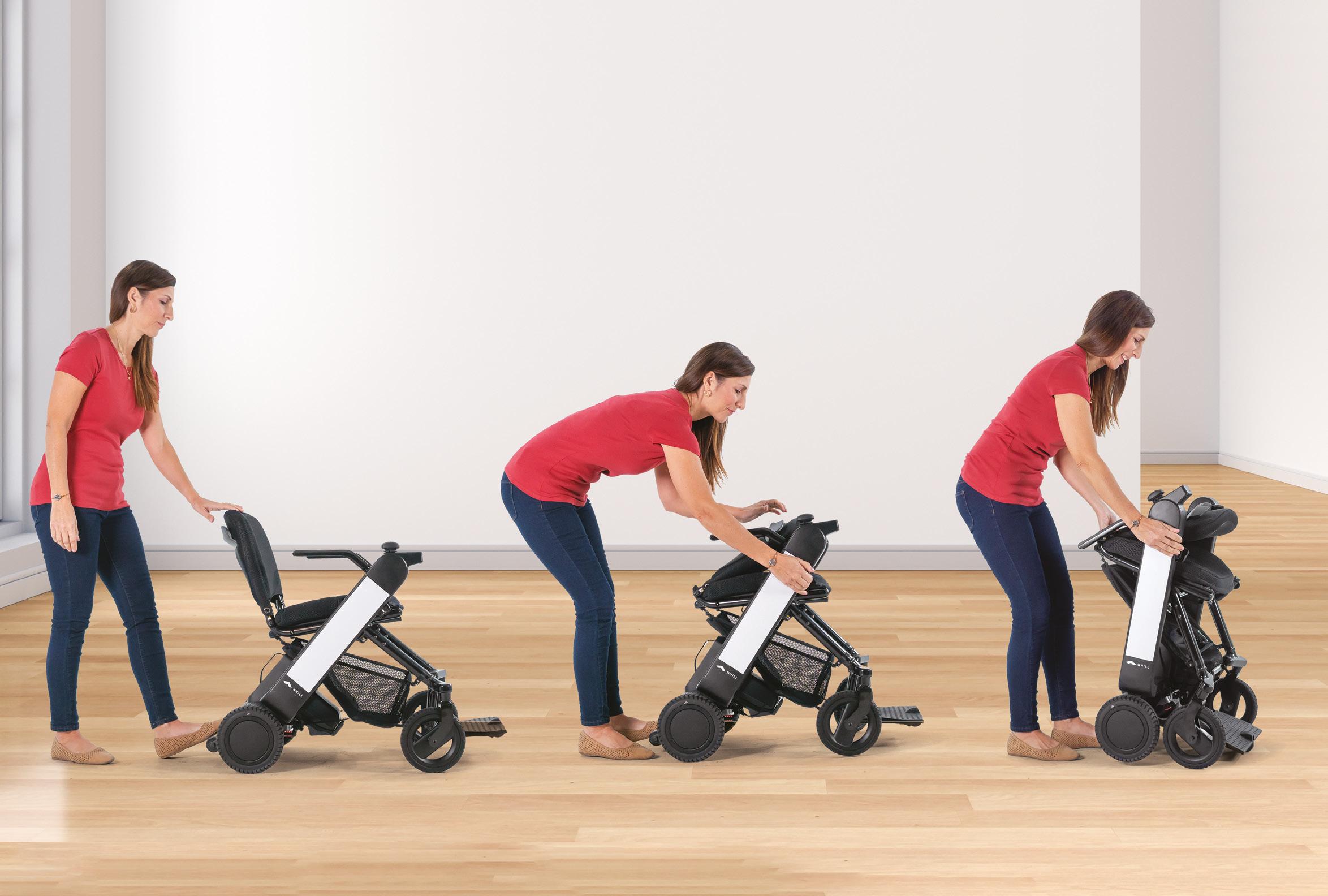
Aidacare are the exclusive distributors of WHILL, which focuses on innovative design and s tate-of-the-art technology, allowing you to express your confidence, style, and independence, empowering you to be you. With WHILL live a life without boundaries, these products are built to challenge the perception of what mobility devices can be.
Connect your smartphone and use the WHILL app to check essential device information, check s ettings or remotely operate the chair's movements. Stay engaged in activities and embrace your s urroundings, knowing the WHILL will keep you safe whilst you ride with peace of mind. Drive in style, choose from eight different arm colour options for Model C2 and five different arm colour options for Model F to match your style. You can purchase a smart key, cane holder or lap belt for more convenience and personalisation.
WHILL Model C2
T he WHILL Model C2 is a revolutionary
approach to power mobility, evoking an active, can-do lifestyle. Its premium performance and superior engineering provide versatility and reliability to experience all-day adventures.
Simple to operate and can make tight turns with a 45 per cent tighter turning radius than tiller-operated mobility devices to get you wherever you need to go. Whether you’re driving around town or manoeuvring indoors. It effortlessly climbs over obstacles up to 5cm in height with two powerful motors, and large front patented Omni wheels. The rear wheel suspension absorbs the impact when driving over bumpy roads or obstacles, and an antisway system keeps you driving straight on side slopes. The electromagnetic brakes provide safe stopping, even on inclines.
T he Model C2 can be disassembled for easy transportation in the boot of any car. Whether shopping on the weekend or travelling with your family, the Model C2 allows you to live life to the fullest.
View configuration video: https://youtu.be/-6IxGqvlqI8.
WHILL Model F
Lightweight, foldable, and manoeuvrable the WHILL Model F allows you to explore your world with greater mobility and independence. A compact solution weighing only 24kg (without battery) it can be easily transported on buses, trains and in car boots. When not in use, the Model F can be conveniently stored in a closet or out-of-the-way in the corner of the room. Seating width can also be increased by 50mm, simply by swapping controls from one side to the other.
W hat are the differences between the Model C2 and Model F?
T he C2 is a pull-apart power chair, whilst the F is a folding chair. The Model F retains a lot of the same styling and technology as the C2 with the exception of the patented front Omni wheels, which are only available on the C2. To know more about the WHILL, visit: www.aidacare.com.au
Link to... Mobility
April/May 2023 16
WHILL allows you to live the life you aspire to with its impressive power, smart technology, and superior handling.
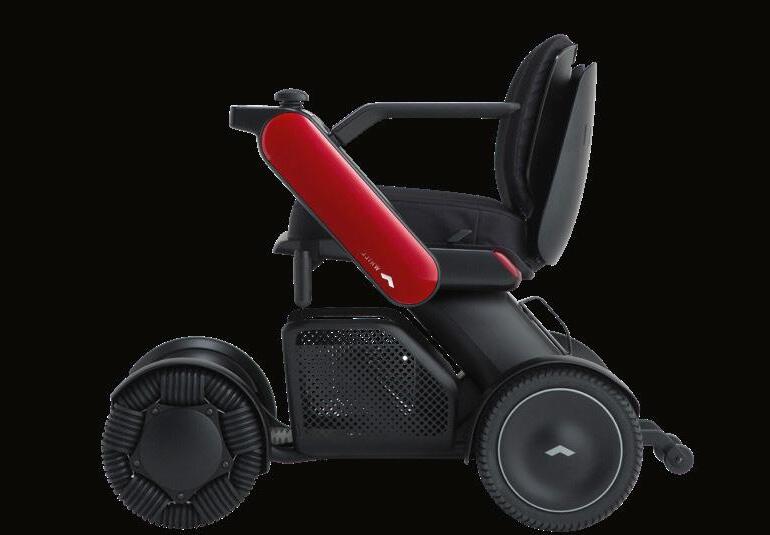
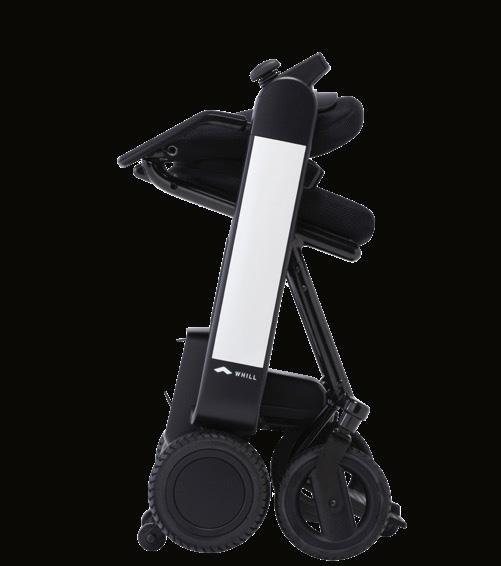
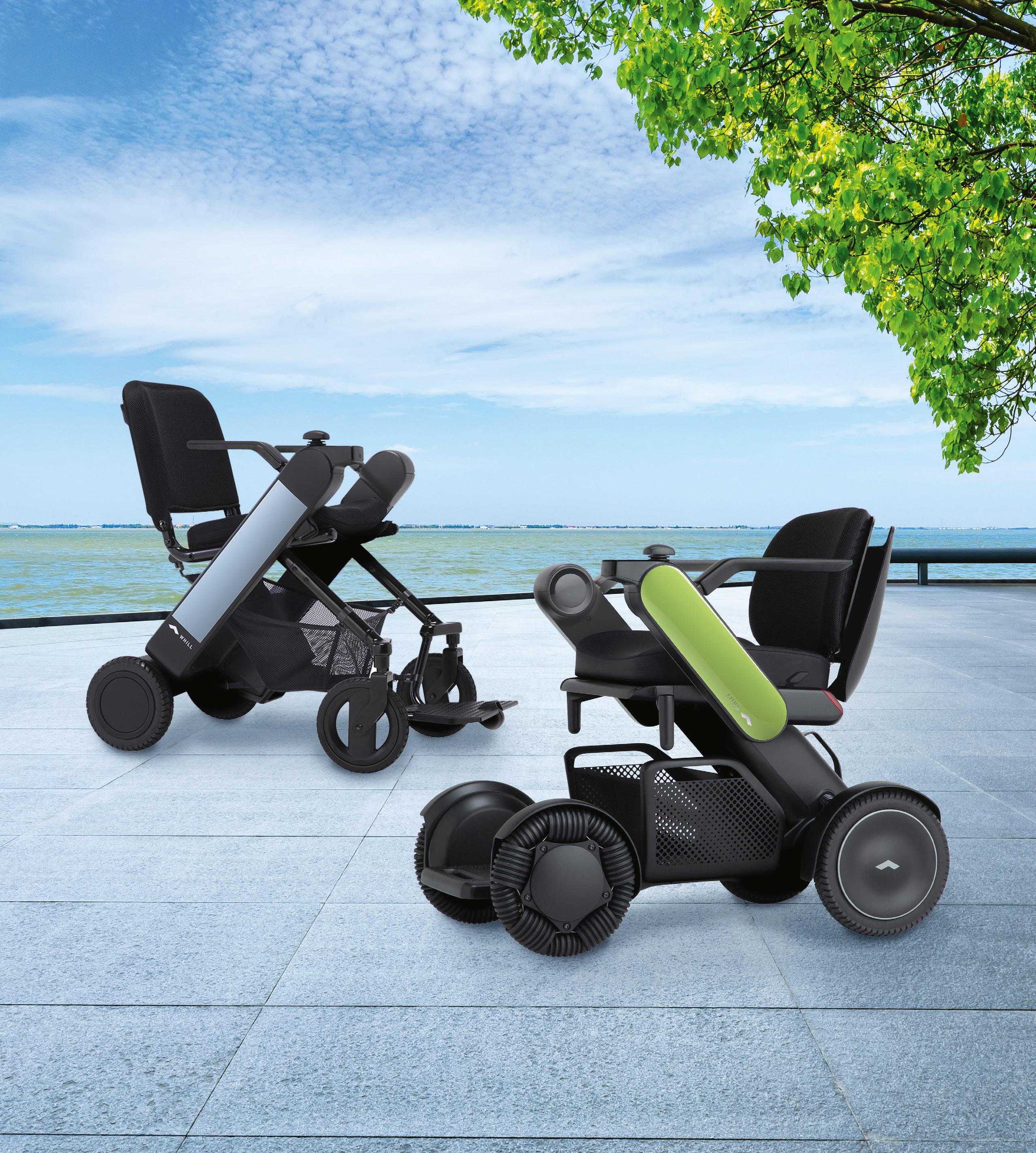
To view our Link EXCLUSIVE offer scan the QR code and SAVE UP TO $300

WHILL F
WHILL C2
Call for greater clarity
When it comes to Disability Employment Services data
Disability Employment Services (DES) has received significant criticism in the past few months and according to Nova Employment CEO Martin Wren, much is deserved.
He said issues with the DES performance measurement system (Star Ratings ) makes it hard for service users to find accurate comparative information.
“People with disability who are matched to roles they enjoy, and are supported to meet employer expectations are more than capable of holding down work, other than token roles with minimum hours of work paid at minimum or supported wages,” he said.
B arriers to genuine participation
“Australia has many examples of world class disability employment programs, not that you would know it, as accurate comparative data is limited and hard to find.”
Data should include information PwD (People with Disability) might find useful for enabling empowerment and exercising genuine choice and control, he said. “Ask the DES agency you are considering questions such as: “For the last five job your agency has found what is the average hourly pay, the average hours worked each week and how long did those jobs last?
“‘Choice and control’ is a noble slogan but to be meaningful, informed choice requires data and for DES that information is not readily available.”
Wren gave two examples:
E xample A: “This is an employment services provider that targets people in receipt of the Disability Support Pension (DSP) and looks especially for business owners with a need for workers prepared to undertake repetitive, labour-intensive work.
“Their management staff are experts
in the details of the DES contract and instruct their staff to find as many minimum hour jobs as possible, while telling clients that accepting an eight hour a week job offer is “a step to future opportunities, a dollar in their pocket and something for a resume”.
Wren said there are presently no incentives to encourage DES providers to seek more hours of work beyond benchmark. Instead, there are disincentives to not look for work that could offer greater stability, skills development and less likelihood of dismissal.
“For this organisation, where profit is the central driving force and reduced costs rule, full time roles are frequently broken up to create numerous minimum hour jobs. Full time roles go from 1 x 38 hours to as many as five part time jobs (5 x 8 = 40 hours).
“This company knows so long as the worker achieves benchmark hours, outcome payments are the same, whether participants work eight hours or 38 hours payments, paid at 13, 26 and 52 weeks, that gives the organisation five times the income from outcome payments.
“Unfortunately, after six months employment, the employer lets their worker go, they aren’t missed because their minimum hour work never allowed them to become part of the team. At the same time another part-time worker replaces them for the next six months.
“Meanwhile, the use of the government subsidy covered 70 per cent of workers’ wages.
“Placing five jobseekers at minimum wage and minimum hours in 26 weeks this company received 5 X 13-week outcomes payment and 5 X 26-week outcomes and 5 X Star Ratings credit,” he said.

E xample B: "T his company prides itself on meeting the individual ability and
aspirations of their job seekers, all of whom they know by name. Finding the right job for Mary* was a real challenge but nevertheless it wasn’t too long before she was offered a part time role. The team persevered and Mary soon settled in, initially working four hours a day, three days a week and then five days a week.”
After three months her employer asked if she could enroll in a TAFE accounting course and six months later Mary received her first nationally recognised qualification, coupled with praise and a pay rise.
“Both organisations make a difference but, rather than empower PwD the system favors the provider that pursues small hour roles ensuring PwD remain on the fringes of inclusion.
“For what it’s worth, no change can occur unless services are required to provide meaningful performance data and power is moved from service providers, to PwD,” Wren said.
Data source: https://data.gov.au/data/ dataset/disability-employment-servicesoutcome-rates-by-disability-type
*A pseudonym
Link to... Employment
April/May 2023 18
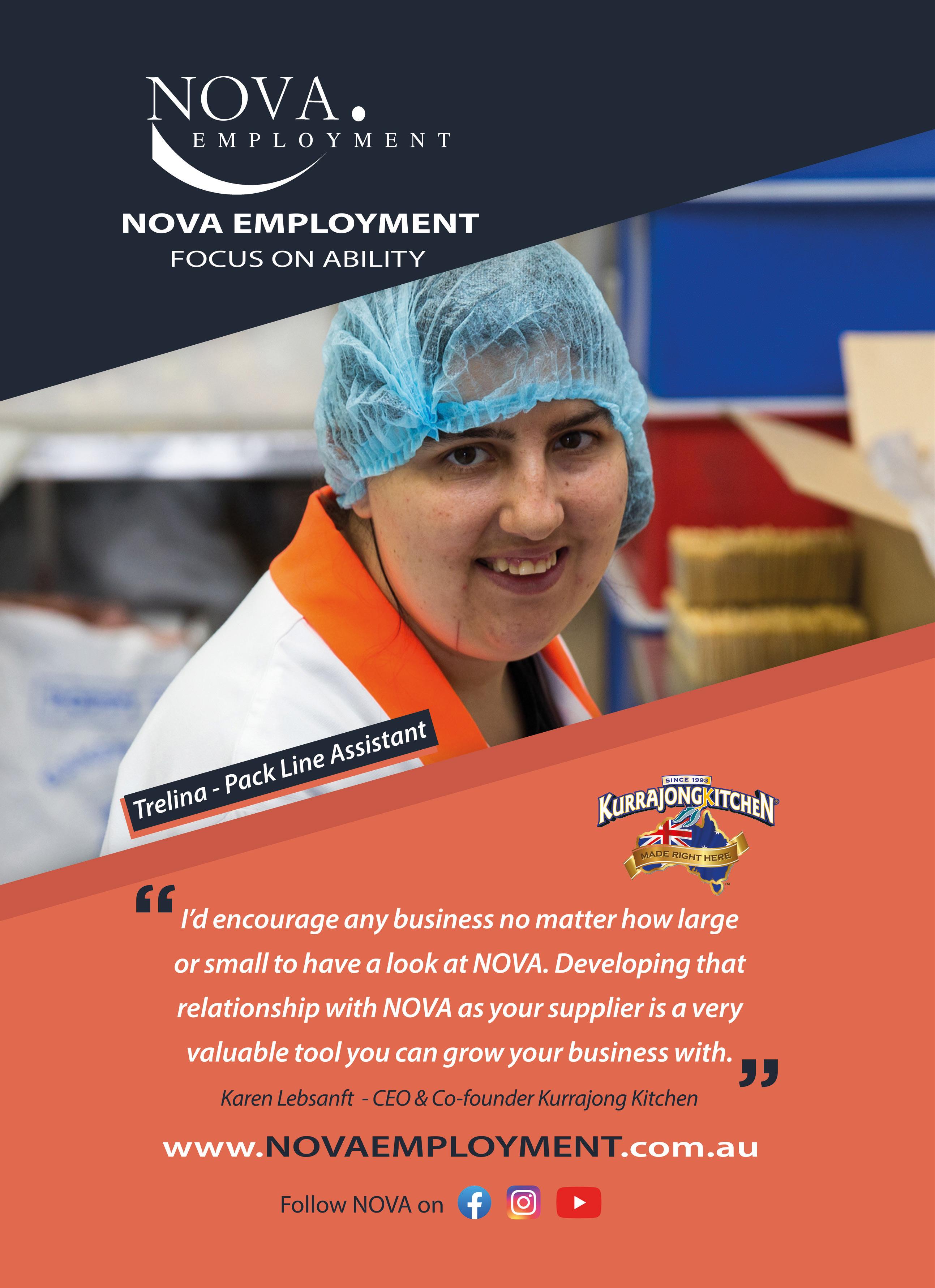
Madison finds job success with a strong support system
never lets her disability get in the way of her goals,” MatchWorks employment consultant, Launa Rand said. “She wants to show that people with disability can do anything.”
W hen the MatchWorks team suggested a role at McDonald’s, Madison was initially reluctant to embrace the idea. Then she put her doubts behind her and took the initiative to ring the local store.
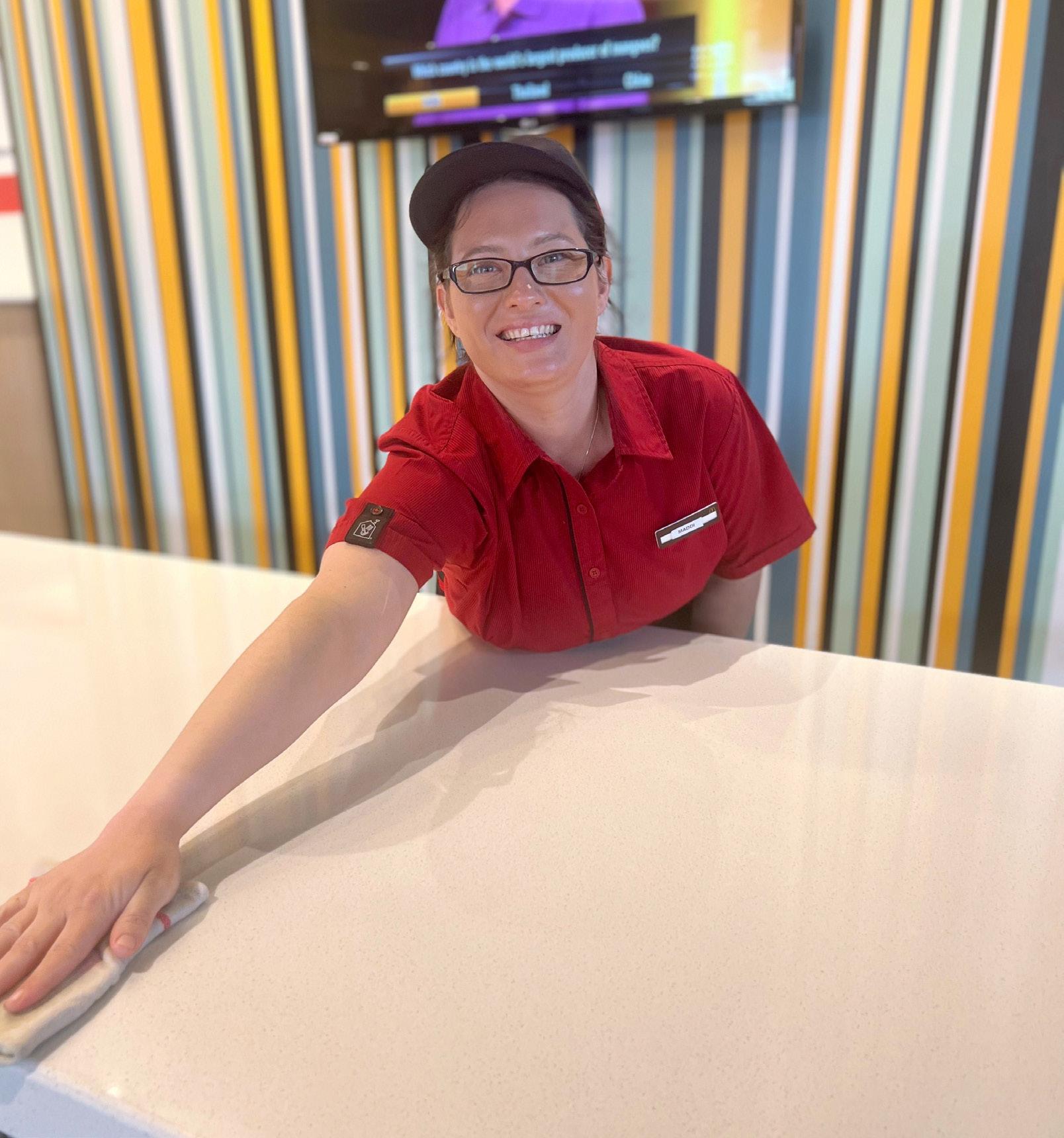
“I asked if they were hiring and had a brief chat to the manager. She thought this was all too good to be true and said: ‘Come in for an interview tomorrow.’
“I am not the strongest [at interviews] so having MatchWorks support was absolutely amazing and McDonalds hired me on the spot. It was very exciting…it’s interesting and a lot of fun.”
Madison has become a valued crew member of the McDonald’s team and is working over her benchmark hour, and she now sees a future where she can gain independence and support her family.
“A lot has changed for me. I’m not having to worry about money and can relax a little more. We had a late birthday celebration for my mum recently and I ended up paying for her. It was a very enjoyable night. My family, friends and MatchWorks have all been a massive support system for me. I can’t thank them enough.”
Madison Cooper has overcome several hurdles in her lifetime. The 31-year-old lives with an intellectual disability and has found it difficult to find an employer who would hire her. But with a tenacious mindset and a strong support system in place, she is now working and ready to take more positive steps towards achieving her career goals.
After moving to the Central Coast NSW, Madison was motivated to find work as soon as possible.
“I was applying for jobs like crazy, but it was really hard…I had moved from a little country town where everyone knew you, to a place where no one knows you at all,” she said.
T hen Covid hit and the job market became challenging. Determined to keep a positive mind-set, Madison used her time during lockdown to gain new skills.
“Madison has been one of hardest working job seekers we have seen and
Madison is keen to keep building on her skills with McDonald’s. She is also passionate about supporting people with intellectual disabilities and wants to become a teacher aid.
“I have a ‘big heart’ for special needs,” she said. “The school I attended, all the staff including the teacher aids, started that passion and I want to give back what they gave to me. No matter what struggles or hurdles you have got, you can get there with a bit of extra help.”
Link to... Employment
20 April/May 2023
Madison Cooper

We help you prepare, find and keep a job 1300 13 23 63 matchworks.com.au Your journey to employment
Dealing with disability discrimination in the workplace
This may be unsurprising to read, especially when you consider that 42 per cent of people with disabilities within working age (15 – 64 years) have experienced workplace discrimination either from their work colleagues, or the employer themselves.
At Spinal Cord Injuries Australia (SCIA), our EmployAbility service often hears stories from our community about how needlessly difficult it is to even gain work.
One SCIA staff member, Susan, who has lived experience of disability recalls her journey looking for work as having a consistently hard time, “I remember when I was in my 20’s and revealing my disability when I got to the interview stage of a job, just to check to see if they had wheelchair access. Suddenly they would call me back to ‘reschedule’ and never return my phone calls. So, I decided that I was going to stop telling people I have a disability altogether and dealing with whatever would happen.
“When I arrived at one job interview, the person interviewing me looked so scared and sat as far away from me as
possible. He didn’t know what to say. You will be unsurprised to know I didn’t get that job, or even a phone call back.”
T his is one of many stories our EmployAbility team hear when they help people with disabilities find employment. Our online job skills training program covers the topic of discrimination and your rights as a person with disability in the workplace and how to overcome barriers.
Dominika Jachym, one of our employment coaches with a lived experience of a lifelong disability, said that although there have been steps to be more inclusive for people with disabilities entering the workforce, there is still a gap. “In my role, I support people with physical disabilities to prepare for and engage in meaningful employment, and from my own personal experience there is still a great divide.
“Sometimes perceptions on the types of roles available for people living with disability can be based on stereotypes, rather than actual skillset. Also, many of our participants worry
about mentioning their disability in the early stages of the employment process, with workplace adjustments seen as too costly, or requiring “too much effort”. The fear of being overlooked for a promotion due to physical disability rather than being given equal opportunity, can be a very disheartening,” she said.
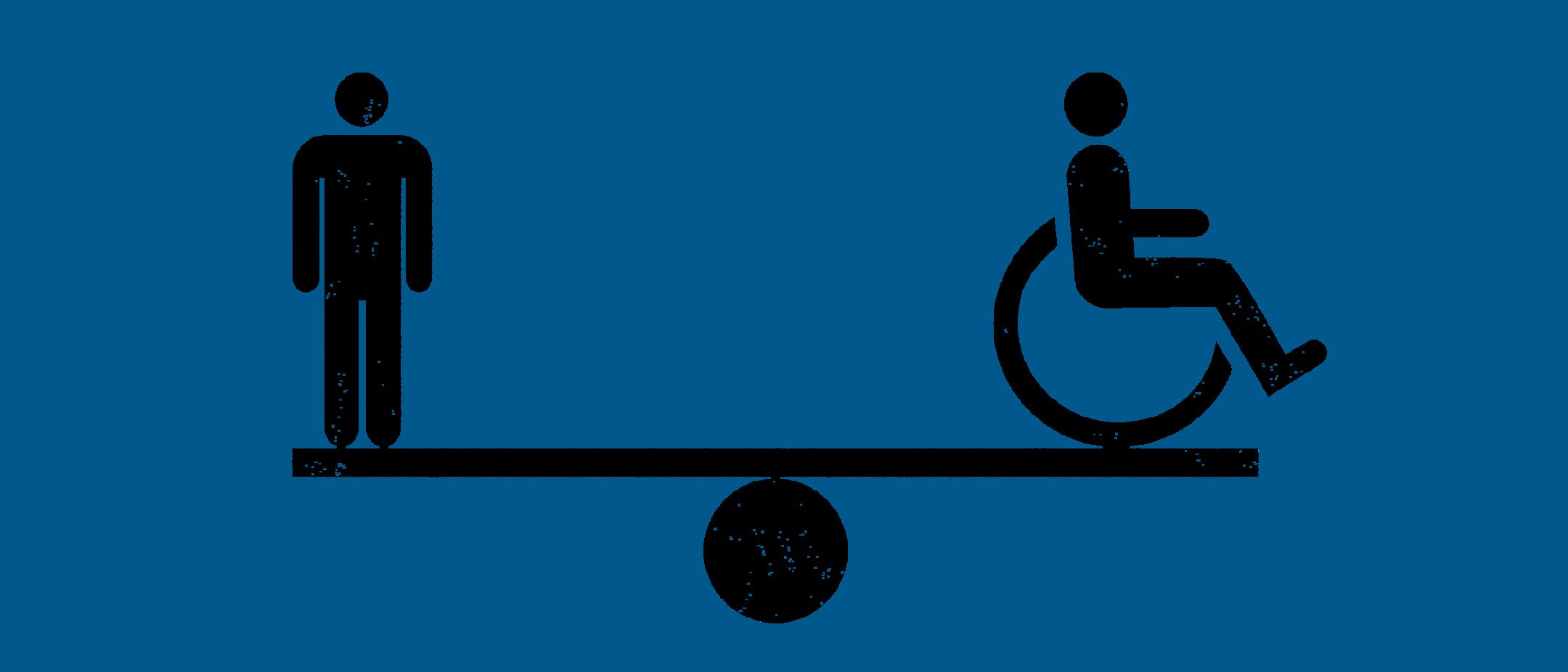
“Our job is to help people living with physical disability to understand these hurdles, build greater confidence and help navigate these challenges to secure the dream job they deserve. On the flipside, EmployAbility also plays a significant role in educating employers on best practice with disability and inclusion in the workplace, to ensure disability discrimination is being tackled from all possible angles.”
If you live with physical disability, or you know of someone who lives with disability, who is looking for work and need some help support on their job search journey, visit employability.org.au or contact one of our employment coaches at: employability@scia.org.au
Link to... Employment
22 April/May 2023
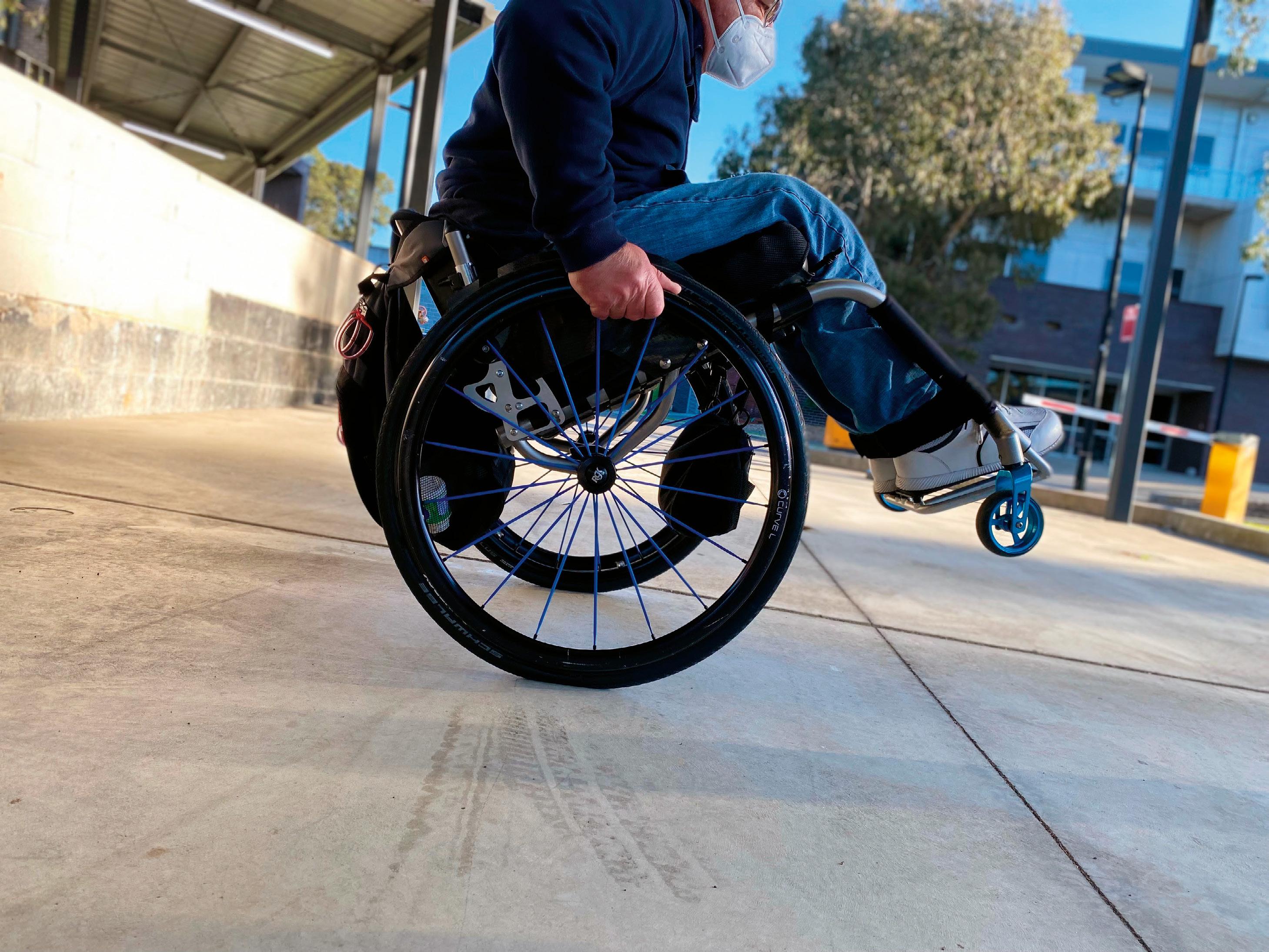

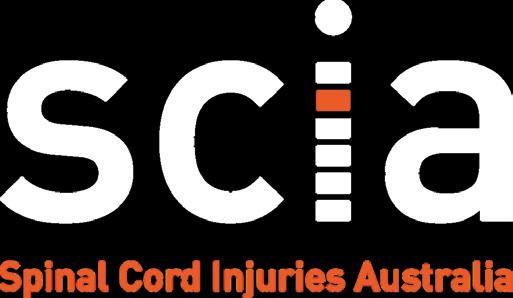
https://scia.org.au/resource-hub LISTEN WATCH READ Funded by Australian Government Department of Social Services. For more information visit DSS.GOV.AU scia.org.au/resource-hub/ Information for people with disabilities curated by people with disabilities
We deliver Freedom - You choose the destination.

As our customers, who we consider family, know that once they have their Freedom modified vehicle that they will then have a whole new world open to them.
O ur slogan has always been ‘We deliver Freedom -You choose the destination’.
T his rings true for clients who have had to rely on unreliable wheelchair accessible cabs to get to and from their appointments, or have shied away from going further than they have to with the fear of being stranded if a cab is not available for the return trip.
We have now delivered over 2,500 vehicles with many more on our waiting list for a Freedom modified vehicle. We not only modify a car, but also back it up with Australia’s best after sales service and warranty.
Don't believe us? Check out our hundreds of customer testimonials both on our website and Facebook page. Our Freedom family members also sing our praises and will gladly show their vehicles to other families that are just starting their journey into figuring out what will suit their family best.
Here at Freedom Motors we are extremely grateful for all our Freedom Family members letting us deliver them with a Freedom vehicle so that they can
choose the destination.
Why not give Freedom Motors Australia a call on: 1800 672 437 for more information on discovering which vehicle will allow you the freedom that you so desperately need. We deliver Freedom you choose the destination.
To learn more about our vehicles visit us on Stand # 342 at the ATSA Independent Living Expo in Melbourne on May 24-25.
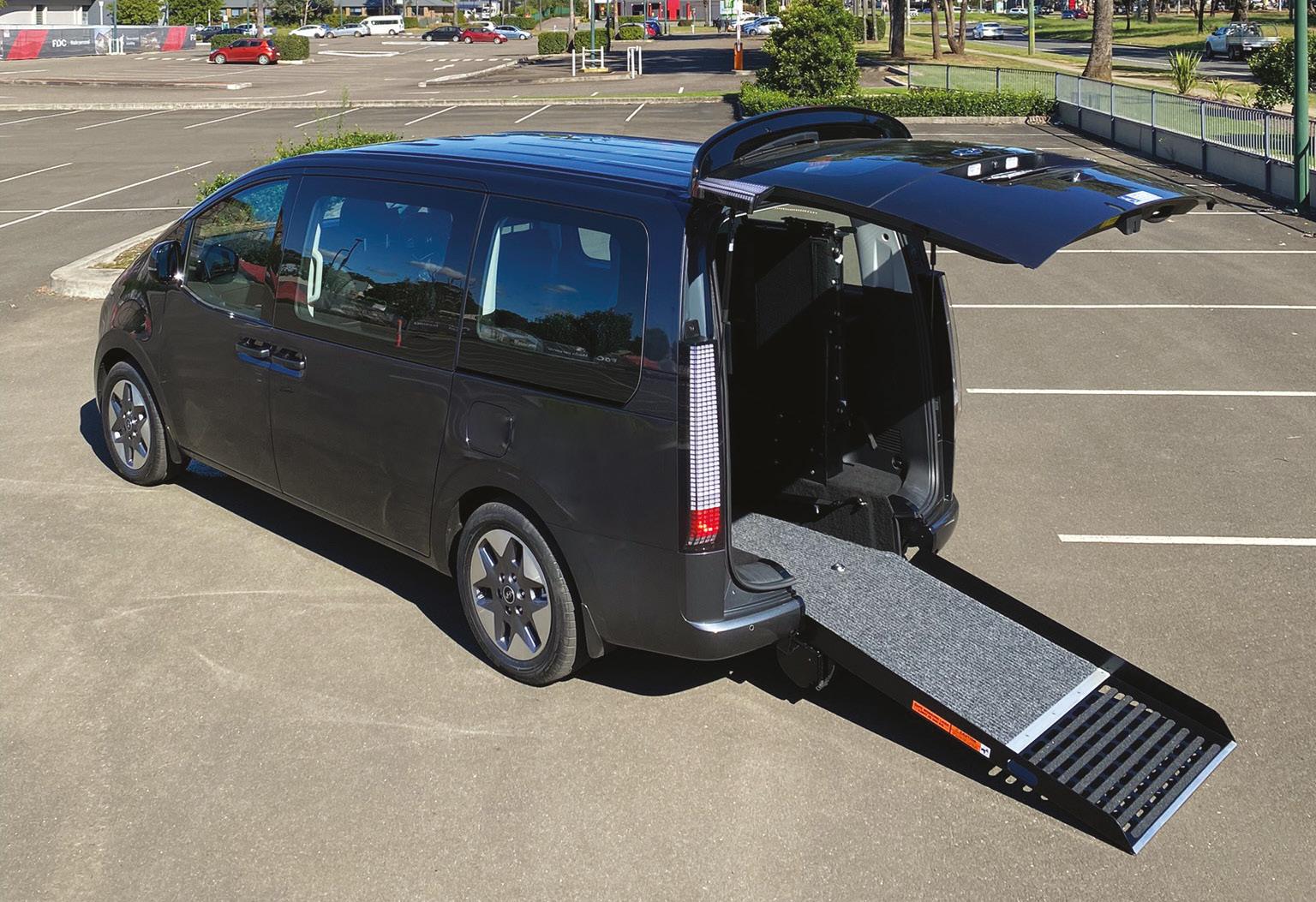
WE DELIVER FREEDOM YOU CHOOSE THE DESTINATION INTRODUCING OUR HYUNDAI STARIA CONVERSION! NEW FREE CALL 1800 672 437 OR VISIT OUR WEBSITE WWW.FREEDOMMOTORSAUSTRALIA.COM.AU
Link to... News April/May 2023 24
Health plan ignores intellectual disabilities
Despite a life expectancy gap of 30 years and emergency department admission increasing risk of death by four times, the draft National Health Literacy Framework does not address health care needs of people with intellectual disability.
Responding to Federal Government consultation on the new National Health Literacy Framework, Aruma chief executive Dr Martin Laverty said the draft plan overlooks intellectual disability.
“People with intellectual disability live shorter lives, face more illness, and encounter greater barriers in access to health care than people with no disability,” Laverty said.

“The Australian Institute of Health and Welfare (AIHW) 2020 study on
mortality patterns among people using disability support services found people with intellectual disability had a median age at death of only 50 years, compared to median age at death of 79 years for males and 85 years for females without disability."
L averty said revisions to the Health Literacy Framework should address:
1. Individual communication needs of people with intellectual disability.
2. Patient advocacy within hospital and primary care, and
3. Improved disability literacy of health care clinicians.
To put together it's submission on the government’s health literacy framework, Aruma sought views from its customers and families.
A ruma customer and human rights
advisor James McCoy shared his views on the gaps in our healthcare system, particularly for people with intellectual disabilities.
McCoy considers himself lucky to have found a good doctor who talks directly to him about his health.
W hile he believes our healthcare system has advanced since he was diagnosed with autism when he was 17, he remembers his parents found doctors ‘seemed clueless or apathetic’ about trying to diagnose him.
“Even now, I think it can be hard for people with a disability to talk to doctors. Health information needs to be accessible and there needs to be support to understand what information is genuine or fake,” he said. “People with a disability deserve the same quality of care as everyone else.”
NEWS linkonline.com.au 25
Travel lite with the Litestream Carbon
The Litestream Carbon is the newest addition to the Pride Mobility family of Travel Power chairs.
With carbon fibre technology, the Litestream Carbon
Power Wheelchair is a great travel companion.
In just a few quick steps, the Litestream Carbon folds down, making it a super lightweight effortless option to take when travelling in planes, trains and cars. It’s a convenient mobility solution with the ability to fold and go.
T he Litestream Carbon uses a super lightweight and strong carbon fibre frame and reliable lightweight lithiumion battery, with a lightweight mesh seat and carbon fibre foot board.
Weighing in at an amazing 16kg (without battery), the Litestream
Carbon provides a top speed of 6km with a maximum weight capacity of 136kg. The 24V 12Ah lithium-ion battery gives a range up to 15km.
“ We wanted to design a super lightweight travel power wheelchair to make travelling easy,” Pride Mobility Products Australia, managing director, Warren Tripp said.
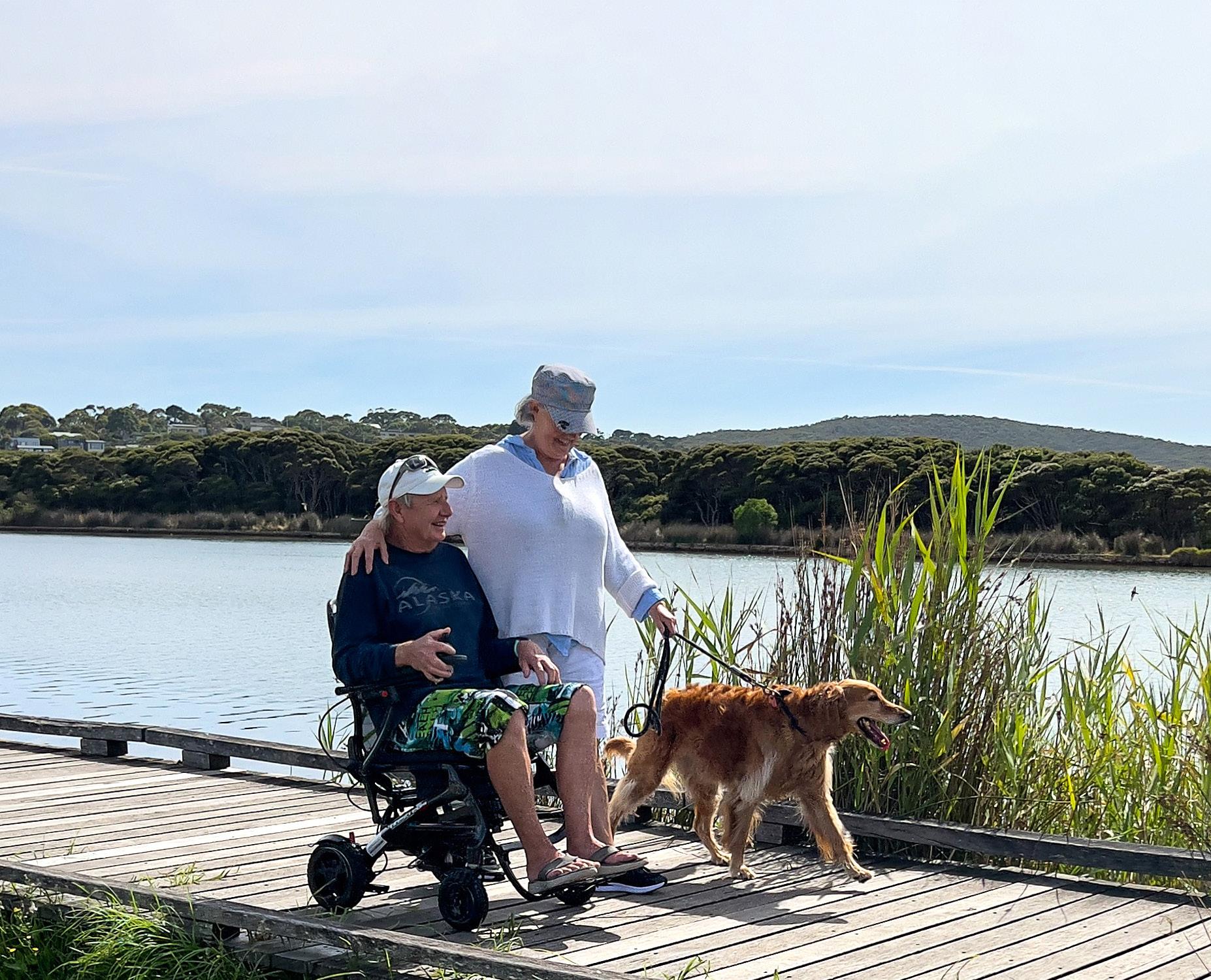
Pride Mobility is excited to showcase the Litestream Carbon along with a wide range of new, innovative and exciting products at the ATSA Independent Living Expo in May 2023.
To learn more about the latest product offerings from Pride Mobility/Quantum Rehab, be sure to visit their ATSA Independent Living
Expo stand in Melbourne (#132) and Perth (#190). Their helpful and experienced Pride/Quantum team will be happy to answer any questions you have.
To view the full range of Pride Mobility powerchairs along with the New Litestream carbon visit: www.pridemobility.com.au/powerchairs or view on the PQ365 app, which is available to download on the App Store or Google Play.
“We wanted to design a super lightweight travel power wheelchair to make travelling easy”
Link to... Mobility
26 April/May 2023
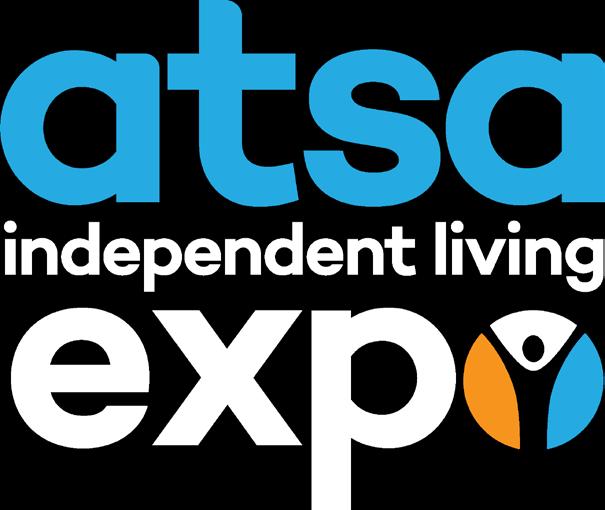
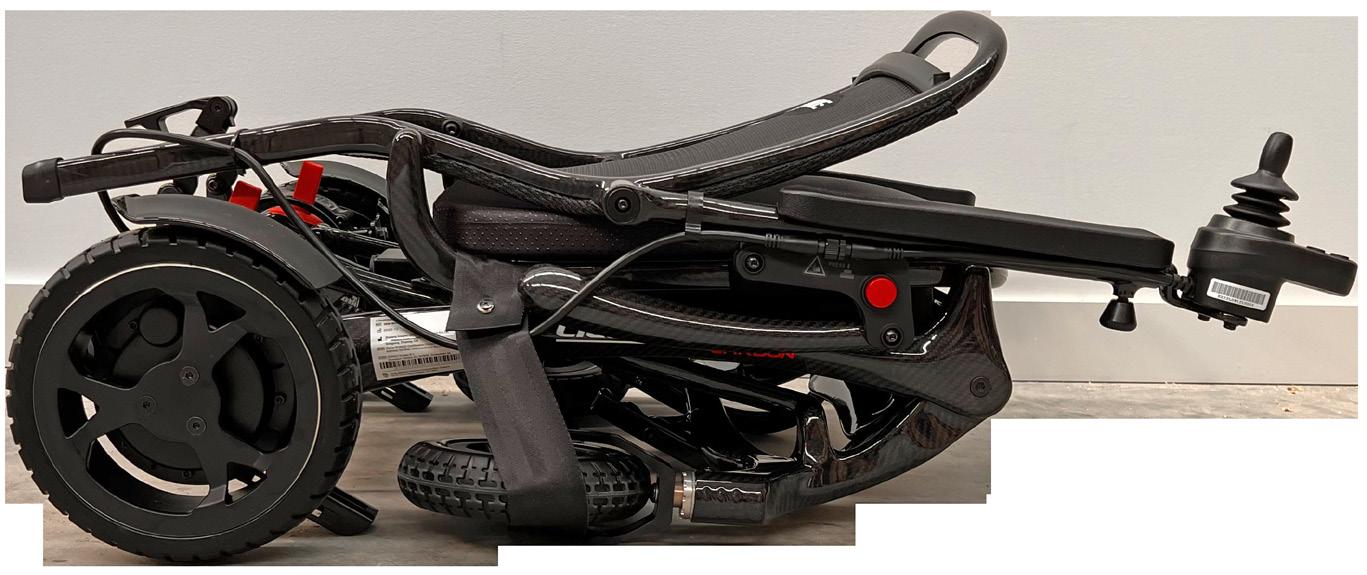
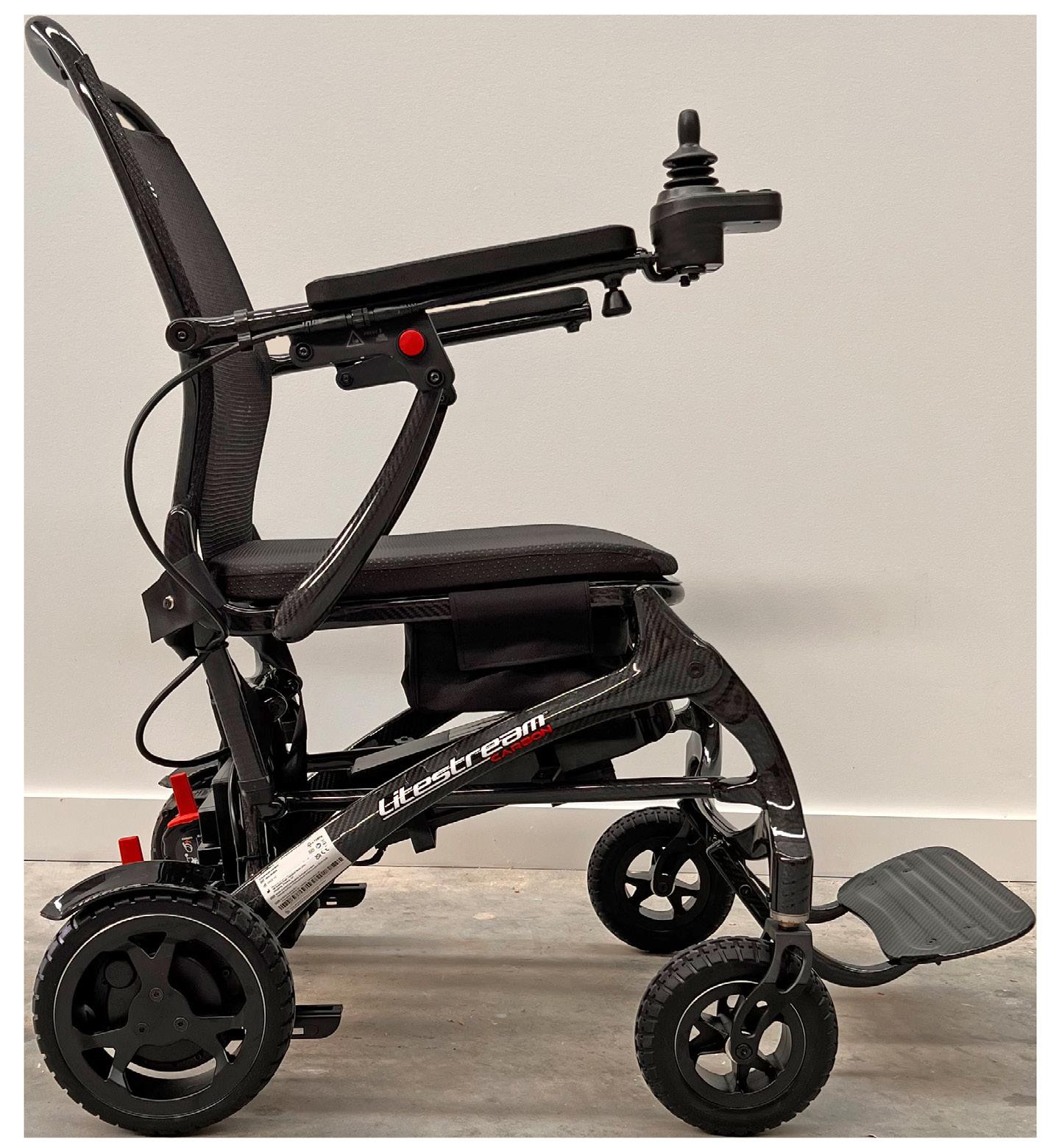

Join us at ATSA Independent Living Expos to view our latest product range. Melbourne 24 - 25 May BOOTH 132 Perth 31 May - 1 June BOOTH 190. Under Seat Storage 136kg Weight Capacity 15km Range per Charge <120cm Turning Radius
Folds Down for Convenient Storage During Transport Carbon Fibre Frame Lightweight 16kg (without battery)
24V 12Ah Lithium-ion battery Joystick Control
Carbon Fibre Footboard Optional Manual Setting
Easily
Reliable
Foldable,
Effortless, Lightweight and Foldable Travel Companion
Mobility and Autism, what are the considerations?
Autism spectrum disorder is a complex developmental condition of the brain that affects the way a person interacts with their environment. Some of the characteristics on the spectrum can include social communication, behavioural issues, emotional regulation, sensory processing and mobility.
Individuals with autism can have their ability to walk, run and move be greatly affected by the condition. In some cases, this can result in mobility issues that require the use of a wheelchair. Wheelchair prescription may be complicated by the other common characteristics of the disorder.
Some of the reasons clients with autism may need a wheelchair is due to low muscle tone, and problems coordinating the left and right sides of the body, impacting an individual’s ability to mobilise long distances. Some people with autism also have other disabilities that are physical or neurological, so they use wheelchairs.
Occasionally individuals with autism require a wheelchair if their sensory issues make it difficult or dangerous for them to walk out into busy areas. They might be afraid of crowds, so they need something to help keep them safe
while they explore their surroundings and learn how to cope with those feelings in a new way.
Some people with autism might also benefit from using a wheelchair when they travel because it makes it easier for them to get around in unfamiliar places without getting lost or becoming overwhelmed by sensory stimuli, they don't understand yet.
People with severe motor-planning deficits or catatonia might need wheelchairs because it’s easier for them to move a joystick on the arm of a power chair than it is to coordinate all the separate movements it takes to walk. And in the case of severe catatonia, they might need to have someone push them to get anywhere at all.
A wheelchair should conform to the person who relies on it for mobility and engagement in activities of daily living. For those wheelchair users who have a diagnosed or undiagnosed sensory processing disorder, the wheelchair can become a place of restriction and frustration. Thankfully, through advances in design and technology, it does not have to be this way.
O ften the end users experience the world around them through either sensory seeking movements (rhythmic rocking) or sensory avoiding postures (tucking and grounding). Every individual experiences different patterns of sensory behaviours, which can be easily triggered by the heightened or lack of stimuli going on around them. As such, the prescription process of the wheelchair must take a client centred and multidisciplinary approach to ensure the wheelchair and the supports it provides, as you do not want it adding to unwanted and aggravating stimuli for the individual.
T he consequences can often lead to damages to the wheelchair and
sustained injuries to the end-user. Features prescribed must marry to the individual, allowing for sensory exploration in safe manner that ensures durability of equipment and protects the person from negative forces imposed on the body in a ridged seating system, when all the person wants to do is move.
Seating Dynamics has designed and manufactured unique wheelchair components to solve serious issues. Dynamic hardware and their components allow coordinated movement to occur within the seat and/ or wheelchair frame in response to force from the client. Dynamic components absorb force which, in turn, assists the client back to a starting position. Dynamic seating is used in three main clinical scenarios. First, it is used to diffuse force, for example with clients who have increased muscle tone. Dynamic components absorb extensor forces that could otherwise lead to client injury, equipment breakage, decreased sitting tolerance, increased agitation, decreased function, further increases in extension and energy consumption. Secondly, it is used to allow movement. Components allow movement that provides vestibular input, increases alertness, and decreases agitation. Thirdly, dynamic seating can improve postural control and stability, as well as function. Dynamic hardware from Seating Dynamics is made to order to fit a variety of wheelchair models, making it the perfect retrofit option to add movement to an existing seating system.
Linds Rehabilitation Equipment will exhibit at the Melbourne Expo May 24. Visit our stand #388 to learn about these products and more. Join our clinical educator and occupational therapist, Lauren Hunter for her scheduled talk on:
“Power functions that create unique client-centered solutions”, on Thursday May 25 at 2pm in Room 2.

Link to... Mobility 28 April/May 2023

OT and Assistive Technology
function in everyday tasks, OTs make recommendations for, and then deliver, interventions that enhance and maintain a person’s capacity. They may provide advice about how to perform a task more easily or safely or prescribe home and environmental modifications, living supports, or aids and assistive technology that help everyday Australians live as engaged, valued, and contributing members of their communities.
If you think occupational therapists are only concerned with helping you to find, or return to a job, then think again.
OT is possibly the most poorly understood allied health profession. In occupational therapy, occupations refer to the everyday activities that people do as individuals, in families and with communities to occupy time and bring meaning and purpose to life. Occupations include things people need to and want to and are expected to do (World Federation of Occupational Therapists).
OTs support people to participate in literally any activity that is meaningful to them. Think playing the drums, reading, eating, socialising, showering, putting on makeup, intimate relationships, playing tennis, volunteering, going to a local café, playing at home with the kids, and yes, for some people, working.
T his broad scope of practice means occupational therapy is sometimes perceived in a narrow way by people who have had limited interaction with the profession.

For some people, they might have met an OT at their child’s school, where
the OT was helping a student with their handwriting and fine motor skills. Others might have run into an OT who was working in a hospital with their grandmother, supporting her to get back to her home after breaking her hip. They might have thought that OTs just install handrails in the shower and hand out those frames that sit over the toilet, based on grandma’s experience.
In other settings, an OT might be seen working with a person with paraplegia, exploring their assistive technology needs, from a manual wheelchair to a pressure relieving mattress, to a sports wheelchair. Or, working with a person with paralysis of their arms, by making a custom-made mascara applicator. OTs are also highly skilled in supporting people with depression or anxiety to stay connected to their important life roles, through the delivery of focused psychological strategies.
T he ways an OT works with a person are varied, but always with the same central intention, to support you to participate in occupations that are meaningful to you.
W ith their extensive training and skill in assessing the degree to which a person’s disability affects their
W hen it comes to assistive technology specifically, general manager of Occupational Therapy at Occupational Therapy Australia, Erin Garner said, “Assistive technology can be life changing and enable people of all abilities to participate in activities that are meaningful to them. At Occupational Therapy Australia, we are committed to ensuring that occupational therapists have the skills and knowledge that support people to access the most appropriate assistive technology for them to live their best lives. We advocate at every opportunity for funding systems to be supportive, rather than prohibitive, of consumers being able to access AT and supports in a timely manner”.
So, the next time you are thinking about how you can play those drums, prepare a meal for your friends, or drive to your favourite café, think of an occupational therapist.
Occupational Therapy Australia is the peak professional body representing the interests of OTs across Australia. We enable lifelong learning, promote the future of occupation therapy and foster evidence-based practice. We exist to support OTs throughout their career so they can support individuals and communities to achieve optimal health and wellbeing through participation in the occupations of life.
For more information on occupational therapy and to find an occupational therapist in your area, visit OTA’s website at: www.otaus.com.au
Link to... Assistive Technology April/May 2023 30
FIND OUT WHAT AN OT CAN DO FOR YOU AT ATSA
Occupational Therapy Australia (OTA) is the peak professional body representing the interests of occupational therapists across the country as a key component of the allied health sector.
OTA is a proud supporter of the 2023 ATSA Independent Living Expos and we’ll be exhibiting at all three events this year.
MARK YOUR CALENDAR!
COME ALONG TO MEET US AND LEARN:
• What occupational therapy is
• How to find an occupational therapist
• How OTA supports OTs and OT students
• How to become a member of OTA
• The #BenefitsOfBelonging to OTA
To find out more about OTA and occupational therapy scan the QR code or visit

www.otaus.com.au
FOLLOW US:




Making headlines in the assistive TECHNOLOGY AND ACCESSIBILITY SPACE
By Scott Hollier*
Read what is catching attention just over the horizon in addressing digital access issues.
At this year’s Consumer Electronics’ Show (CES) in Las Vegas, we saw some exciting trends. Among them was Samsung’s Flex Hybrid OLED, that uses a combination of screens that fold, roll and slide to turn a pocket-sized device into a sizable screen. For people with low vision, the convenience of being able to easily carry a large screen in a pocket will make a big difference to accessibility. Another big hurdle in the use of ICT for people with disability is the weight of the equipment so laptops
like the Alienware X14 takes a powerful gaming laptop and makes it relatively thin and light. This could potentially open the door for assistive technology (AT) that require a lot of graphical rendering to be truly portable, and not something with the weight of a desktop computer with a handle and batteries.
Perhaps our favourite device of all at CES year was from US manufacturer Kohler, and their collaboration with wellness brand Sprig, to devise a crossover between wellness and
technology. It is an uncomplicated system, with an attachable gadget for a showerhead that adds an aromatherapy of natural, calming scents. While not AT in itself, it has the potential to attach other body sprays such as after shave, deodorant or perfume to support people with mobility challenges in applying these scents without using bottles or sprays manually.
Outside of CES, we have kept a close eye on what accessibility features and tools are available in our everyday

Link to... Assistive Technology
32 April/May 2023
operating systems and it was great to see a significant update in Windows 11, as part of its 22H2 update rollout that occurred late last year. The update includes Voice Access which significantly enhances the ability for people to use speech-to-text to navigate through the computer and online. Building on the speech technology introduced in Windows 11 for dictation, Voice Access is an excellent benefit for people with a mobility impairment who may find it difficult to navigate through content using traditional methods. While surprising that something so important was quietly included as part of an update, the ongoing improvements to the accessibility features in major operating systems is welcome.

So where to from here?
Another part of the work we do is as a member of the World Wide Web Consortium (W3C) and Research Questions Task Force (RQTF). The RQTF is like an advanced scouting party that looks to the future of technology and its accessibility implications, where we keep a close eye on what’s coming and how to make it accessible. Recently the RQTF have been providing guidance on XR Accessibility User Requirements (XAUR) as there are a number of scenarios where people with disability can benefit from immersive technologies. For example: how people with cognitive disability could be supported with augmented devices in realworld scenarios. So, if walking down the street but confused by signage, a symbol set could be overlayed to make it easier to understand, such as a complicated menu with symbols such as a hamburger and fries being overlayed to help order food.
Other part of international work that is just starting to be developed is around verifiable credentials. This work is focusing on how to make sure that as all our ID goes digital that people with disability can effectively use it. With most major tech companies now including ways for digital IDs to be securely stored, it’s important that accessibility guidance is provided to both protect the user and ensure it is accessible.
Finally, there’s been a lot of discussion around the importance of ChatGPT and how user-friendly artificial intelligence (AI) can support our lives. As part of that conversation, we have been looking at what the implications may be for people with disability. While ChatGPT is not quite plain language, its conversational nature is proving useful in explaining important concepts to people with cognitive and intellectual disabilities. Especially when ChatGPT is requested to provide information to a particular reading level. Naturally issues with accuracy and complexity are creeping in, so it’s fair to say that we are just at the infancy of conversational AI. It will be interesting to watch the disability-related implications of this and how it gets built into our other AT product and devices, as time and technologies progress.
If you’d like to contact us to discuss anything raised in this article you can find us at www.accessibility.org.au. You can find a wealth of support in


enabling the accessibility features on your device of choice in our Resources sectional and if you’d like to learn more about digital access more broadly, our resources section also has a featured section on understanding accessibility.


The Centre for Accessibility Australia (CFA Australia) endeavours to address digital access issues in three areas: A free helpdesk to support people with disability, their families and carers; advocating in the digital access space; and paid work. This work includes auditing websites, apps and documents against the Web Content Accessibility Guidelines (WCAG) standard, and in turn supports the employment of nine staff, seven with a disability.
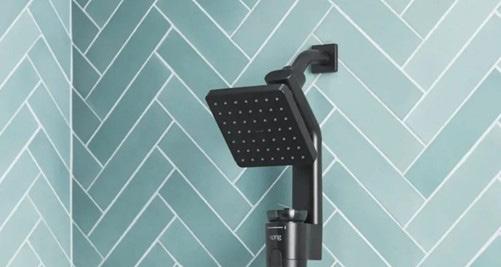
ASSISTIVE TECHNOLOGY
*Scott Hollier is CFA, co-founder and CEO and co-chair of the Research Questions Task Force.
Kohler Spring Shower System
A lienware
Cheeseburger and fries
Samsung Flex Hybrid
linkonline.com.au 33
ChatGPT
Questions to ask before buying ASSISTIVE TECHNOLOGY
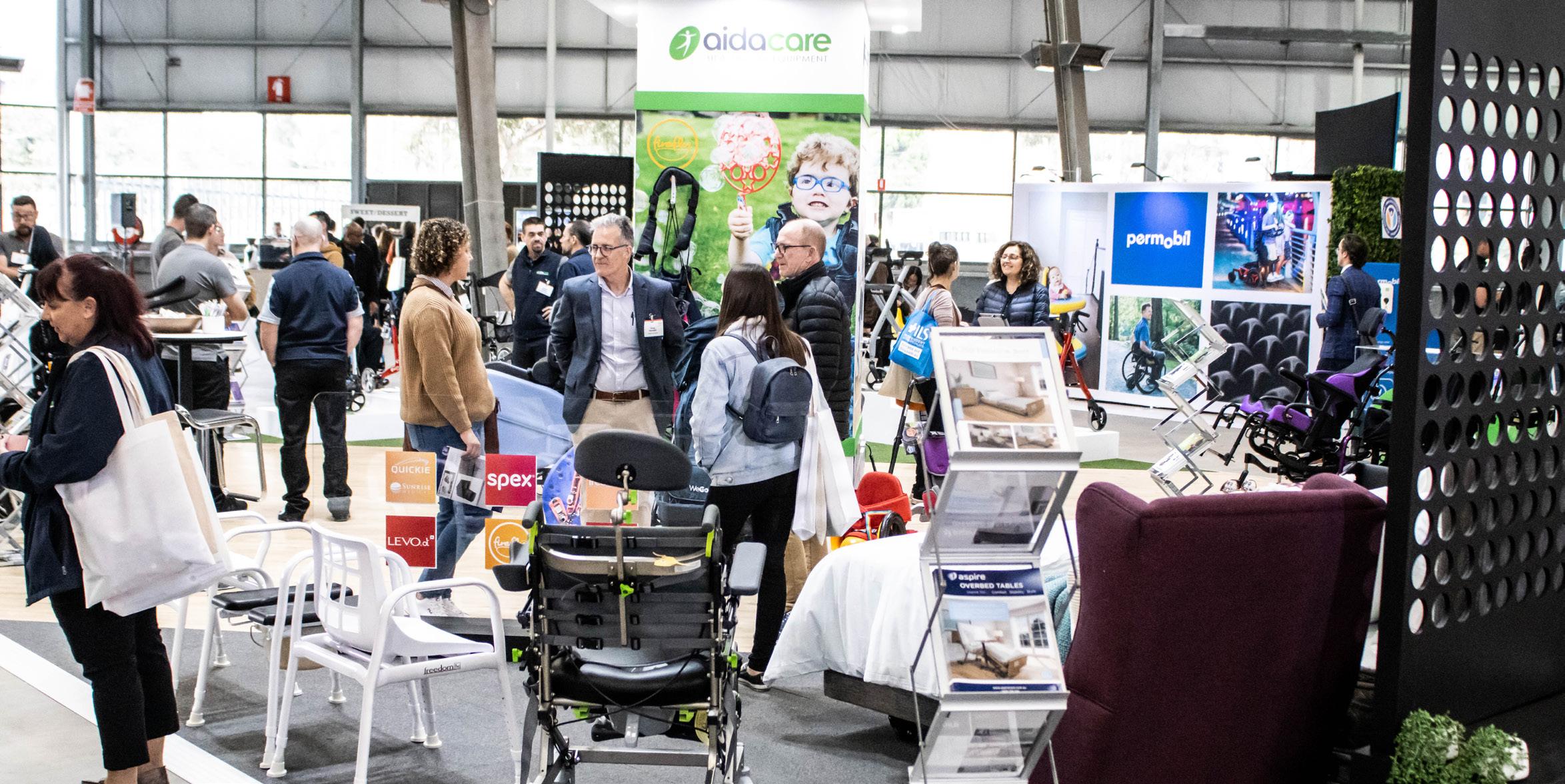
Shopping online has granted us a world of possibilities, including access to assistive technology (AT) devices. To make sure you get the best device for your personal needs or those of another user, Link asked ATSA executive officer, David Sinclair how to avoid any downsides from buying AT online.
You need to ask the right questions, and a lot of them
“It’s not as straightforward as ordering the latest coffee machine. Buying assistive technology means you’re buying a medical device. Medical devices need to be fully understood. You need to have the right information before you click the purchase button,” Sinclair said.
To make an informed decision you need to take the time to ask the right questions. That way you won’t jump on the wrong solution.
Even for simpler devices like a wheelie walker or a shower chair, there are a number of questions to ask and he said you need to consider:
• Will the walker fit in the car?
• Is the walker too heavy for the user or their carer to get into the boot of their car?
• What terrain will the walker be used on?
• Can you adjust it to the right height so the user can walk naturally?
• Does the user have the strength to use the walker’s brakes and locking devices?
• Can they operate the walkers various functions?
• Will the seat take the weight of the person?
• Are there any special considerations that pertain to my health circumstances in the selection of the device?
• Who do I go to post sale to assist me if I have questions?
A shower chair may also seem like an easy item to order online. But it’s more complex than you might think.
A shower chair will be in a wet area. Will it become a trip hazard if a person missteps, trying to get in and out of the shower? Does the chair take the person too far away from the taps or bring them too close to them, or could it block or impede access?
Asking the right questions is crucial to choosing a device that’s safe and isn’t going to put the user at risk.
Seeking expert advice
Imagine you are in a situation getting a loved one’s home ready so they can leave hospital. You have a shopping list
Link to... Assistive Technology
34 April/May 2023
of the AT they will need and the best intentions to organise it all as quickly as possible. Should you get it all online or get advice from an occupational therapist (OT)?
“If you’re replacing something a person already has, there’s less need for a clinical intervention. That’s unless that person’s health condition has altered in some way”, Sinclair said. “But if you’re looking at a more complex type of product, getting clinical advice is in the best interest of the user to make sure that all the boxes are ticked.”
If an OT has recommended a shower chair, it is critical that you follow their advice. If you elect to shop online, ensure you understand what has been recommended in respects to the features the chair needs to have. Don’t buy one online that has different features because it’s cheaper or can be delivered faster.
Tips for online shopping
How do you shop online for assistive technology with more confidence?
1. Know your needs: Have a clear understanding of what type of AT you need. Take the advice of an OT if you’re unsure.
2. Research the product and suppliers: Look for reviews and specifications of the product you are interested in. Make sure the product meets your needs. Choose a supplier with a good reputation for quality products and strong customer service.
3. Check the return policy: Read the returns policy carefully before making a purchase and understand any restrictions.
4. Compare prices, shipping costs and warranties: Keep in mind that the
lowest price may not always be the best option if it means sacrificing quality or compatibility.
5. Ask for recommendations: If you know someone who uses AT ask for their recommendations and experiences with different products. This can give you valuable insight and help you make a betterinformed decision. But follow the golden rule for selecting AT, your personal circumstances are unique to you, so always focus on your needs and seek professional advice before making the final choice.
6. Remember that AT is a medical device, and if not set up correctly, it can cause injury or worse. That’s why it’s important to choose a delivery option that includes set-up services rather than opting for a flat-pack delivery. Although this delivery option may cost a little more, it will ensure that the device is set up properly so there’s less risk of something going wrong. Also, if the company identifies that you have made the wrong selection returning the item will be simpler.
The safest path when buying AT online or in-store
Shopping for AT appears easier than ever because of the convenience of online stores. But the challenge when ordering online is making sure a device is suitable for your individual needs or those of another users.
The safest course, whether you are buying online or offline, is to talk to an Allied Health Professional first: “It could make all the difference when investing in this type of medical device because they will help ensure that everyone gets exactly what they need,” Sinclair said.
Don’t miss the ATSA EXPO on May 24-25
Held in Melbourne every two years, the 2023 event is going to be the biggest yet.
W ith an additional hall there are more than 160 exhibitors with plenty of companies exhibiting for the first time, extra seminars and a track to test drive modified vehicles.
T he ATSA Independent Living Expo is the one place to be where you can see solutions to your daily living needs.
If you are looking for the latest and most innovative AT products, attending an ATSA exhibition is an excellent way to see the various products available in one place.
V isitors to the expo can also touch and try out different products and meet with suppliers.
A ll the information you need about the disability sector is under one roof and its free to attend.
Join us at the next ATSA Independent Living Expo May 24-25, 2023 at the Melbourne Showgrounds and May 31 –June 1, 2023 at the Claremont Showground, Perth.
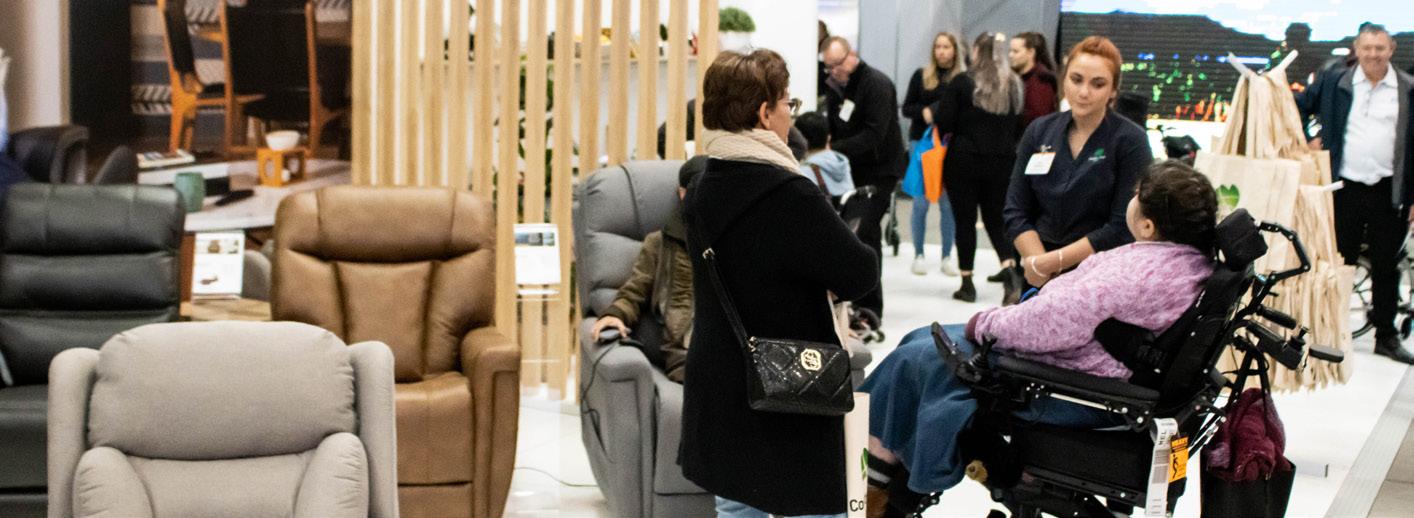
For all the details visit: www. atsaindependentlivingexpo.com.au
Check out all the exhibitors and seminars by scanning QR code below
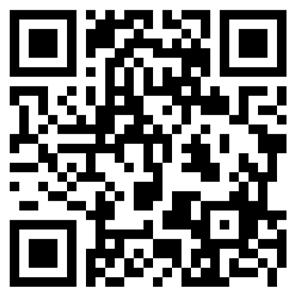
ASSISTIVE TECHNOLOGY
linkonline.com.au 35
See you at the ATSA Independent Living Expo!
• Rifton new style Trikes
• Rifton HTS with upgraded features
• T homashilfen Commander
• T homashilfen Defender
• T homashilfen Hercules Prime
• SAVI beds
• C areflex SmartSeat Pro II
• A kces Med Mamalu
• A kces Med Kukini
• StabiloBed sleep system
• Schuchmann Madita Fun with updated features
• Motion Composites new range of lightweight and ergonomic pushrims
• O rmesa Trollino
• O rmesa Grillo Chair
• O rmesa Grillo Adaptive Seating
• O rmesa Adjustable Trolli
• O rmesa Trikes (folding)
2023 is well underway and we are looking forward to the ATSA independent living expos, opening in Melbourne on May 24. Each year brings more reasons to continue to support this esteemed industry event and it is certainly looking to live up to its reputation once again.
Uniquely positioned to bring in the biggest range of specialised assistive technology (AT) from around the world to Australian and New Zealand dealers, APEX Mobility is set to offer a multitude of experiences and learning at ATSA.
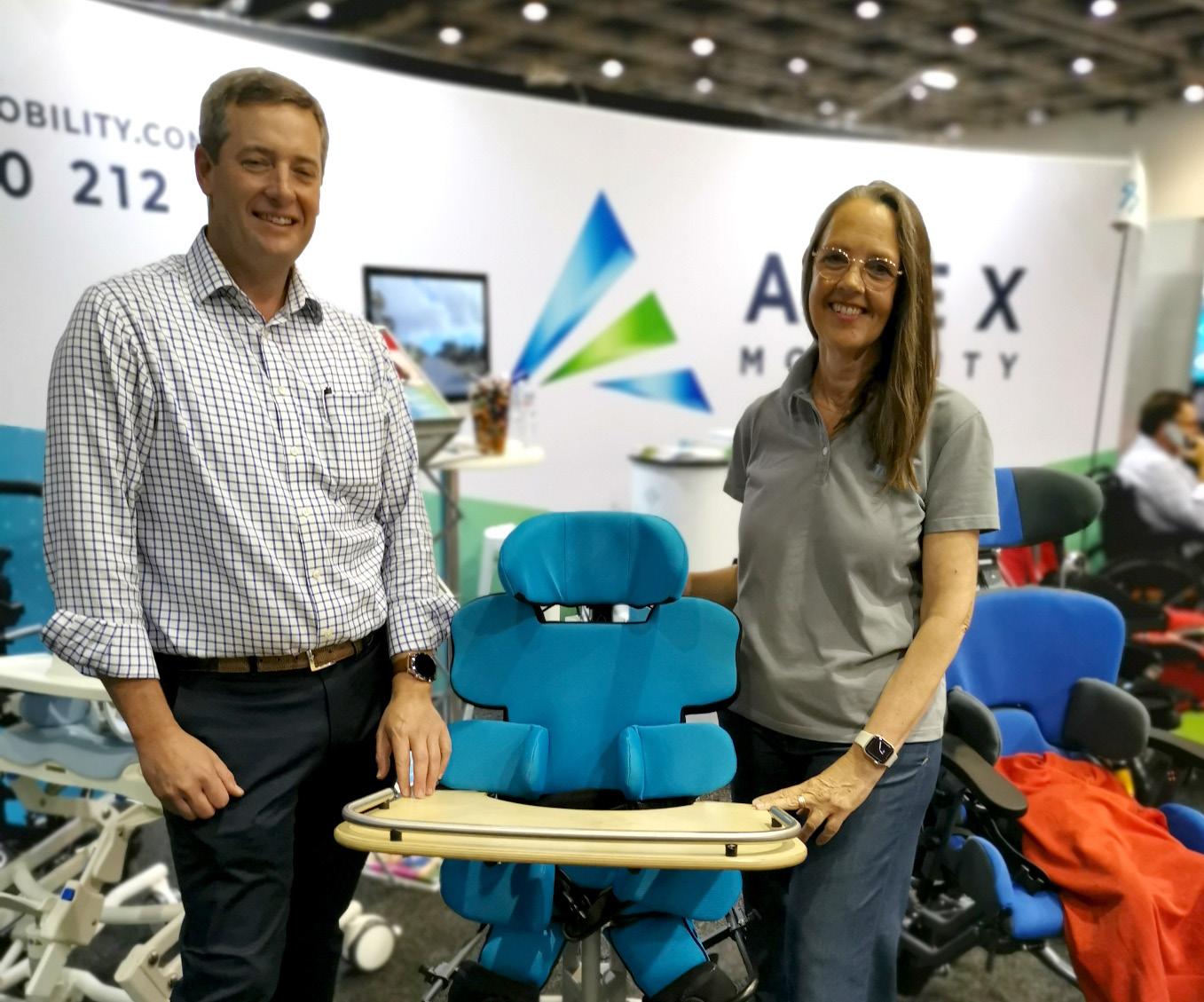
W ith international travel now open and in full swing, we are not only looking forward to presenting many new products and features from suppliers, but also hosting eight international guests representing their brands. Attending ATSA in 2023 will provide attendees with the ideal opportunity to hear about what is happening in the industry both onshore and abroad.
AT users, families, friends and therapists will be able to hear directly from our team and an impressive international line up including:
Christie Hamstra - Motion Composites & NXT, Lori Potts - Rifton, Leonardo Sulsente - Klaxon, Andrea Espei
- Schuchmann, Martino Avellis
- Ormesa, Maurizio Galasso - Anatomic SITT, Gemma Coleson - Specialised Orthotic Services and Mikko Pirkola
- Timoteos.
Many of these international presenters have had abstracts accepted and will be presenting clinical education and training workshops. Along with this, attendees can look forward to exploring and becoming familiar with new products.
In addition to the soon to be released Klaxon Twist, which offers so much versatility of use from a power add-on device, the following products will be presented:
In addition to our presence at ATSA, we are looking forward to hosting the APEX Mobility annual dealer conference the week prior, on May 19 in Sydney. This means our team and dealers will be well prepared to ensure they can offer help and support at the ATSA exhibition for all AT on show or due for release soon.
Being a part of the expo and having the opportunity to engage with and support attendees is a privilege. Be it allied health professional, product manufacturer or specialists, it aligns with the fundamental reason that guides each of our roles and our core values in carrying out these responsibilities for the healthcare and disability industry. We are looking forward to welcoming you and providing support on the day to help make this a very worthwhile experience.
APEX Mobility will be at Stand #12 at the ATSA Expo Melbourne, May 24-25.
If you have an questions leading up to the events, our team at APEX Mobility would love to hear from you. Reach out to us on:1300 212 192 or email: sales@apexmobility.com.au
Andrea Espei with Apex Mobility director, Michael Cage
Link to... ATSA 36 April/May 2023
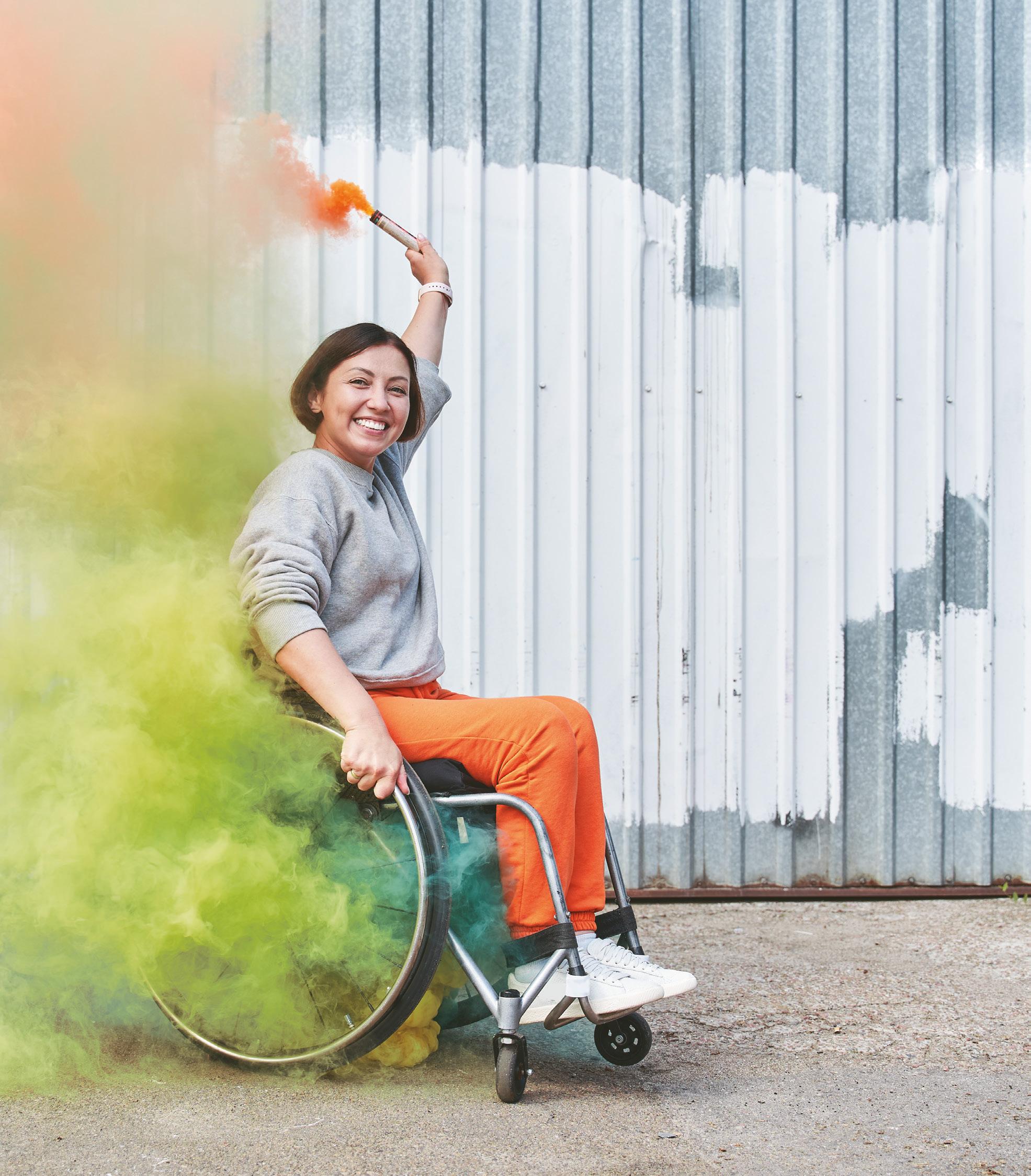

OPENING HOURS Wednesday 24 May 8:30am – 4:30pm Thursday 25 May 8:30am – 3:00pm MELBOURNE 24-25 MAY 2023 MELBOURNE SHOWGROUNDS Epsom Road, Ascot Vale YOUR EDUCATION GUIDE Registration is required for these free to attend sessions events@atsa.org.au www.atsaindependentlivingexpo.com.au Organised by Media Partners
Melbourne Seminar Program
8.159.00am 45 mins
WEDNESDAY 24 MAY
ROOM 1
BREAKFAST SESSION Hosted by Occupational Therapy Australia
9.15am 45 mins
NDIS SESSION Speaker TBC
ROOM 2
Wheelchair and seating assessment and prescription tips for working with bariatric clients
Kate Pain & Romi Russek, Clinical Educator/AT Consultant - GTK
10.30am 30 mins
Parenting from a wheelchair
Curtis Palmer and Rika Millen, Assistive Technology ConsultantGTK and Clinical Educator – Permobil
ROOM 3 ROOM 4
Pressure mapping is not only used to compare cushions
Dr Barend ter Haar, Director, BES Healthcare Ltd
Deep dive into alternating air mattresses
Leonie Brockman (Vic, SA/Tas) and Tish Huijbregts (Qld), Training and Development Coordinators –Aidacare
11.30am 30 mins
Freedom Through Mobility
Amin Akbarian, CEO Mobility Engineering
1.00pm 45 mins
Yoga – a journey of reconnection with self and community, an embodying practice for all abilities
Lisa Bidgood, Occupational Therapist
Paediatric Panel Changes with Age – Giving You the Justification for Custom Manual Wheelchairs for the Geriatric Client
Christie Hamstra, Clinical Education Specialist, Motion Composites
Alternative Access to Computers and Devices
Caitlin Mah, Occupational Therapist – AT Consultant
Innovations in seating: the balance of technology and simplicity
Luke Meighan, Product Manager, Mobility and Seating: Invacare AsiaPacific
Functional Electrical Stimulation in practice
Rebecca Grenfell, Senior Physiotherapist, NeuroRehab Allied Health Network
TD pilot: eye control for the iPad
Charlene Cullen, Assistive Technology Specialist - Link Assistive
Manual wheelchairs: how we apply the evidence to practice
Rachel Fabiniak, Permobil Director of Clinical Services - AsiaPacific
How adaptive clothing can benefit people with short and long term situations
Penny Weber, The Shapes United, CEO
Innovation – a look at how the latest innovations benefit power wheelchair users
Nabil Kodsi, National Clinical Educator, Pride Mobility
24-25 May 2023
April/May 2023 38
2.00pm 30 mins
WEDNESDAY 24 MAY
THURSDAY 25 MAY
Air Travel - it’s more than just a ticket and passport!
Christine Buttigieg, Mobility and Seating Specialist, Invacare
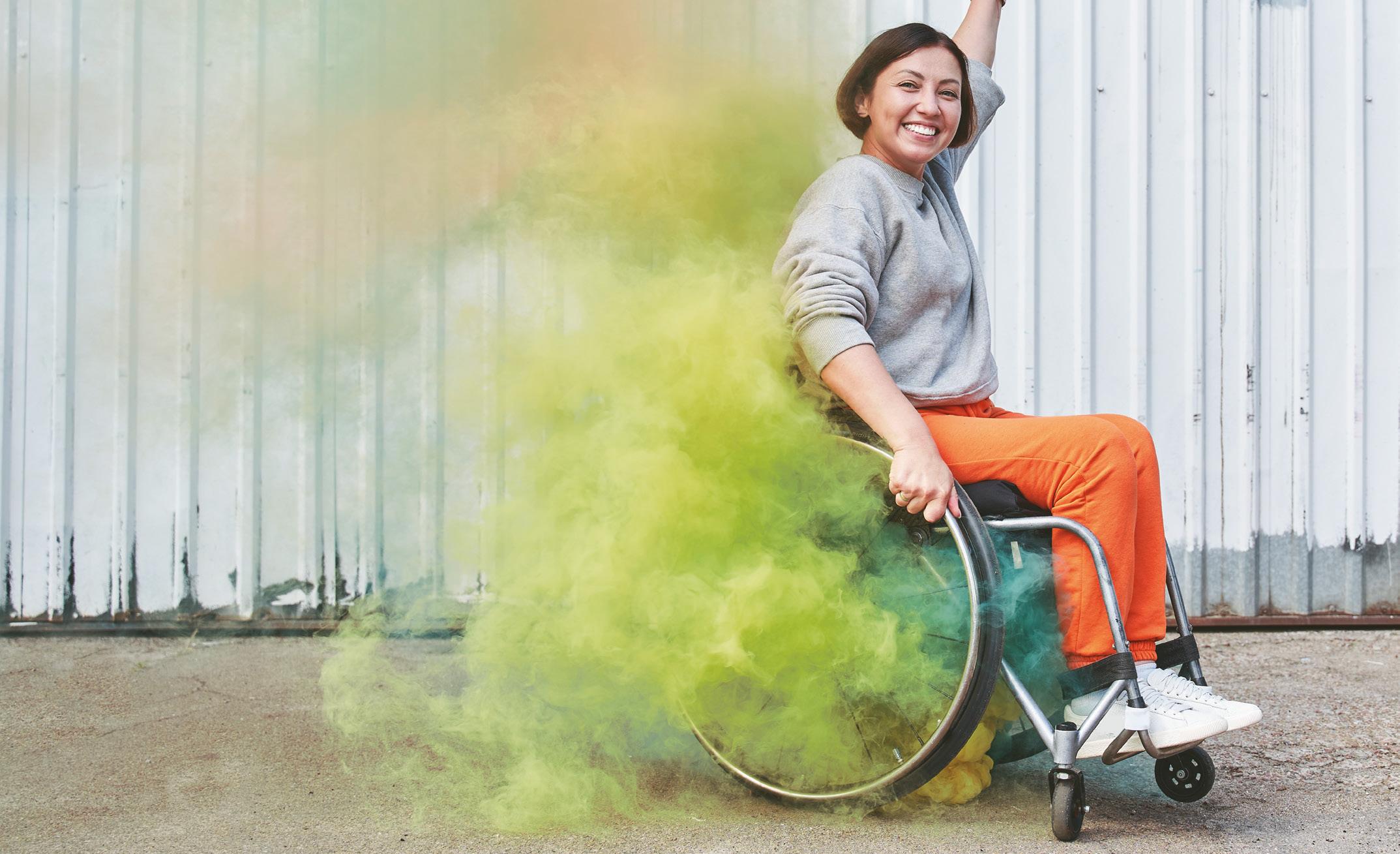
3.15pm 45 mins
How the NDIS can support your desire to travel Panel

Jamie Cockle, Clinical Educator Medifab
Power Assist devices –providing more than physical relief for manual wheelchair users
Frame Running - a new Para Athletics event for people with high support needs in balance and mobility
How are the surfaces and shape important to prevent pressure sores?
Martino Avellis, PT - Ormesa s.r.l.
The importance of choice and control Speaker tba
Lance Starke,
Tilly Brook, Clinical Education SpecialistPermobil Asia-Pacific
Addressing the effects of tone, spasticity, and other neurologic symptoms on the seated posture
Power functions that create unique client centered solutions
Lauren Hunter, Director of Clinical Services, Linds Rehabilitation Equipment
Lois Brown, ILS National Clinical Education Manager
Sarah Reedman, Research Fellow, The University of Queensland
Lori Potts, Physical Therapist, Rifton Product and Training Specialist
MAT 101 – Next Steps
Are adjustable wheelchair cushions better?
David Fagan, Director Motion Specialties & Paragon Mobility
- So You’ve Taken a MAT 101 Course – How do you implement those skills into your wheelchair prescription process?
Amy Bjornson, Clinical Director, Sunrise Medical
Why does equipment for children need to be so different from that for adults?
Ages and stagespositioning through the day in the real world
Prithy Sivaraman, PhysiotherapistClinical Hub, Sunrise Medical
Dr Barend ter Haar, Director, BES Healthcare Ltd
Melbourne Showgrounds, Epsom Road, Ascot Vale free to attend www.atsaindependentlivingexpo.com.au
ROOM 1 ROOM 2 ROOM 3 ROOM 4 Melbourne Showgrounds, Epsom Road, Ascot Vale AUSTRALIA’S FOREMOST ASSISTIVE TECHNOLOGY EVENT CANBERRA 7-8 NOVEMBER 2023 EXHIBITION PARK (EPIC) Northbourne Ave, Mitchell REGISTER NOW Visit website to register or phone 1300 789 845 www.atsaindependentlivingexpo.com.au FREE Entry, Seminar Program & Coffee Voucher OPENING HOURS Tuesday 7 Nov, 8:30am – 4:30pm Wednesday 8 Nov, 8:30am –
Organised by Media Partners 6702 ATSA Expo CANBERRA 2023 A5 Link.indd 1 6/3/23 11:58 am
3:00pm
ROOM 1 ROOM 2 ROOM 3 ROOM 4 1.00pm 30 mins Adaptive Clothing Fashion Show Why SOS wristwatches differ from smartwatches by Apple,
and others
Samsung
Co-Owner of Guardian Safety Pendants
challenge
Up-to-date physical activity guidelines: rising to the
2.00pm 30 mins Diversifying standing opportunities for children:
are
options
clinically reason
What
the
and how do we
and provide justification for funding them?
linkonline.com.au 39
Melbourne Seminar Program 24-25 May 2023
THURSDAY 25 MAY
8.30am10.00am 90 mins
BREAKFAST SESSION
Mat evaluation 101 for wheelchair skills training – tips, tricks and advice from what I have learned along the way....
Amy Bjornson, Clinical Director - Sunrise Medical
9.15am 45 mins
Environment, environment, environment –specialised intervention in children and adolescents with unilateral Cerebral Palsy (uCP)
Andrea Espei, head of training at Schuchmann Reha, Germany
10.15am 30 mins
TGA
Toileting and special needs: where to start?
Lori Potts, Physical Therapist, Rifton Product and Training Specialist
Stand up for independence Maryann M. Girardi, Clinical Education Specialist, Altimate Medical, Inc.
Postural Care: the rise of therapeutic positioning in the lying posture around the world
Anna Goldsmith, Director, Simple Stuff Works Associates Ltd and Joana Santiago, Clinical Educator, Medifab
Assistive technology (AT) in Australia: current opportunities and challenges for the AT sector. Associate Professor Libby Callaway, President, Australian Rehabilitation and Assistive Technology Association (ARATA)
11.00am 45 mins
Improving AT outcomes by strengthening the collaboration of the AT supplier and therapist
Kim Vien, Senior Occupational Therapist (Royal Melbourne Hospital, Wheelchair and Seating Clinic as part of the Young Adults Transition Service)
& Lois Brown, National Clinical Education Manager for ILS
Need not niche - power wheelchair assessment to provide freedom & function
Scott Staunton, Rehabilitation Engineer / Client Sales Manager: Magic Mobility
When manual is no longer enough – power add on considerations
Tracee-lee Maginnity, Clinical Services Specialist - Permobil APAC
The benefits of electric assisted trikes for people living with disability, Richard Herklots, Owner-operator, everyBody eBikes
Employment panel
Register at www.atsaindependentlivingexpo.com.au 4
April/May 2023 40
ROOM 1 ROOM 2 ROOM 3 ROOM 4
1.00pm 30 mins
Adaptive Clothing Fashion Show
THURSDAY 25 MAY
Why SOS wristwatches differ from smartwatches by Apple, Samsung and others
Lance Starke, Co-Owner of Guardian Safety Pendants
2.00pm 30 mins
Diversifying standing opportunities for children: What are the options and how do we clinically reason and provide justification for funding them?
Jamie Cockle, Clinical Educator Medifab
Power functions that create unique client centered solutions
Lauren Hunter, Director of Clinical Services, Linds Rehabilitation Equipment
Up-to-date physical activity guidelines: rising to the challenge
Lori Potts, Physical Therapist, Rifton Product and Training Specialist
Are adjustable wheelchair cushions better?
David Fagan, Director Motion Specialties & Paragon Mobility
The importance of choice and control
Speaker tba
Ages and stagespositioning through the day in the real world
Prithy Sivaraman, PhysiotherapistClinical Hub, Sunrise Medical
Don’t miss ATSA EXPO Melbourne
The Melbourne ATSA Expo has added a new hall and become the largest Assistive Technology event ever held in Australia. Among the new exhibitors are Posture Balance, Cuddly Buddy, Placeable Solutions, HomeLife Technology and eBikes.
Australian company Posture Balance is launching a mobile dining chair at the expo which director Mark Cohen said is unique to the market. Slide N’ Dine features dual controls so the user or carer can easily move the chair into a dining position, that reduces carers getting injured. “The most important trend he sees emerging is coming from a carer perspective, “for products that look nice and suit the home décor, designed for comfort and good pressure distribution”.
If it’s pillows you can cuddle for years to come, the aptly named Cuddly Buddy has tube-style pillows for adults
and children with disability or needing rehabilitation. “Children with autism like the soft velour covers which are suitable for those with sensory issues, director Richie Simon said. “We have collaborated with artists including Indigenous and Australian artists for our designs.”
“There is a definite push to make homes more accessible and there is a strong demand for products like ramps and bathroom solutions,” said Priscilla White, from another new exhibitor, Placeable Solutions. “We are showing our new POD-D flat pack - a bathroom ensuite for people with disability that also suits rural and remote areas where an external facility is not possible.”
HomeLife Technology will introduce Hug by Laugh a sensory product, developed by Cardiff University, with a beating heart within a soft
washable body that plays music. Director, Paul Colley, said there has been an explosion in the adoption of its Connected Photo Frame and the software solution behind it is one of the fastest growing companies in Europe. “We are also seeing a growing demand for simple products, that do one thing, but do it well without too many features or functions that overwhelm and that enhance life, independence and personal wellbeing, not complicate it.”
Brisbane-based Everybody eBikes will run a seminar presentation at the event. eBikes co-founder Andrea Herklots said there is a demand for equipment with a low level of power such as electric tricycles that make it easier for people with low strength to initiate movement. “We are launching an adaptable tricycle with a wheelchair attached to the front section of the bike that can be disconnected then used as a manual wheelchair.”
Melbourne Showgrounds, Epsom Road, Ascot Vale AUSTRALIA’S FOREMOST ASSISTIVE TECHNOLOGY EVENT CANBERRA 7-8 NOVEMBER 2023 EXHIBITION PARK (EPIC) Northbourne Ave, Mitchell REGISTER NOW Visit website to register or phone 1300 789 845 www.atsaindependentlivingexpo.com.au FREE Entry, Seminar Program & Coffee Voucher OPENING HOURS Tuesday 7 Nov, 8:30am – 4:30pm Wednesday 8 Nov, 8:30am – 3:00pm Organised by Media Partners 6702 ATSA Expo CANBERRA 2023 A5 Link.indd 1 6/3/23 11:58 am
ROOM 1 ROOM 2 ROOM 3 ROOM 4
linkonline.com.au 41
Link asked new exhibitors to Melbourne for their views on emerging trends and the latest innovations.
Rehab Technology Distribution debuts at the Melbourne ATSA Expo
With new products and informative seminar sessions
support needs. Reedman will introduce the discipline of Frame Running to attendees, and touch on:
• Basic properties of the running frame
• W ho can participate
• How to get involved
• Research on the benefits of Frame Running, including research conducted by the University of Queensland.
Stop by on Wednesday May 24 at 2pm in Room 3.
RTD national educator, Rob Norman will host a paediatric panel on Wednesday May 24 at 1pm in Room 1. He will bring together a wealth of knowledge from across the industry and take questions from attendees during the discussion.
Visit Rehab Technology Distribution on Stand #200 and we can walk you through our exciting new additions to our product range, including new strollers and walkers from Europe. We will also have our new Therapy kit on display to discuss how we can partner with you to help your clients.
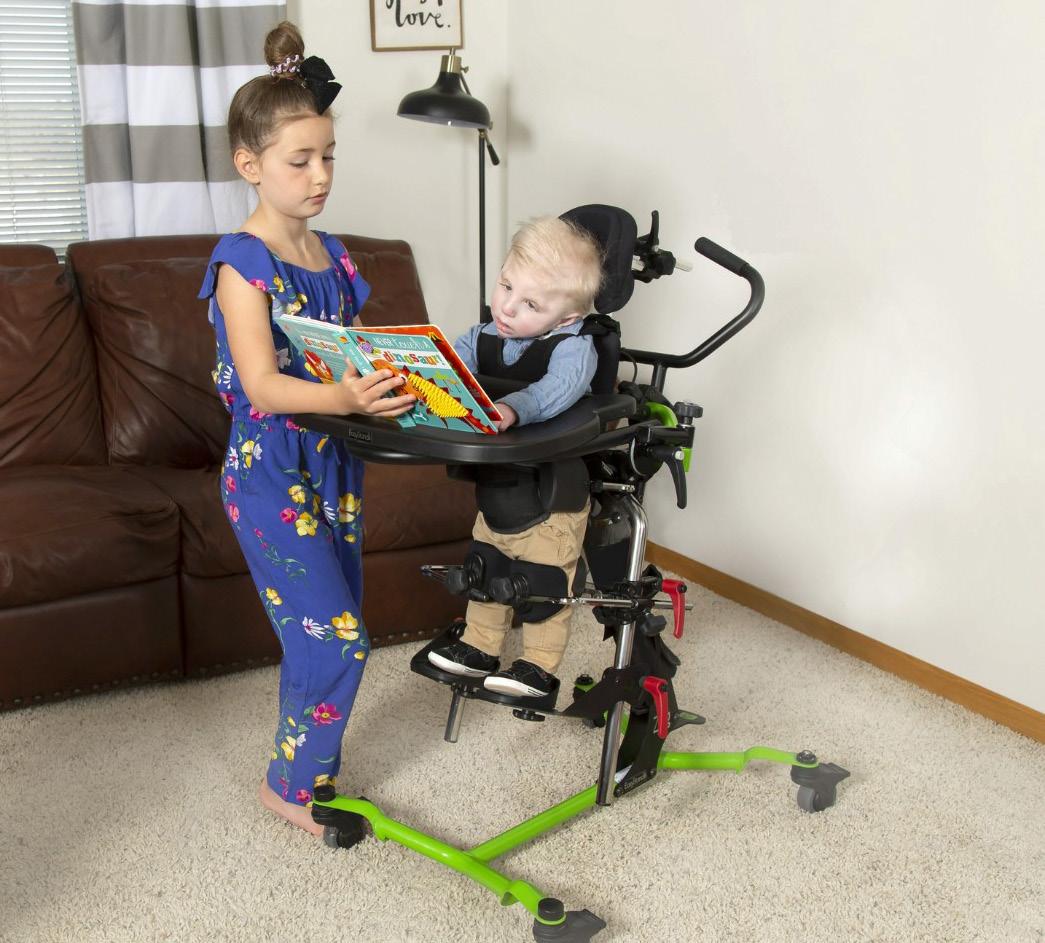
Please visit our website www.rtdaus.com.au
Rehab Technology Distribution (RTD) importers of many of the brands you know and love, such as Easystand, Special Tomato, Hoggi, Meywalk and Connie Hansen Frame Runners will present several informative sessions at this year’s ATSA Melbourne expo.
For the first time in Australia, Dr Maryann Girardi, clinical education specialist for Easystand will present a seminar session ‘Stand up for Independence’. Girardi has over 30 years’ experience working with adults and paediatric complex neurological conditions. Her session will address
how participating in supported standing can facilitate a person’s function and quality of life, and she will outline how standing can promote independence, improved quality of life and overall health. Join Maryann at 9:15am on Thursday May 25 in Room 3.
Frame Running (also known as Race Running) will feature for the first time in the ATSA seminar program. RTD have partnered with University of Queensland research fellow, Dr Sarah Reedman, who will present new Australian research on the benefits of Frame Running for people with high
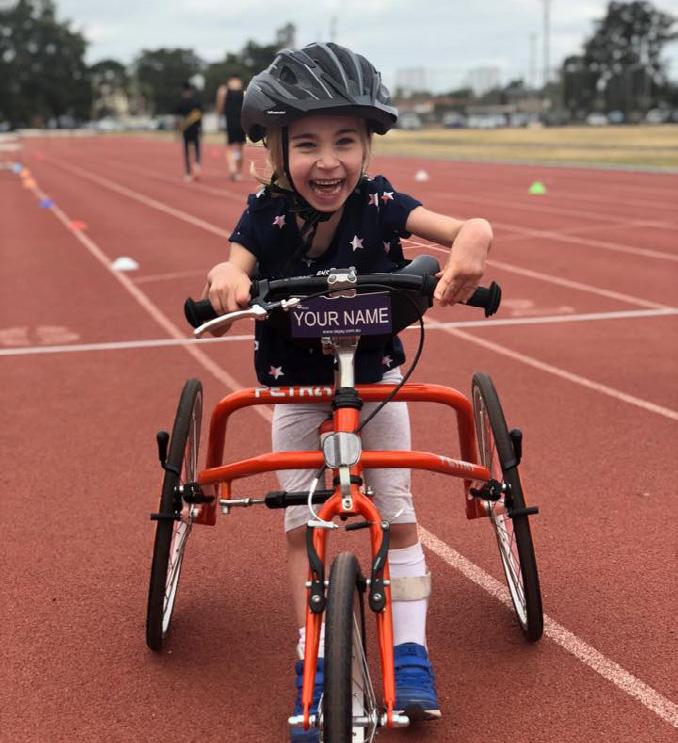
Link to... ATSA
42 April/May 2023

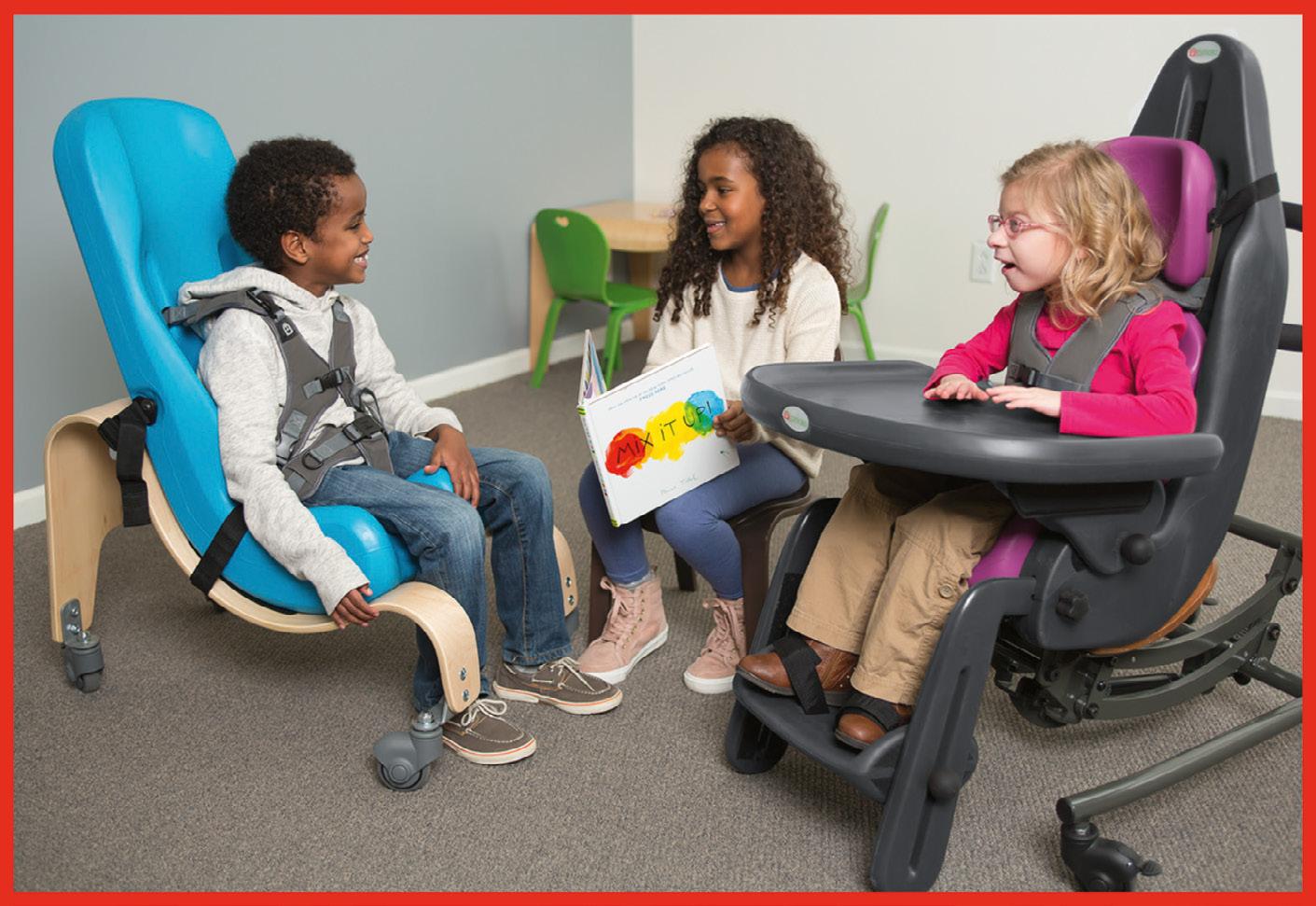
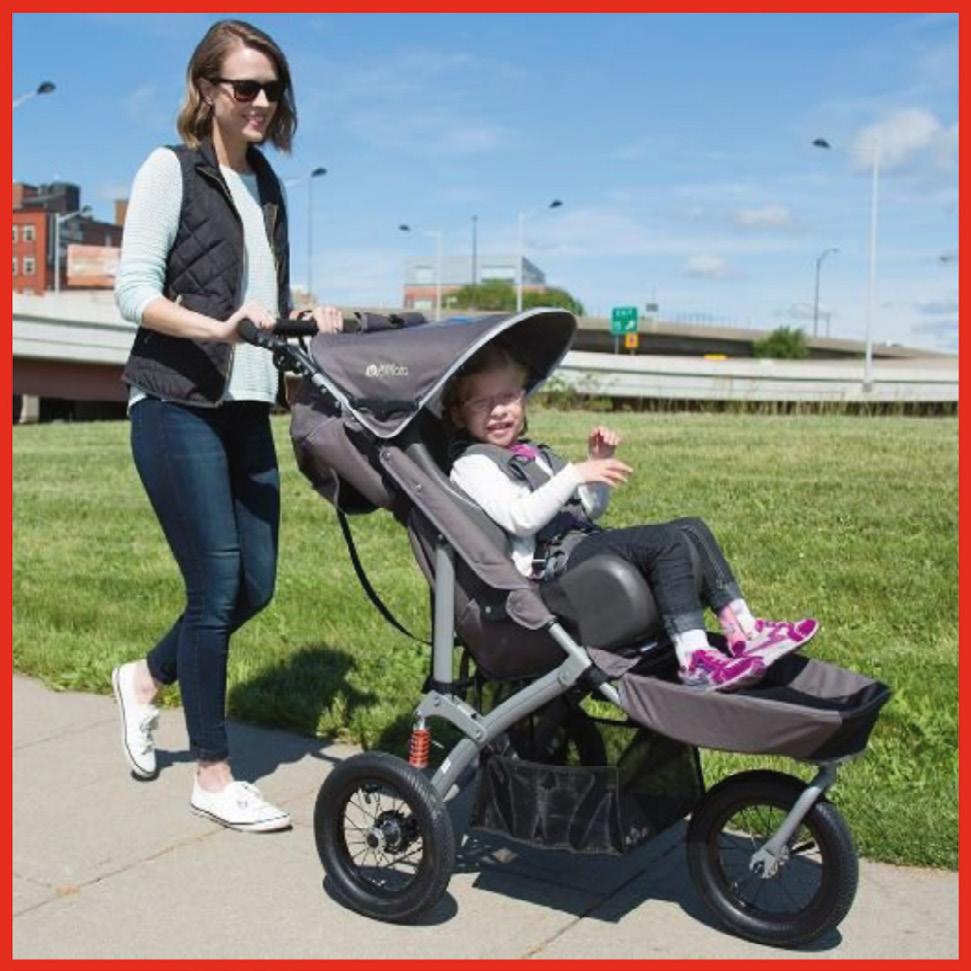
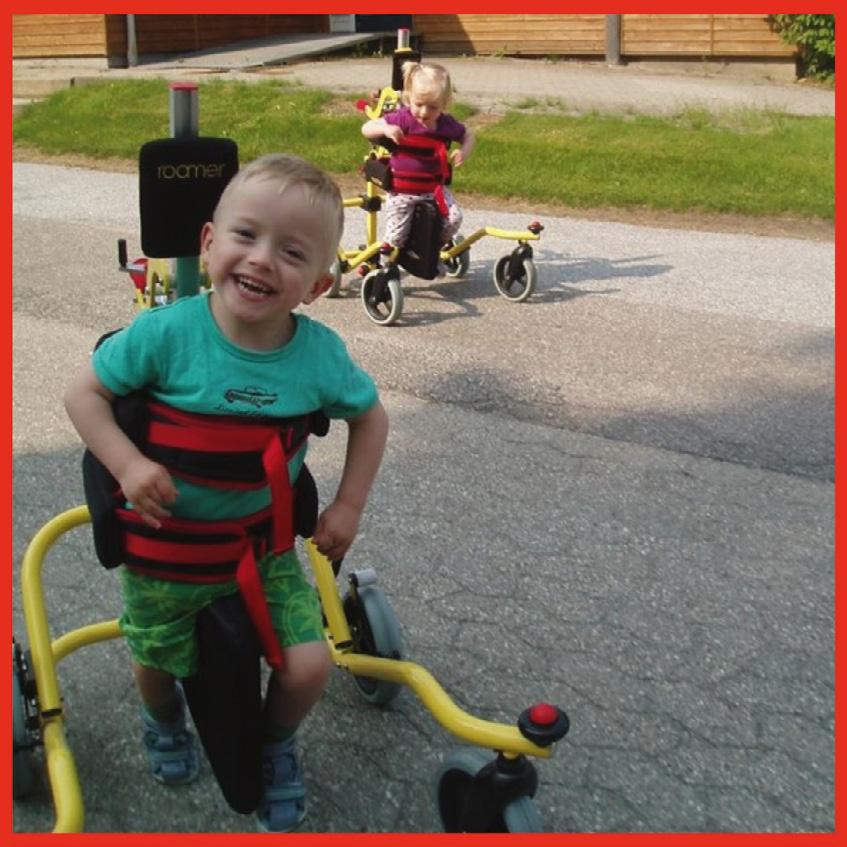
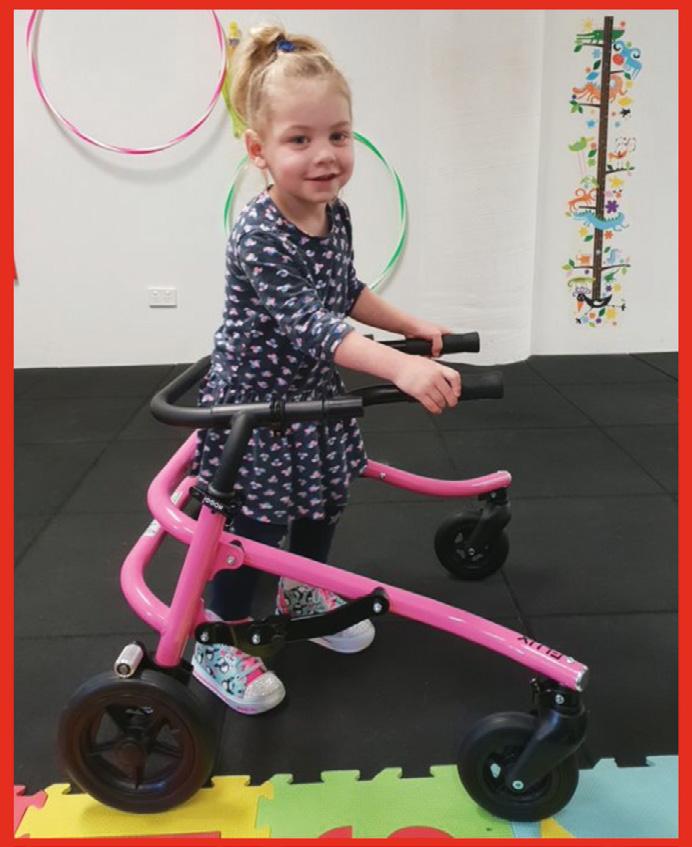
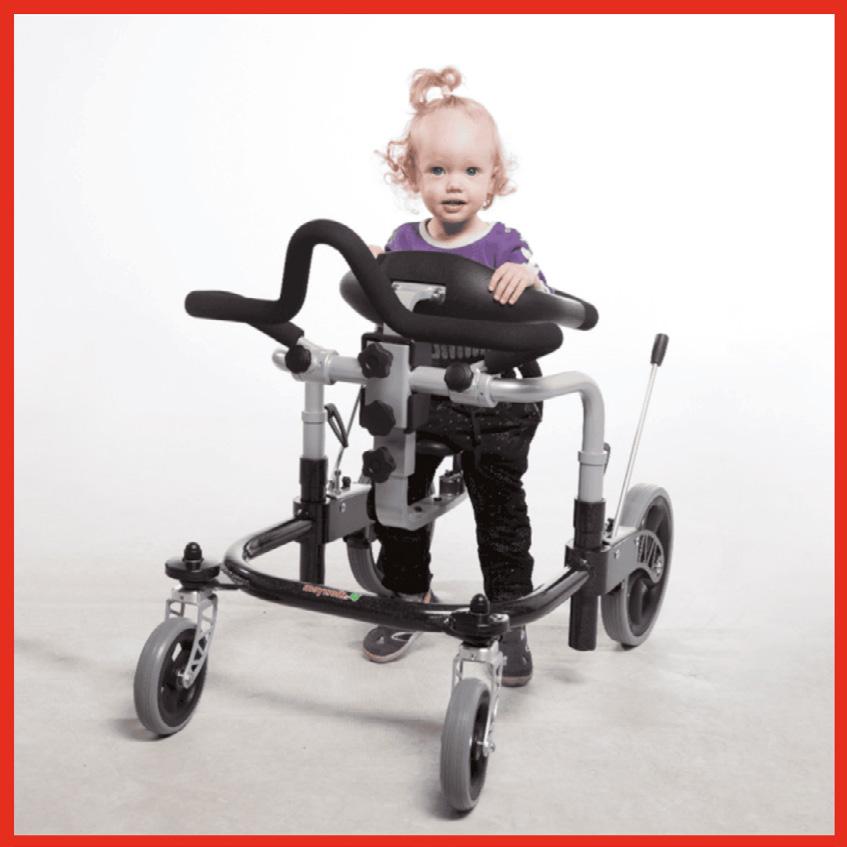
V I S I T U S A T A T S A M E L B O U R N E S T A N D 2 0 0 www.rtdaus.com.au T h e e q u i p m e n t t o a c h i e v e y o u r g o a l s
WILA Innovations specialises in providing a range of disability equipment
WILA Innovations is the Australian distributor for the Vicair pressure care products, the FOCAL dynamic Arm Supports, the Obi Robotic Feeding Device and the VELA work and medical chairs.
V isit WILA Innovations at the Melbourne Expo to experience the full Vicair pressure care range including the Vicair air mattress.
The Vicair O2 cushions have the unique combination of high-quality pressure redistribution, optimal positioning and comfort. Available in several different models, these are extremely suitable to use to prevent the skin.

The Vicair O2 wheelchair cushion range offers optimal hygiene, temperature and moist regulation and like the Vicair O2 cushions are 100 per cent
breathable and fully machine washable.
FOCAL arm supports offers support for reduced arm and/or hand function. In line with their motto ‘listen, create, improve’, is focused on personal needs and wishes and to achieve an improved quality of life.
A lso on display is Obi, a revolutionary eating device for individuals with upper extremity strength and mobility limitations. Through the use of customisable accessibility switches Obi allows the user to control what they eat and when.
Eating should be personal, fun, joyful, exciting, independent. Obi makes it possible!
W ila Innovations will also have the full VELA chair range on display including the VELA 700E for users
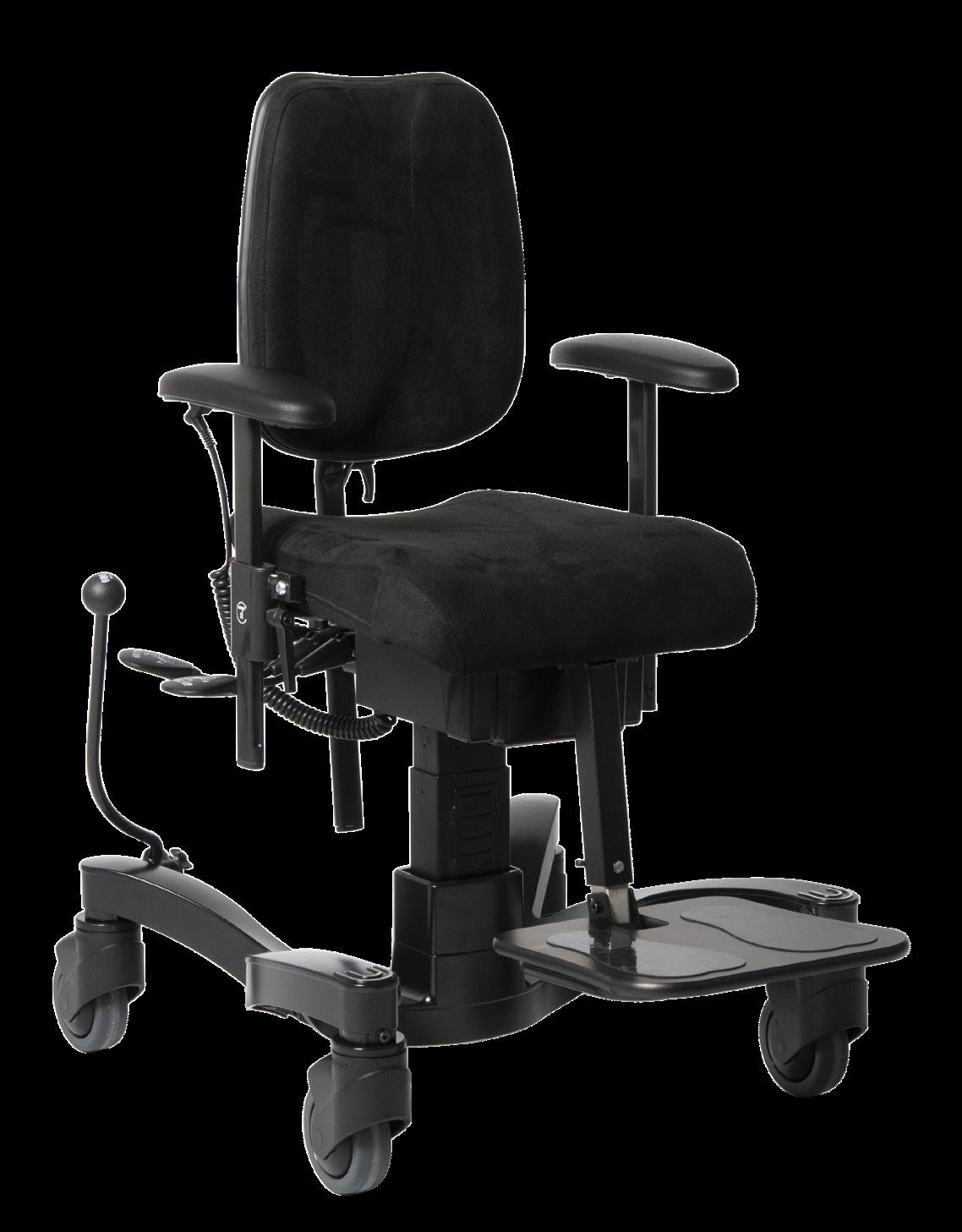
up to 160kg and the VELA 310E for users up to 300kg.
I n a world first WILA Innovations will introduce the new VELA 600E, the completely renewed VELA children’s chair!
All chairs offer independence at home, work and school in a user-friendly design. By sitting down in a VELA chair, you can perform your usual standing activities safely and comfortably without draining your energy. All because of a safe handbrake, easy-rolling wheels and stable sitting comfort.
Visit WILA at Stand #168 at the ATSA Melbourne Expo on May 24-25.
For more information visit: www.wila-products.com.au or info@wila-products.com.au https://www.wila-products.com.au/
Link to... ATSA April/May 2023 44


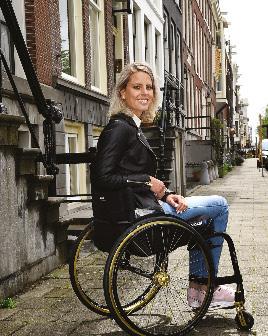
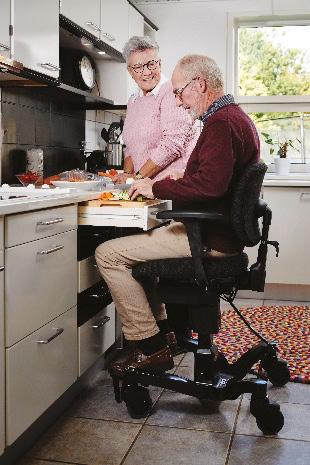

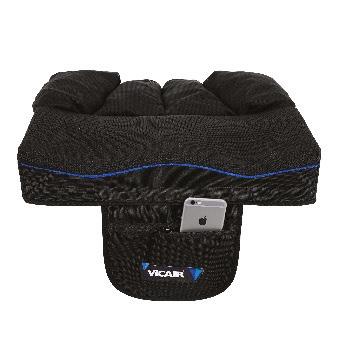

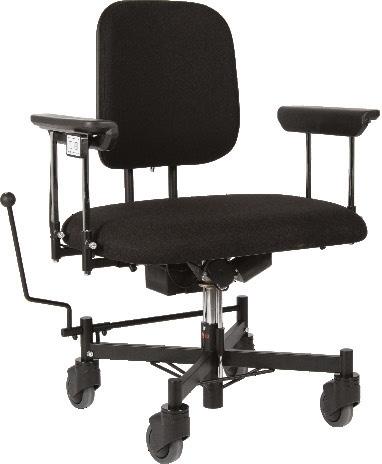
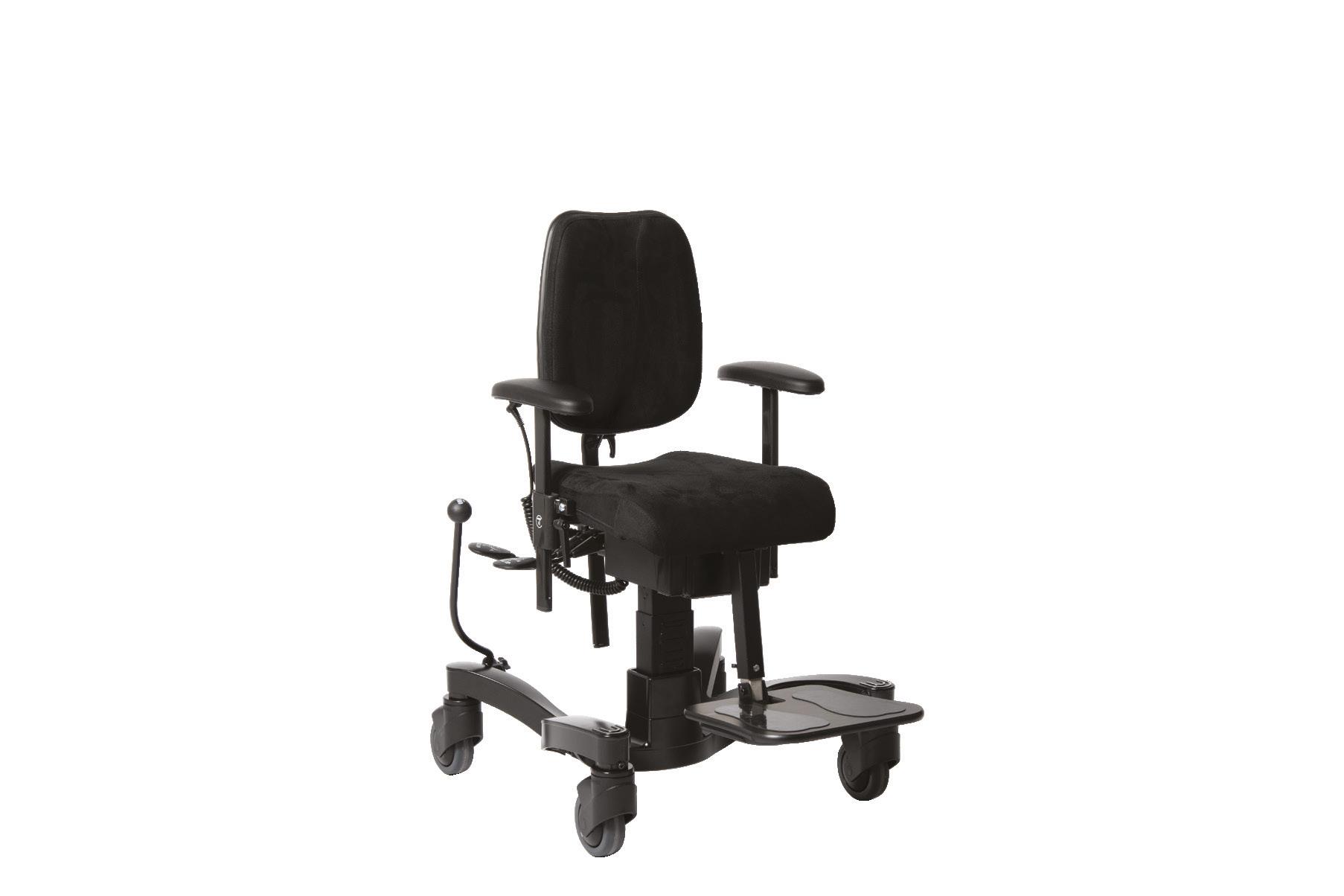
Quality of life enhanced through innovation in assistive technology info@wila-products.com.au www.wila-products.com.au 168 STAND WILA Innovations is the Australian distributor for a range of assistive technology equipment for people of all ages and level of disability. Visit the team of WILA Innovations at stand 168 to experience the VELA Tango range. OBI ROBOTIC FEEDING DEVICE The first dining robot of its kind. VICAIR RELIEF BY AIR
cushions designed for comfort and protection. VELA 700E The VELA 700E chair that can assist you continue living independently. • The VELA 310E
Wheelchair
Why Specialist Seating? A solution for pressure and comfort needs
to improve comfort and relaxation during the day while providing postural stability. The family were grateful to secure a solution for Tarj’s pressure and comfort needs within five days of placing their order and are now working towards improving his 24-hour postural management.
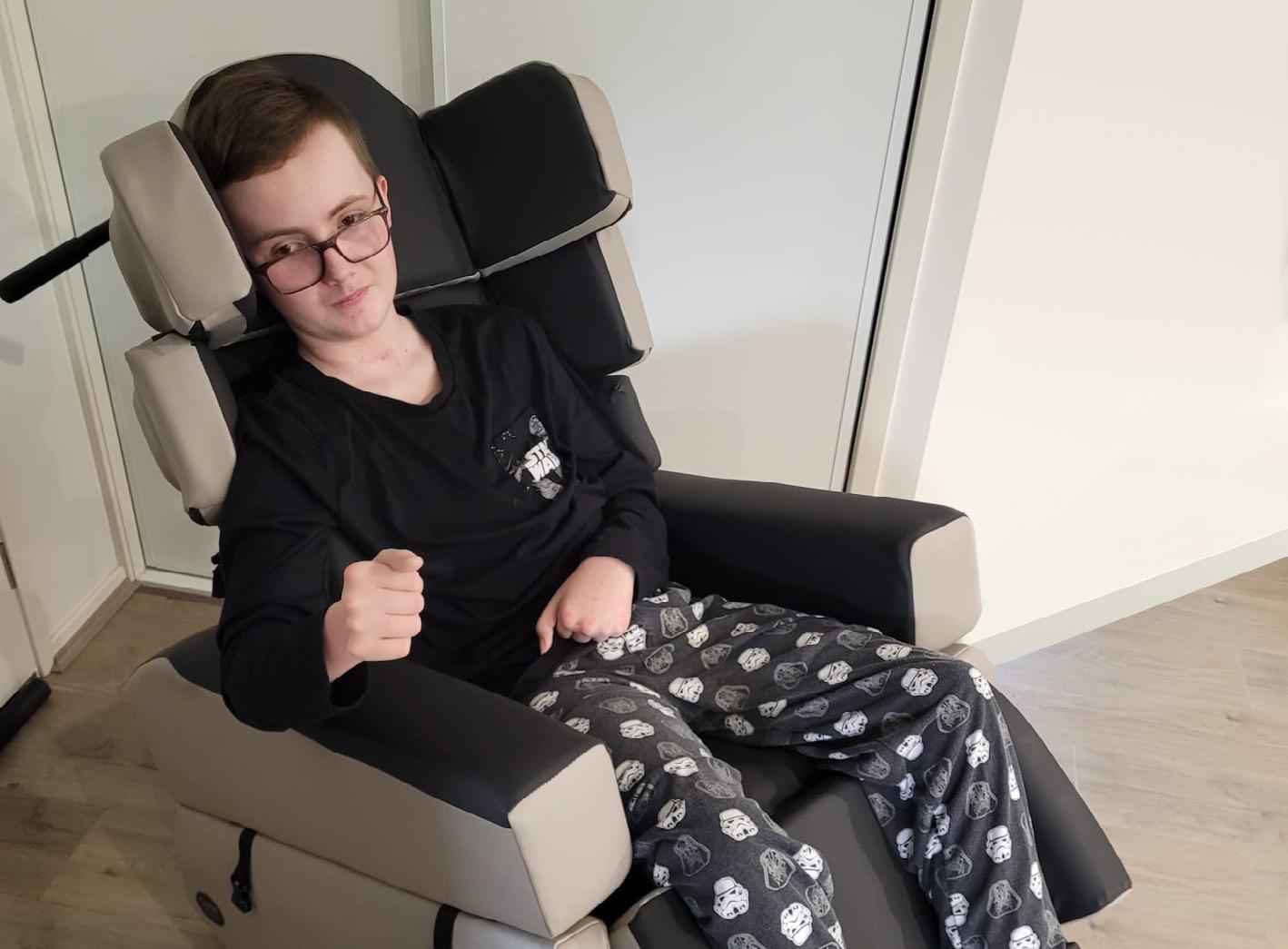
Sp ecialist indoor seating options offer multiple benefits to children with limited or reduced motor ability. In addition to comfort, such seating systems provide adjustable support for changing ability and growth while enabling greater independence during activity participation.
T his category of seating aims to correct or accommodate a person’s posture, depending on the outcome of their assessment. Ultimately, their body segments will be fully supported, and their body weight distributed evenly throughout the chair. Many aspects of a specialist chair will offer the support necessary to encourage optimum respiratory function.
T hese aspects include:
• Adjustability ensures correct seat dimensions can be set up. These are critical for pelvic stability.
• Contoured seat cushions enable pelvic stability and symmetry.
• Trunk support options, from contoured back cushions to lateral support pads, can ensure optimum
trunk alignment.
• Supportive and comfortable head supports can encourage a safe midline head position.
• Tilt-in-space function can utilise gravity to open the chest and shoulder girdle, when safe and appropriate to use.
• Specific chair functions can also help reduce the risk of skin breakdown during periods of prolonged rest.
An example of someone who has benefited from this type of seating is Tarj Baxter, who was an active 12-year-old from the Illawarra area south of Sydney. The young adventurer was on holiday with his family exploring the trails of the hidden gem, Gerringong Falls. Partway through the family trip, disaster struck and Tarj lost his footing, tumbling 30 metres down a cliff. Miraculously he survived, and his parents had their little warrior home after 35 weeks in hospital. Now 14 years old, Tarj is navigating the road to recovery.
He has taken delivery of a fully motorised SmartSeat Pro from Astris PME as his therapists aim
His new specialist seating has provided him with opportunities for active sitting and strengthening of his torso muscles while facilitating greater independence in task participation. It has also allowed Tarj to join his family in the lounge room, participate in therapy sessions in a more receptive position and provide a comfortable option for daytime required sleeps. Before the SmartSeat Pro, Tarj was spending the majority of his day in a wheelchair and refused his recommended daytime naps. Now he will be able to utilise the tilt function to meet his 24-hour program requirements and comfortably nap during the day.
T he SmartSeat Pro seating system features WaterCell technology which incorporates pressure relieving materials and pressure redistribution functions. This will form part of Tarj’s pressure care program contributing to his holistic 24-hour postural management approach. The technology also enables Tarj to achieve a stable and functional posture without compromising on pressure management and comfort.
It is important to consult your therapists and include them when trialing any form of specialist seating. Once you have gained an understanding of the client’s requirements, you can jointly discuss the most suitable specialist seating with one of Astris PME’s product consultants. Contact Astris PME on: 1300 131 884 or email: clients@astris-pme.com.au.
A stris-PME will be at Stand #148 at t he ATSA Expo Melbourne, May 24-25.
Link to... ATSA
April/May 2023 46
Tarj Baxter
Bed linen made for comfort

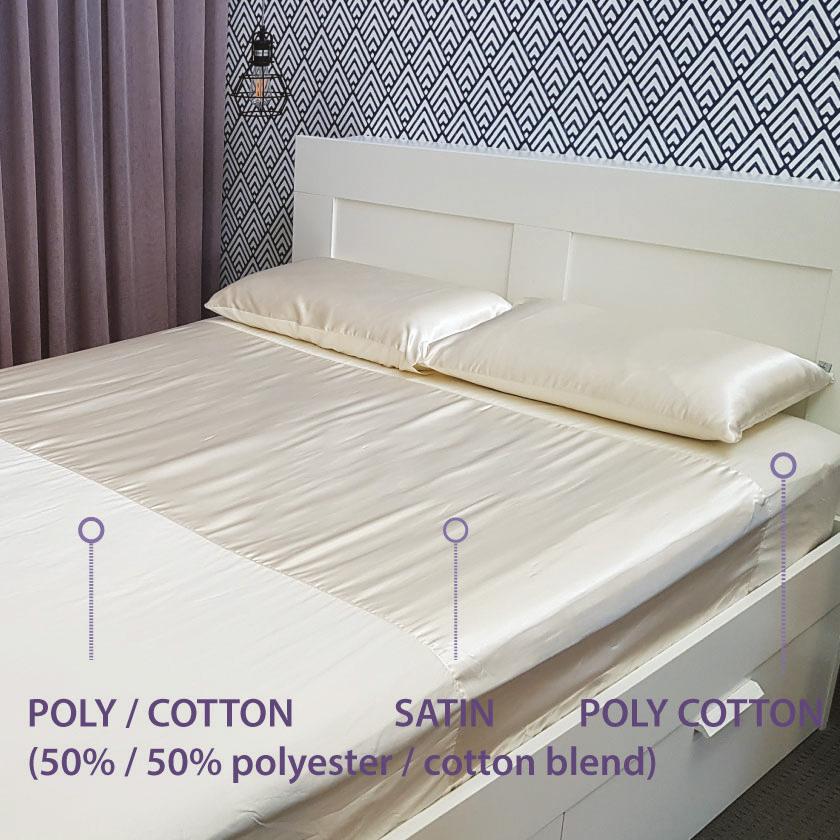
The ‘Wonder Sheet’ is a unique style of fitted bed sheet designed by Dominique Sanday for her father who had Parkinson's disease, when turning over and getting in and out of bed was becoming difficult for him.
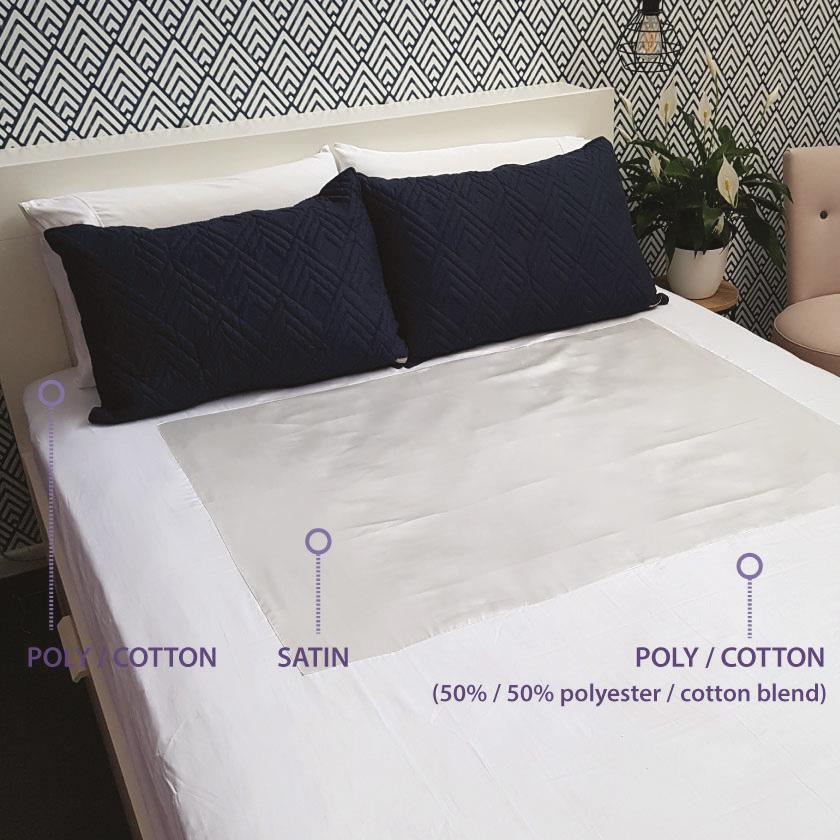
“It’s all because of the fabrics and how we’ve put them together that makes the Wonder Sheet so effective,” she said. “The satin panel is under your shoulders, back and hips and your feet are on the poly/cotton sheeting. This combination makes turning over and getting in and out of bed so much easier.
“People with other mobility issues, like motor neurone disease, multiple sclerosis, stroke, spinal cord injury, brain injury, bariatric, general ageing and weakness, hip, shoulder, knee surgery and even a carer who is helping their loved one have tried the ‘Wonder Sheet’ and got the same result as my dad. This includes increased mobility, more independence and less strain
and effort on their body. Turning over independently with less effort could be possible."
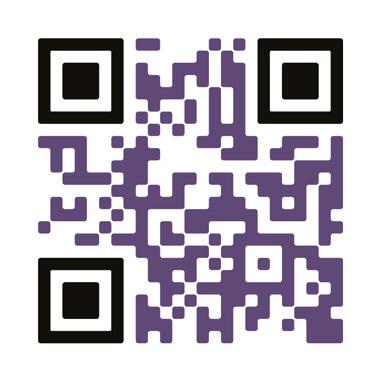 Visit the Wonder Sheet display at Stand #36 ATSA Melbourne Expo for a product demonstration.
Visit the Wonder Sheet display at Stand #36 ATSA Melbourne Expo for a product demonstration.
ATSA linkonline.com.au 47 Find a stockist near you 07-55 911 629 that can make turning over in bed so much easier. Is turning over in bed di cult for you? Try this unique style of tted sheet when mobility matters wondersheet R NDIS, HCP & DVA approved www.thewondersheet.com.au
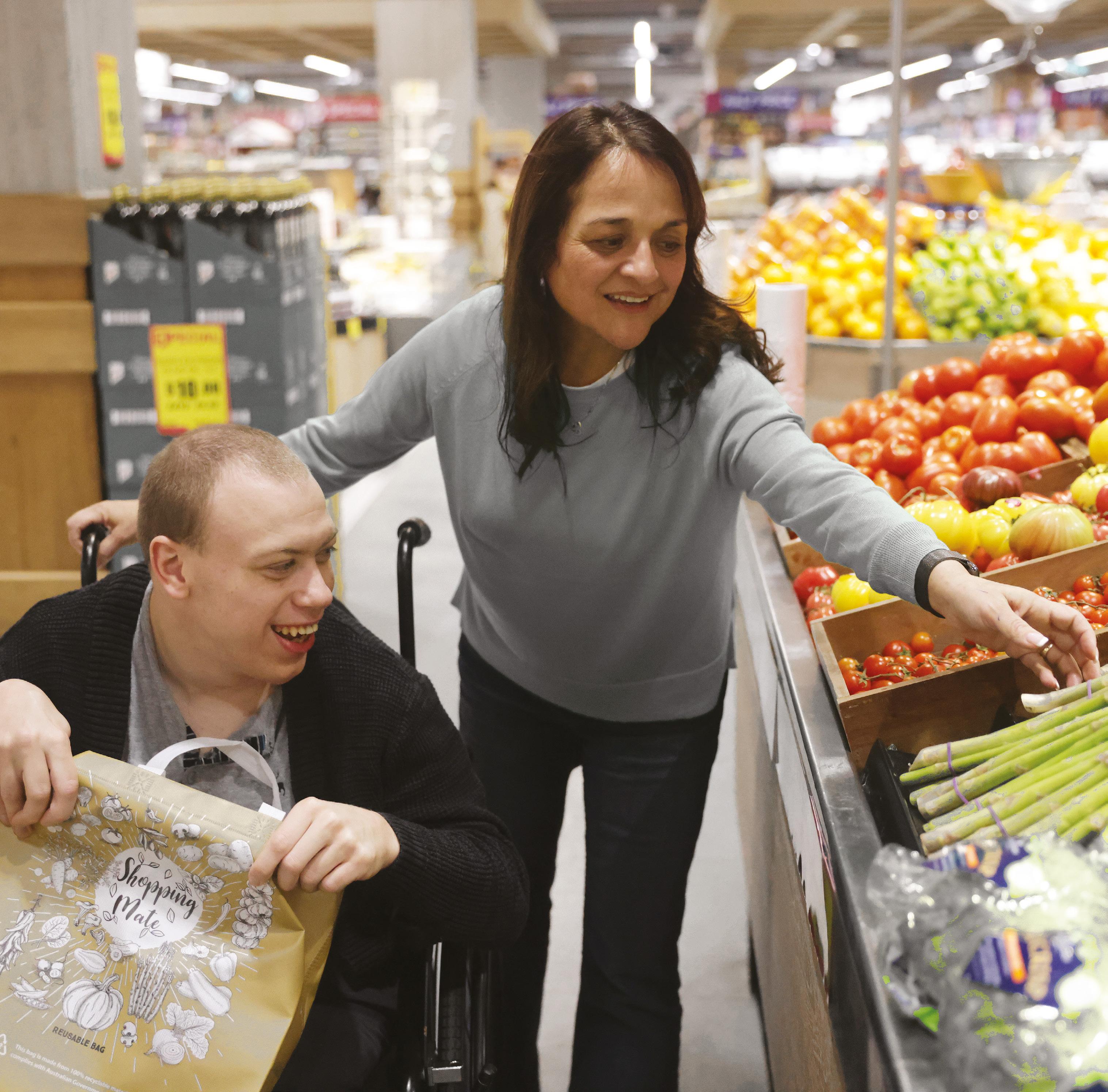
is a website where people living with disability can find and connect directly with independent support workers.

By joining Mable, you’re able to:
Choose your independent support worker from over 12,000 people offering care and support services.
Choose which services you need from the wide range offered through our website
Choose when you receive those services so you can fit the support to your schedule.
Choose with confidence knowing all workers have the relevant Police and reference checks.
Mable
Supporting your safety and independence
Supporting the welfare, safety and independence of people living with disability is a common goal for families, carers, health organisations and the Australian government. Assistive technologies enable people living with disability to be an active participant in the community and communicate with other people, process information and complete daily tasks.
A monitored personal alarm is considered AT as it can increase independence and safety for a person living with disability. Monitored personal alarms are designed to access emergency assistance at just the touch of a button. It gives the person a greater sense of control and reassurance knowing that they do not need to have others with them at all times for those ‘just in case’ moments. They can feel safe in the knowledge that they have access to 24/7 emergency response when and where they need it at the press of their button.
How can a monitored personal alarm support a person living with disability?
A personal alarm is worn either around
your neck, on your wrist, or attached to your clothing. In the case of a medical issue, fall or emergency, you simply press the button on the device and are connected within two minutes to a 24/7 emergency response team.
The emergency response monitor will speak with you to find out what’s wrong, and then arrange the right help, be that an ambulance or help from one of your contacts.
The response team have the advantage of access to your personal file, so if you are unable to speak with us, we can contact Triple Zero and provide them with relevant medical information to enable them to prioritise the call and render appropriate assistance.
In a medical emergency, having someone answer your call for help fast, provide a calm, trained response and know what to do next is critical. This is what a monitored personal alarm can offer.
Monitored personal alarms are used by people who need an additional layer of safety and care, including people living with disability or chronic conditions to enable them to live in their own homes
independently while providing them, and their family, peace of mind the help is right there with them 24/7 if they need it.
Can I use NDIS funding?
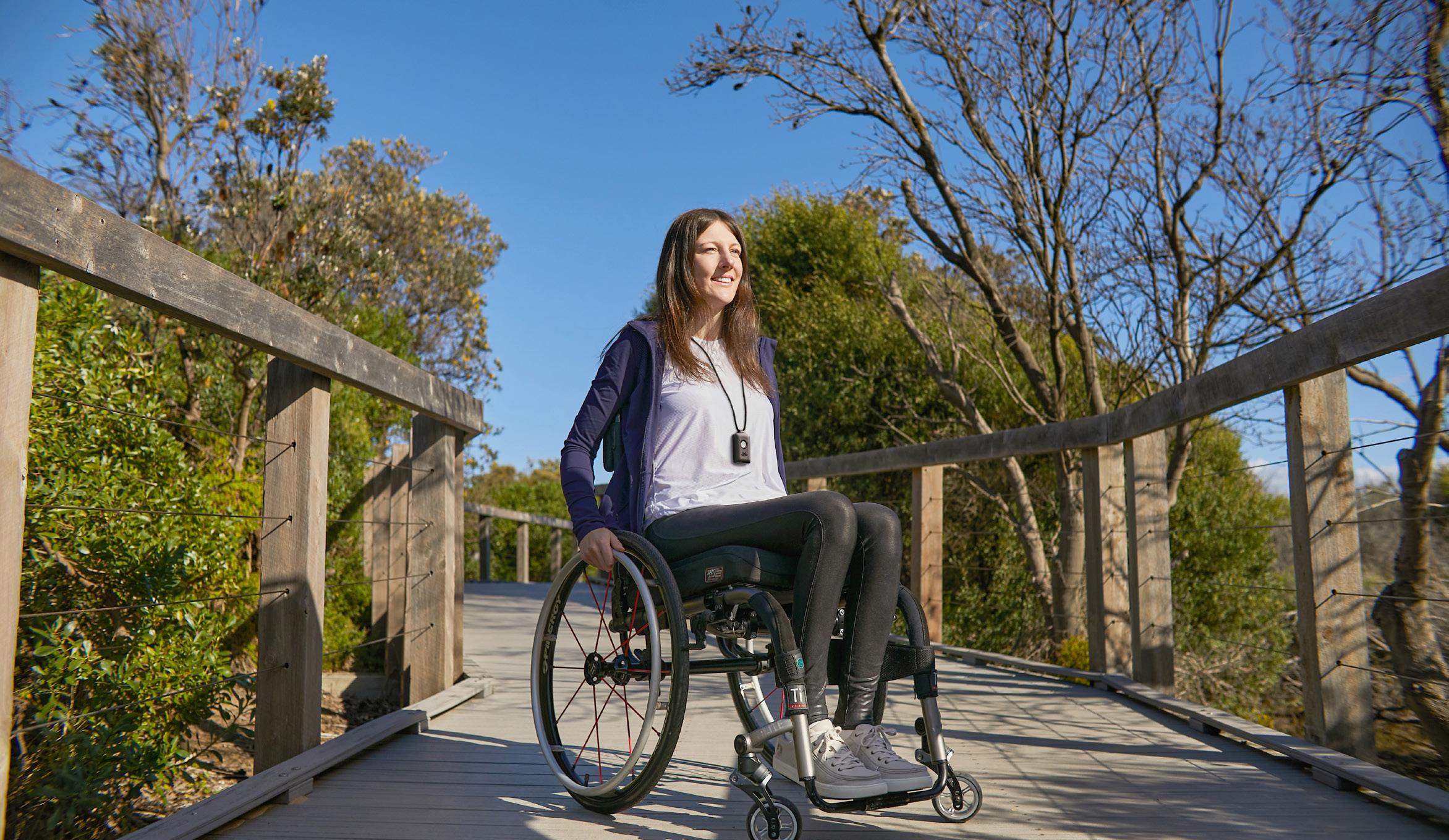
To include a monitored personal alarm in your NDIS plan, funds need to be available in the Core Support and Assistive Technology Categories. If your goals, identified as part of your NDIS plan, are centred on independence, safety or social inclusion, a monitored personal alarm will help you achieve those goals and should be written into your plan.
The great thing about a monitored personal alarm being under the basic or standard levels of funding is that the alarms are easy and safe to use and are relatively low cost compared to other ATs. This makes applying for a monitored personal alarm quite a quick process.
The next step is to find a trusted, authorised NDIS provider for monitored personal alarms, such as MePACS, to provide the service to support these goals and put in an application.
Link to... Accommodation & Home Support April/May 2023 50
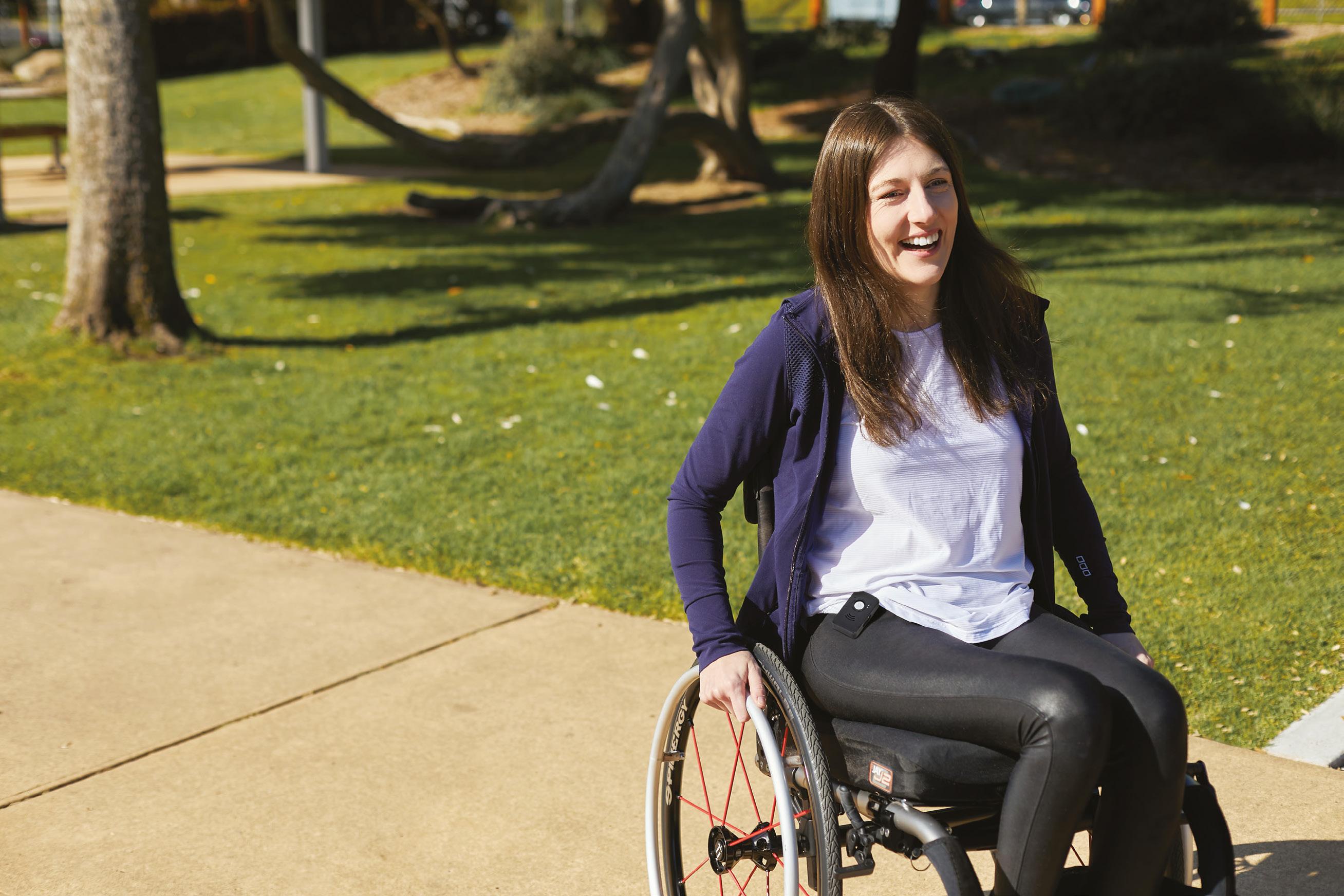

How Corey is fulfilling his travel dreams
“To be able to travel, especially after Covid, it’s going to be nice to experience another part of the world. Yes, there will be challenges but I’ll get through it because I have the right people to help me achieve that.”
Choice, control and safeguards: Mable made it happen
For Corey, the process of finding and engaging Sandy was made easy thanks to the Mable app, he said. “When you look for a new support worker, you can read their bios, reviews other people have written about them, and what kinds of services they offer. And you don’t just have to meet them at your home. You can do a video call before you meet them.”
Corey’s support worker at Mable, Sandy, assists him with dayto-day tasks such as preparing meals, shopping, and organising his things. But it’s more than that. Thanks to Sandy’s experience as a travel agent, she is now supporting Corey to plan a trip overseas with his loved ones.
“The best thing about working with Sandy,” Corey said, “is she’s warm and empathetic. She has such a positive energy and is very enthusiastic in everything she does. She really puts a smile on my face.”
Over the last four years, Corey and Sandy have been working together to empower Corey to live independently. The support relationship has been an enriching experience for both. For Corey, it has meant being able to live life the way he wants, while Sandy has been able to use her existing skills to support Corey in the way he wants to be supported.
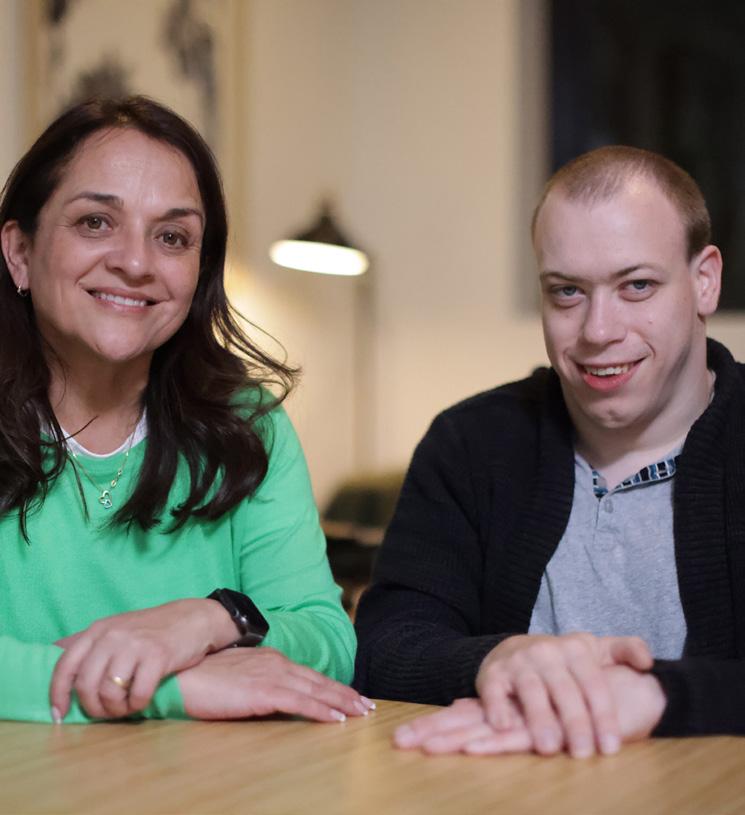
Cooking, swimming, organising and more
A typical day in Corey’s life starts with getting up and ready followed by a delicious breakfast. “Sandy is an elite cook,” Corey said. Then, they
plan their day, which might involve shopping, getting a coffee, dining out or going to the park. If the weather is rainy, they plan a meal to cook, shop for ingredients then do the cooking together back at home. Sandy is also on hand to take Corey to his appointments. Corey is a big soccer fan and loves swimming and volunteering for his church in the form of letter writing.
“It makes me feel very happy to know that Sandy does care about her job. I’m grateful that Mable has made it possible for me to find Sandy and I’m grateful that she’s happy to work with me as well,” he said. “Sandy knows what to do without being told and has a lot of love too.”
Corey is also appreciative of Sandy’s organisational skills. “It’s the little things. She’s a really good organiser and brought in a filing cabinet system one day to help get me organised.”
Most recently, Corey has found Sandy’s support valuable in planning an overseas trip after a long pause in travel. Having had her own travel business for more than 25 years, Sandy has been assisting Corey plan for an upcoming trip to Thailand or Dubai with his brothers.
Corey also appreciates that with Mable, he has the flexibility to organise his support sessions himself.
“I can book Sandy for a day on the weekend if I need to, or for a specific event.”
Meet Sandy, Corey’s support worker from Mable
Sandy’s motivation to sign up on Mable as an independent support worker was to help the community. “I had my own travel business for 25 years, but it was time for a change. I wanted to put my efforts into helping people who really needed support. When I found Mable in 2017, I realised it was what I was looking for.”
Talking about her support relationship with Corey, Sandy said “Corey’s very down to earth and I have become very fond of him. I love what I do, I’m working more than I ever did in my entire life, but I love working with my people. I feel that I’ve built a beautiful career and I’m so proud of myself.”
If you’re needing support, search for independent support workers on: mable.com.au
Link to... Accommodation & Home Support
April/May 2023 52
Sandy and Corey
Paper vs Electronic
Me dication management is complex, with the majority of clients with co-morbidities, complex medicine regimes and issues with polypharmacy. It is important you select a vendor who is focussed and are experts in medicines “The Best of Breed approach.” Don’t be afraid to ask the hard questions, such as costs, implementation timelines, support model -as the last thing you want to do in an emergency is take a ticket. Perform your own checks and balances by asking for references to obtain independent opinions from your providers such as pharmacy. Probe the capability and capacity to innovate and expand on the current solution offering to uphold industry standards and regulation changes as we navigate through digital health.
A ll electronic medication management (eMM) solutions should promote best practice and industry standards within their solution. future to ensure safe and accurate
medication administration and records, anytime, anywhere.
Ensure the eMM vendor solution allows you to maintain relationships with your key stakeholders- doctors and pharmacies. Ensure pharmacy can maintain supply with their current systems in place, is cost effective to use, and supports client choice. Hybrid electronic/paper medication management solutions can introduce risk and a digital single source of medication truth for all your clients should be mandatory. All medication records should be consolidated in the one platform including and not limited to regular, non-packed, PRN and Nurse Initiated Medicines.
Some benefits of using eMM include;

• Risk reduction with clear and legible orders displayed to staff, including dosing time and reason for starting Easy to use with one touch administration for staff Increased visibility of a clients
medication record for GP, pharmacists and organisation staff;
• Timely provision of medicines through access to real time medication information
• Prompts, alerts and access to medicine information to assist in clinical decision making
• Reduced administrative burden for organisations, prescribers and pharmacists- no paper or faxing
• Easy reporting on chemical restraint and polypharmacy
• Offline capability.
Making an informed decision is key to the longevity of the software you are buying, securing your organisations long term investment, and improving the health-related outcomes for your clients.
Contact Medi-Map for a free, no obligation demonstration on how we can streamline medication management across your organisation, improving safety for your staff and quality care for your clients.
Electronic medication management

linkonline.com.au 53
ACCOMMODATION & HOME SUPPORT
w w w m e d i m a p c o m a u 1 8 0 0 4 3 1 4 2 0 For more information download our brochure: o f f i c e @ m e d i m a p c o m a u Access in real-time from anywhere Oversight via corporate interface, chemical restraint & polypharmacy reports No software installation, access on any device DIGITAL MEDICATION CHARTS REAL TIME MONITORING WEB BASED PLATFORM Access and administer medications electronically offline Easy access to support resources including CMI, product information and interactions Suite of e-learning modules & assessments provided NO INTERNET? NO PROBLEM SUPPORT & RESOURCES COMPREHENSIVE LEARNING
Donate to Vision Australia
This April, Vision Australia Radio is asking the community to dig deep and support the work that they do to create reading content for those who are blind, have low-vision or a print-disability.
Vision Australia services are delivered by an enthusiastic and passionate team of 600+ volunteers nationally, with the support of a small team of dedicated staff, who through their time and skills help keep costs down, but it doesn’t cover all expenses.

V ision Australia audio business development consultant Jason Gipps said being an essential service for people living with print-disability doesn’t come easy. “There are transmission costs, rental expenses, broadcast licences, everything down to tea and coffee to keep our volunteer radio presenters energised each day and able to give back to a community that is often isolated, forgotten about and left behind by the wider community.”
C ommunity radio provides a platform for often marginalised groups to have a voice and to share lived experiences with those who tune in. Without radio services like Vision Australia Radio, people living with disability are often talked about, rather than driving the conversation.
V ision Australia Radio’s blind and low vision presenters don’t just keep
its national audience informed, they empower and inspire listeners to live the life they chose each day, Gipps said.
P resenter of Talking Vision, Sam Colley knows the positive impact his weekly radio program has on the blind and low vision community. “For over three years, I’ve had the chance to bring news and stories to our community and highlight the achievements within. Talking Vision has introduced me and my audience to a wide range people from diverse backgrounds,” he said.
Supporting the Vision Australia Radiothon today will help to keep the service on-air tomorrow.
V ision Australia has 15 radio services across Melbourne, Adelaide, Perth, Darwin, regional Victoria and Southern New South Wales across AM, FM, DAB+, online streaming and podcasts with easy access to news, current affairs, and specialist content from anywhere in Australia.
Visit www.varadio.org and make a donation today. Donations over $2 are tax deductable.
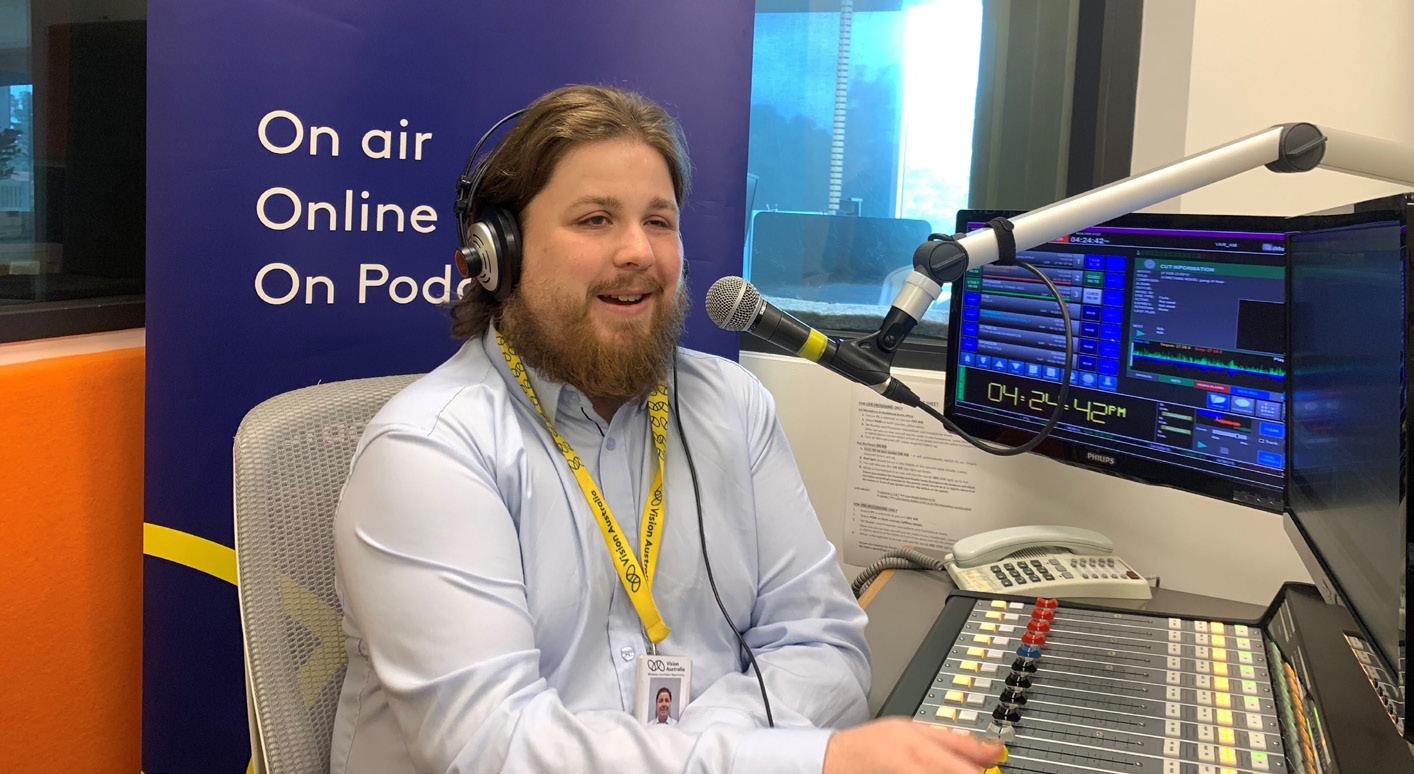
54 April/May 2023
Link to... News
Create beautiful memories with Rosie’s camping program

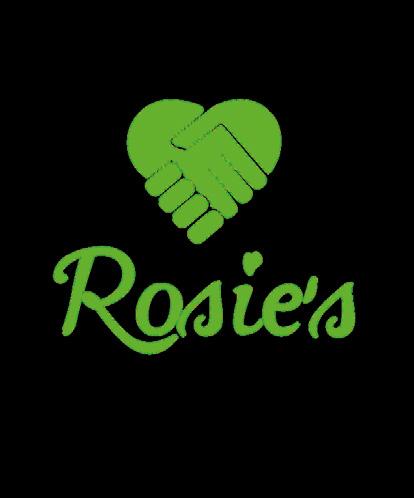
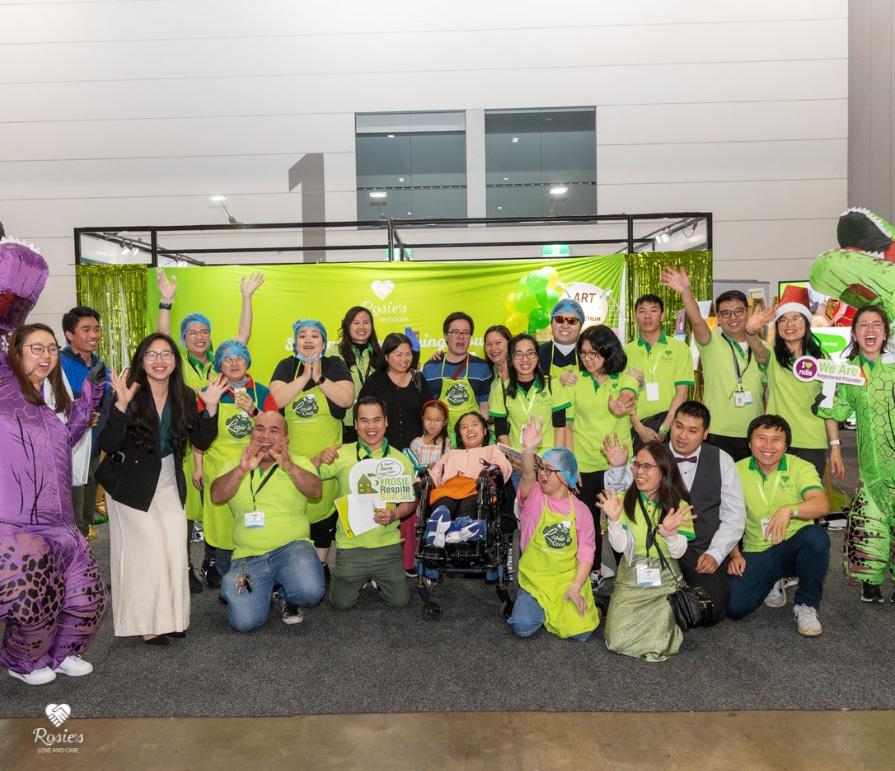
Having disabilities either physical or mental, should not be a barrier preventing participants from enjoying the fun and excitement of nature-based activities such as camping, bush walking and sightseeing. Being out to nature is beneficial not only for participants’ mental health but also for their carers, who spend lots of time taking care of them.
At Rosie’s Love and Care, we occasionally organise camping trips for our participants and their family to spend quality time creating memories together with less effort in planning ahead.
We plan it all for you! From the destination, where to rest, enjoy local foods and participate in the local experience with the full support of our staff during the trip.


O ur camping programs usually take place in regional areas where we find beautiful sightseeing spots, unique local experiences, and delicious food. Our goal for this activity is to create an occasion where participants and carers and take a rest and enjoy their time together. The most important goal is to create beautiful memories and experiences together.
From enjoying beautiful landscapes of mountains, beaches, forest; picking seasonal fruits at the farm; skiing in winter, to simply having a lovely picnic beside a burning fire pit, we proudly say that our camping program earned lots of positive feedback from our clients and is one of our most favourite programs.
THE SPECTRUM ART EXHIBITION THROUGH THE EYES OF ROSIE'S ART & CRAFT CLASS Hotline: 0492 668 668 Or email us at: info@rosielovecare.com.au
Making the disability sector a safer space for all
The Victorian Disability Worker Commission is an independent regulator. It aims to support and protect the basic right to safety for people with disability so they can live free from abuse and neglect.
To help achieve this, the Commission provides a complaints service for anyone who has a concern about a disability worker in Victoria. The service aims to improve the safety, quality of care and service standards across the state’s disability sector. It’s also independent, confidential and free.
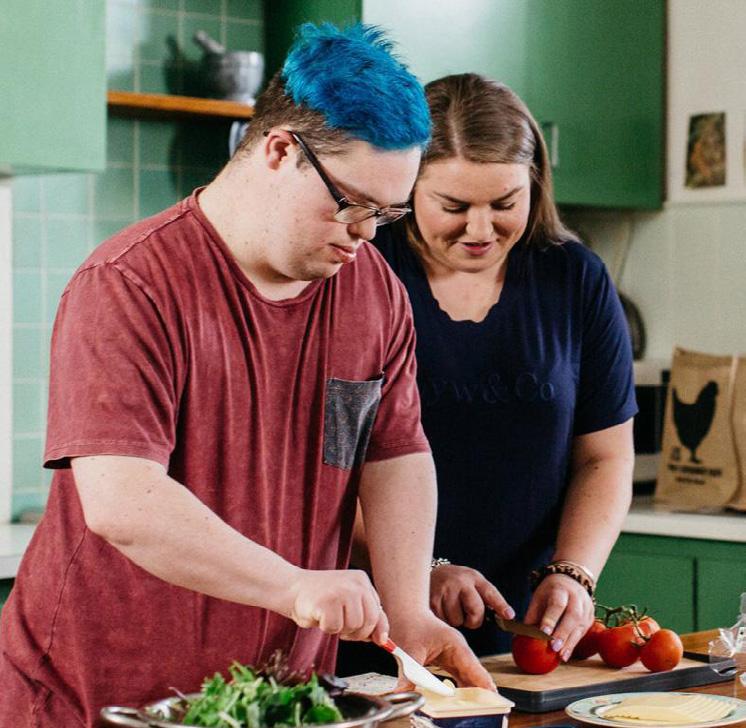
The Commission wants unsafe disability workers to be identified so they can be held to account. The complaints service also doesn’t require the involvement of a service provider. It can take and investigate complaints about any Victorian disability worker whether they are NDIS-funded or not.
Making a complaint is a great way to improve services, as it can help disability workers make positive changes in their practice. This was the case for Chris*, who received education and counselling about the Code of Conduct after a client complaint about him attending a medical appointment during work. The complaints the Commission receives are wide-ranging and it
can act accordingly. Solutions might include helping to establish better personal boundaries, revising support plans or commencing investigations for more serious offences.
The Commission wants unsafe disability workers to be identified so they can be held to account
Anyone can make a complaint about a disability worker, for example, a family member or friend, a carer, member of the community or a person with disability. Complaints could be about any aspects of care provided by disability workers, including:
• Their standard of work
• Their knowledge, skill or judgement
• Their suitability to hold disability worker registration
• The capacity to provide services safely, or
• If they’ve allegedly breached the Disability Service Safeguards Code of Conduct.
Victorian Disability Worker Commissioner, Dan Stubbs lives with
disability. He is vision-impaired and knows it’s important for a person with disability to trust their support worker. He is confident that the complaints service will help improve standards.
“It’s important that people with disability feel safe with their disability worker,” Stubbs said. “Sharing a concern or making a complaint can help improve the standard of disability workers and quality of care for everyone.”
Under the Disability Service Safeguards Act 2018 (Vic), disability workers and employers must notify the Commission if they believe that a disability worker has engaged in misconduct which puts the safety of people with disability at risk.
If you are unsure whether your concern is something you can make a complaint about, the team can help. Visit www.vdwc.vic.gov.au/complaints-andnotifications or call: 1800 497 132. You can complete an online form or write to us at: Level 20, 570 Bourke Street, Melbourne VIC 3000. We can also arrange in-language interpreters.
Let’s work together to ensure a stronger, safer disability sector. *Names have been changed
Link to... Accommodation & Home Support April/May 2023 56


The new national guideline is the biggest gift for the NDIS
and estimated to be between 1 and 2 per cent of the population. While it is not clear why the prevalence of autism is increasing, higher levels of diagnosis and heightened awareness of the condition may have contributed to a surge in the reporting of autismrelated disorders.
Now what?
What?
In a first for Australia, a national guideline has been released that clearly defines and describes evidence-based practice for children aged 0 to 12 years with autism. The National Guideline for supporting the learning, participation and wellbeing of autistic children and families has been developed to a high quality internationally agreed standard.
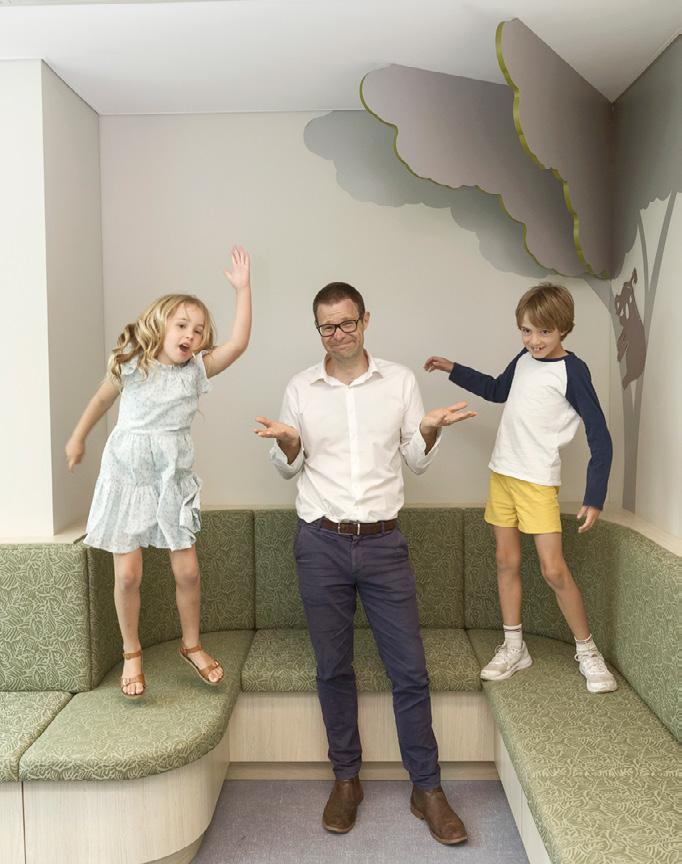
“What this guideline does is unequivocally tell everyone a common truth as to what is evidence-based practice,” Andrew Whitehouse said.
The main audience for the guideline is practitioners as it outlines a very clear standard of what is, and what is not, evidence-based standard practice to follow.
The 84 recommendations in the guideline include a clear example or rationale for their selection and resource implications.
So what?
Autism among children is increasing
Whitehouse said early therapies and supports for this age group is “absolutely critical’ for several reasons. “We know all the amazing things that can occur in the first couple of years of life which is when all the brain fireworks are happening. In terms of bang for buck we can provide the greatest opportunity to reduce disability for children. It is also important to give families support in those early moments, so they are not in the wilderness and understand from the first go-get that they understand their child’s development and how best to support their child,” he said. “Now there is a roadmap through which they can start navigating the supports they need for their child to thrive.”
He recalled families coming to him 25 years ago with children who were developing differently and the love and trust they brought with them in the hope they would find support. “While we were operating at our best we were certainly blundering in the dark,” Whitehouse said.
His intention is to shine the spotlight on providing support to children, adults, and families in need and resist the danger of viewing children who are developing differently through an “autism prism”.
“What I encourage is keeping the focus on children developing differently but understand that autism is just one of the many conditions where children need support.”
According to Whitehouse the guideline is the biggest gift for the NDIS. “This guideline is the agreed standard, agreed by evidence and the Australian community, and we should only expect and accept this standard for NDIS funding. The NDIS is going through a major period of change and for the NDIS to approve and endorse this guideline would be an extremely positive change.”
The guideline has been approved by the National Health and Medical Research Council (NHMRC) with approval valid for five years when there will be an update to check recommendations are still in line with current best evidence.
Autism CRC, who developed the guideline, is providing information and resources to promote the guidelines to professional and service association for members, “so they have every opportunity to understand what is evidence-based practice and use it,” Whitehouse said.
“The guideline is a genuine leap forward and ultimately an accountability document that is the standard we must have and will accept nothing less.
“I would be surprised if we don’t see international jurisdictions start to follow Australia’s lead and implement their own guideline.”
“We are also working with the NDIS to change the age when we can start to support children. We recently published findings around providing therapies to babies showing early developmental signs of autism and the positive effects these therapies can have on the first year of life, and what this might look like in a broader implementation across Australia.”
Link to... Autism
Andrew Whitehouse, Professor of Autism Research at the University of Western Australia and the Telethon Kids Institute spoke to Link about the new autism guideline and its implications for the NDIS.
April/May 2023 58
Professor Andrew Whitehouse
Feel at home – tips for creating interiors for people with autism

Home is a place to feel safe and comfortable. A place where we can feel at ease just being ourselves. For those on the spectrum, it’s even more important to have a living space that provides comfort and contentment.
There are different types of spectrum disorders. Although generally, adults and children with ASD are either hyposensitive or hyper-sensitive to smell, sight, taste, sound or touch.
Not everyone shares the same experiences or challenges. When creating an indoor space for you or your loved one, it’s important to keep in mind your own circumstances, and focus on what will work for you. Whether it’s an entire home, a couple of rooms, or a small space in a room, here are some design tips that may help you create a happy, autismfriendly living space.
Space
Carefully think about spaces and define them by their function. You can use colours and textures to help with this. Spaces that are orderly and defined are easier for the autistic mind to process. Arrange furniture so that foot traffic will be clear and unobstructed. Also, if you or your loved one has an overwhelming need for cleanliness, find furnishings that can be easily cleaned and sanitised.
Colour
Use softer pastel colours to paint the walls. These tones tend to have a more calming and relaxing effect. Brighter, vivid colours are more likely to cause agitation.
Lighting
For those who have sensory sensitivities, lighting and acoustics should be carefully planned.
Natural lighting is a good option. Large windows with blinds that are
easy to use, are perfect for controlling the amount of light needed. If the room does not have natural lighting, choose indirect, recessed lighting with a dimmer control. Avoid harsh fluorescent lights that can sometimes buzz and many people on the spectrum may find this very distracting.
Sound
Reduce noise levels by using materials and fittings that absorb the vibrations from noise. Wall hangings, carpets, and rugs can help to reduce echoing and noise. Music has been known to help people on the spectrum feel calm. It can also soothe anxieties. A small wireless speaker is a great way to have favourite music playing softly in the background when needed.
Remember, each person is unique and has different needs and wants. Personalising the living space is the key to bringing the most happiness and comfort. Here at Simply Helping, we offer flexible in-home care services! To learn more, contact us today at: 1800 998 866.
New Simply Helping Franchise in Sydney
Simply Helping welcome George Allebi to the team as proud owners of Simply Helping Liverpool. George grew up in South-West Sydney spending more than 40 years there and knows the area well and is passionate about giving the best care possible. After caring for both his parents and currently caring for a young adult with special needs, George is all about ensuring all aged care and disability clients get to experience life like everyone else.
Simply Helping Liverpool, Sydney is a registered NDIS provider, providing support for people with disability, as well as their families and carers.
Find out more on the range of services provided on our website: simplyhelping.com.au
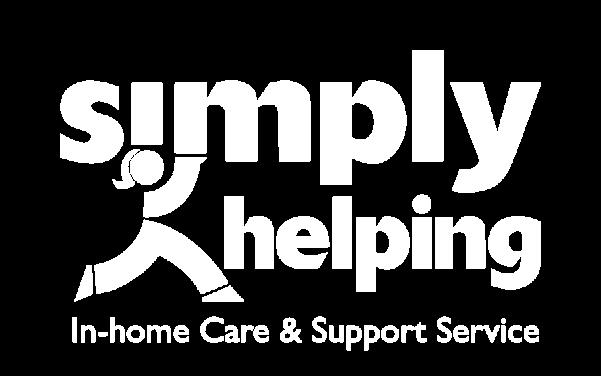
AUTISM
linkonline.com.au 59
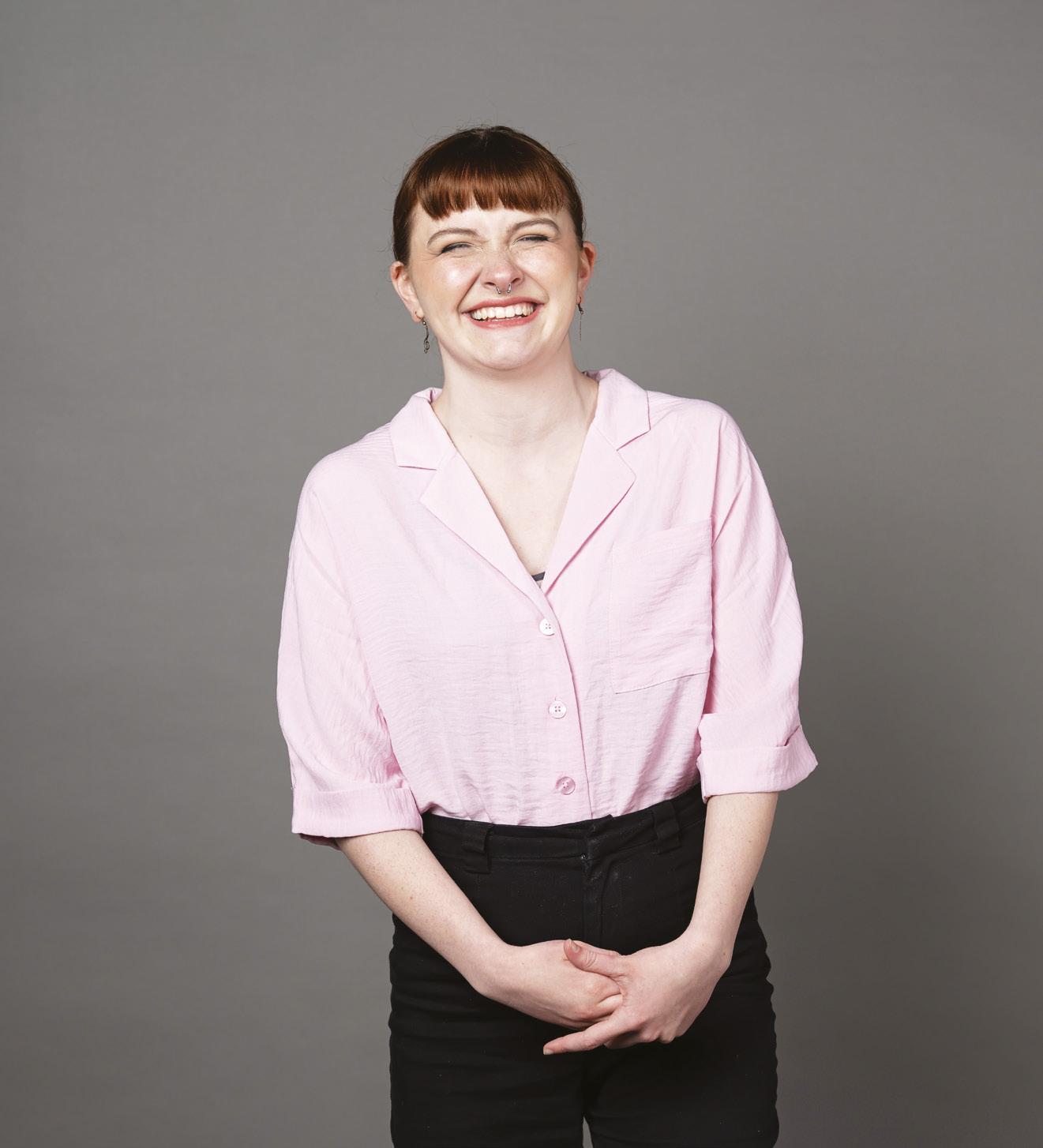

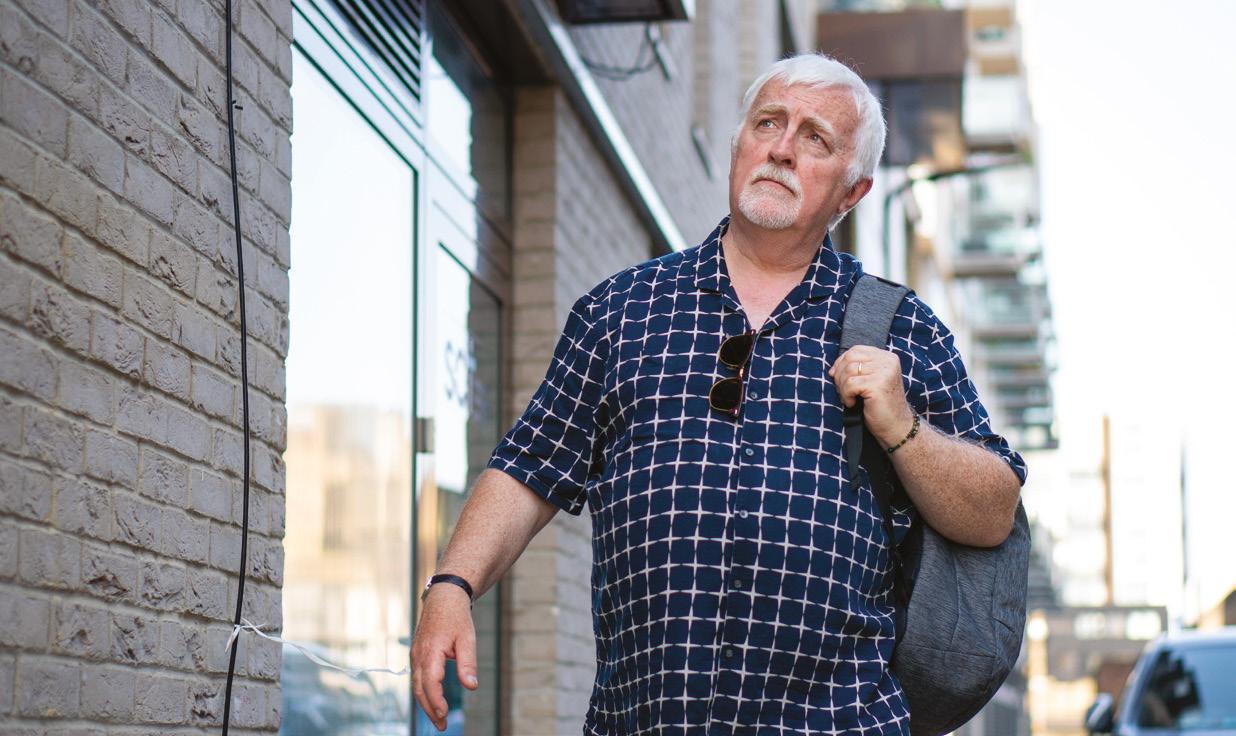

www.autismsa.org.au/autisticguide www.autisticsguide.org.au
New online resource co-developed by autistic adults for autistic adults
Adulthood is complex. There is a lot to navigate – relationships, employment, finances, family, health and wellbeing. The list goes on.
Over the last few years, Autism SA has actively engaged the autistic community to find out what autistic adults would like to know to help them navigate adulthood. In April, Autism SA will launch the end result, the Autistics’ Guide to Adulthood, a free, online, lifeskills resource.
Autistic people have been at the heart of its development. The guide has been co-designed by autistic adults through a national advisory group, autistic content developers, community engagement and a national survey, teamed with extensive research, ensuring the resource is relevant and meets the needs of the autistic community.
The guide contains first-hand reflections, personal anecdotes and learnings from others in the autistic community.
A member of the advisory group, Zoran Bekric, was involved with the development of the resource.
“It was exciting to work with so many other autistic adults. All of them were interesting and had something to contribute. I hope the guide is a significant step towards empowering all autistic adults to live the life they choose,” Bekric said. “I hope people will used the guide to learn something, then keep it around as a reference they can use when they run into a problem.”
The Australian Bureau of Statistics Survey of Disability, Ageing and Carers in 2018 found that of 170,000 autistic people over half of them felt that their needs for assistance were not being met.
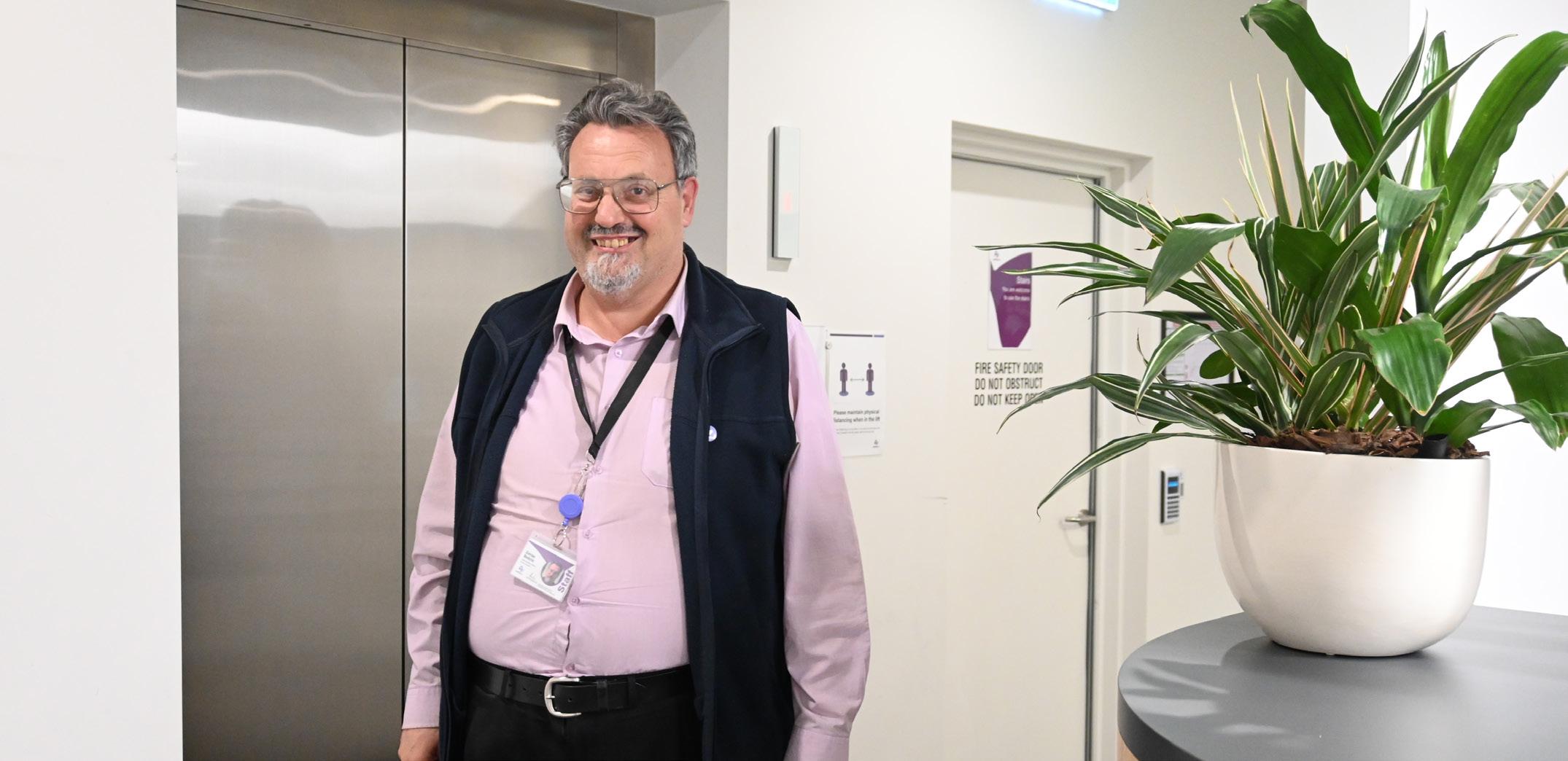
The guide has been designed with people in mind who might not have access to NDIS funding, services, or who live regionally and remotely.
The Autistics’ Guide to Adulthood is delivered as modules, and participants can choose to complete those that are most relevant to their needs. There is no requirement to complete every module.
The modules cover self-advocacy, friendship, physical health, mental health, communication, independent living, employment, education, entertainment, and romantic relationships.
Project manager for the guide, Niki Welz said: “We are excited to launch this resource. It’s something the community has wanted for a long time, a resource specifically for autistic adults. We hope people take from it what they what, connect to supports and activities, and enjoy hearing stories from other autistics that may have similar experiences,” she said.
Developed by Autism SA, the resource can be accessed at the end of April at: autisticsguide.org.au
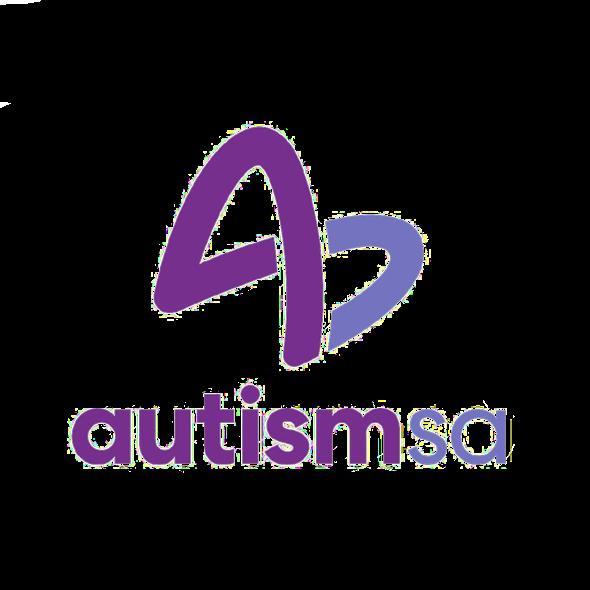
Link to... Autism 62 April/May 2023
Zoran Bekric
New data reveals
The
life-changing benefits of autism early intervention
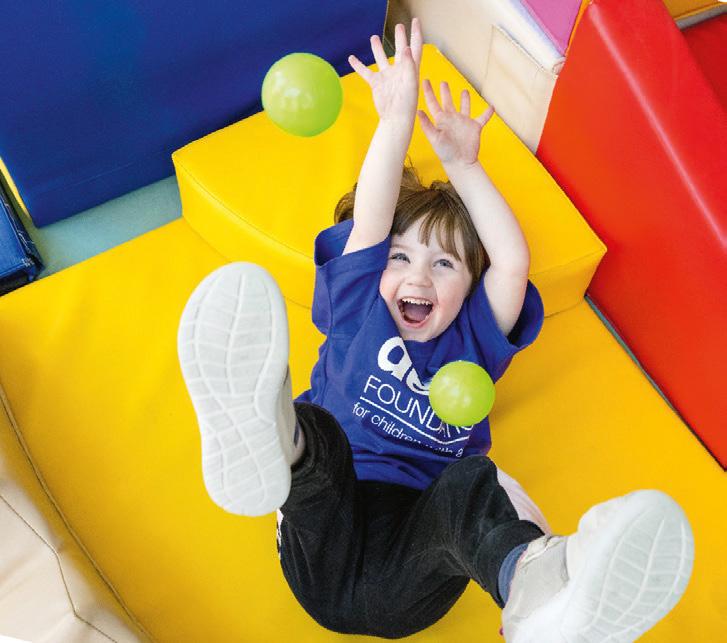
Without intervention, approximately 24 per cent of children diagnosed with autism regress in their verbal skills, new data from researchers at AEIOU Foundation has found*. It shows that regression rates for children who access intensive early intervention are substantially lower, at just 1.15 per cent.
AEIOU Foundation provides full-time, evidence-informed early intervention, education and care to children with autism in Queensland, South Australia and the ACT and holds clinical data on over 800 children aged 2-6 years old.
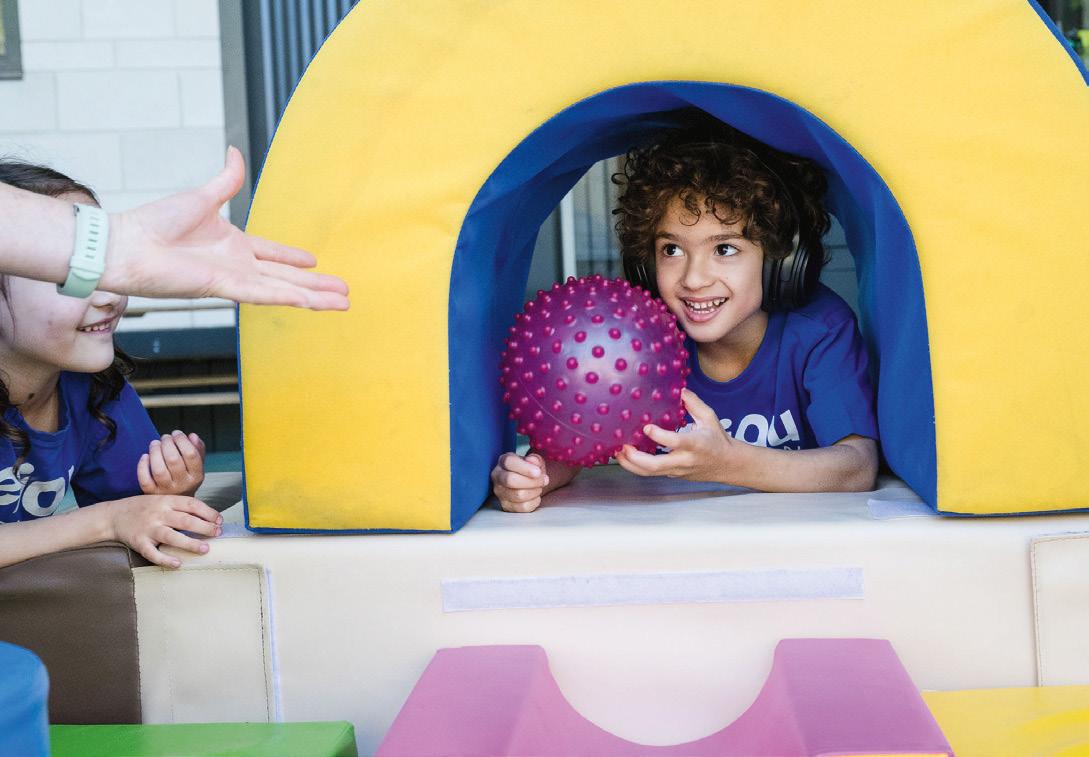
consistent gains in early learning skills such as language, perceptual and cognitive abilities and motor development.
know how to play. He would bang his head against the wall repeatedly and try to hurt his brothers,” Williams said.
“Now, Amias is a happy child who can communicate his wants and needs with others. He is comfortable with more textures and noises. He takes my face in his hands and says, ‘I love you, Mummy.’”
Further research will explore the impacts of AEIOU’s program on the wellbeing of children and families.
children with autism
T he data provides insights into the strengths and challenges of autistic children and demonstrates the impacts of the AEIOU program.
Findings show children made strong
A shleigh Williams, whose son Amias recently graduated from AEIOU’s Bundaberg centre, said AEIOU made more progress in one year with her son than therapists did in weekly sessions for years prior.
“Amias couldn’t communicate or understand simple requests. He didn’t
Therapy & care
To learn more about AEIOU’s early intervention service, visit www.aeiou.org.au.
*Landa, Stuart, Gross, and Faherty, Developmental Trajectories in Children
With and Without Autism Spectrum Disorders: The First 3 Years (2012)
linkonline.com.au 63
VisiT your local cenTre learn more aT for children
autism
Advertisement_Link Magazine.indd 1 7/03/2023 2:05:13 PM
with
aeiou.org.au
Findings show children made strong consistent gains in early learning skills…
AUTISM
Q&A with Suzanna Poredos
Suzanna Poredos lives with her family in Sydney. She is 26 years old and was diagnosed with autism three years ago. She spoke to Kymberly Martin about living with autism, the emotional toll that being unemployed can bring, her love of poetry and her schooldays where bullying was rife.
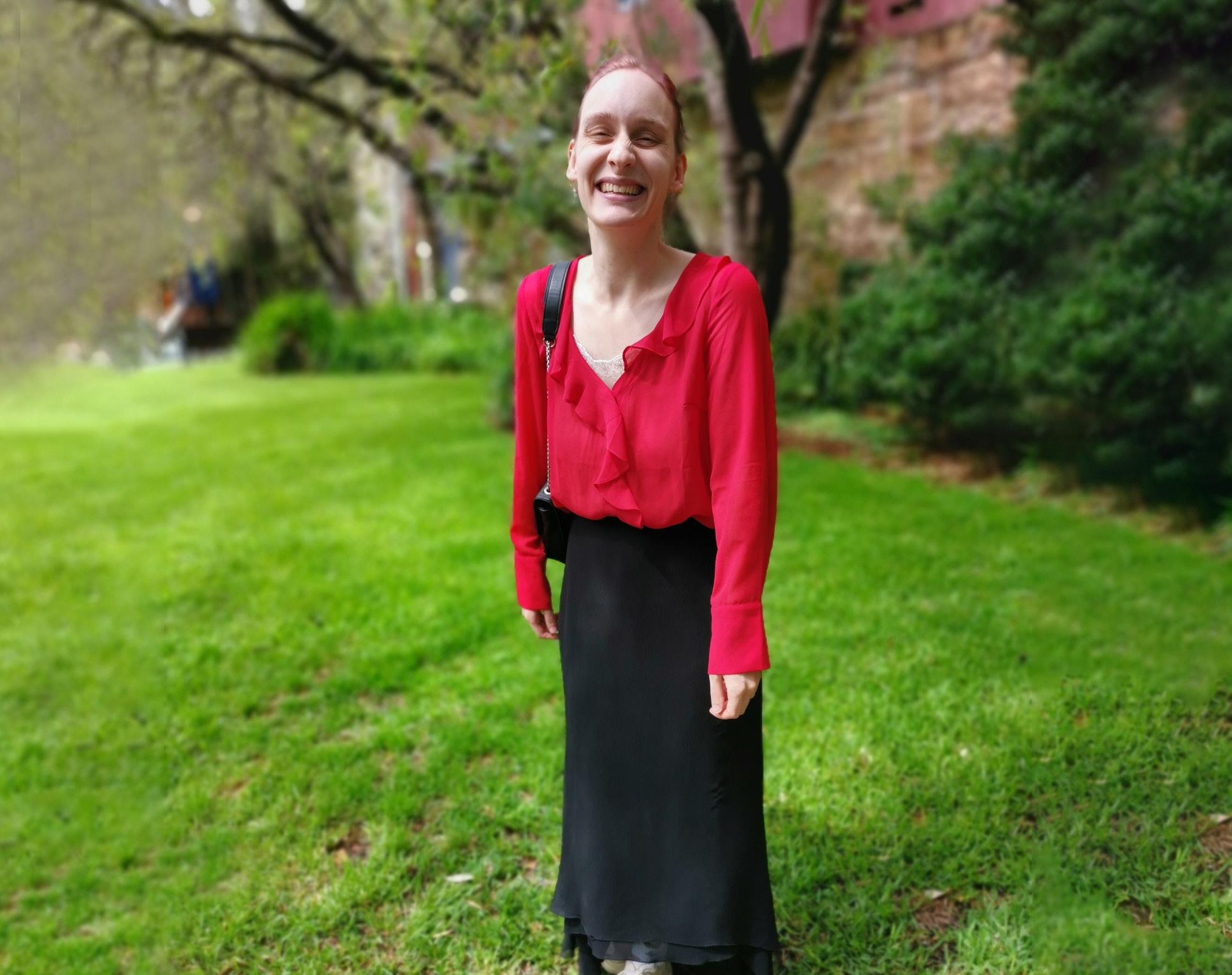
Q:What are you doing now?
I have been working for the past two years at My Care Space on The A List, a national online social platform for autistic children, teenagers, and adults to attend and review social events. I also blog for The A List about
autism-specific topics, and as an informal in-house consultant make the platform as autism-affirming as possible. The A List has been very successful and there are plans to increase provider growth nationally. Many people with autism find it challenging to form friendships and I like to guide them on this journey.
My other paid role is working at the Sylvia Rodger Academy at Autism CRC. It has developed a Self-Advocacy@ Work project that upskills members of the autistic community in co-design, product development and inclusive practices. This project will see a series of accessible multimedia tools and resources to equip and empower
Link to... Autism
April/May 2023 64
Suzanna Poredos
autistic individuals to advocate for themselves in the workplace. The online resources page will be published in late 2023.
In the past month, I have been writing a guest blog for Reframing Autism and the post will be published later this year. I am currently completing their Certificate in Autism Wellbeing for Autistics. I have my own blog, Always Angelic Aspie Alice. It has been running for just over two and a half years and discusses many autismspecific and disability-specific topics, such as suicide prevention and bullying prevention. I love writing poetry and inviting people to share their experiences on the blog and followers can put posts on the blog. In the past, I had guest writers that included people that were in my autistic circle. They wrote about different areas, such as how the Australian television program Play School is an important learning tool for autistic children. As well, I have a namesake podcast series that delves deeper into topics from my blog.
Q: Do you socialise much? Apart from your blog what other interests do you have?
I do not socialise often and tend to go to things where I do not have to communicate much. I like outdoor activities, such as scavenger hunts. Sometimes I wish I could spend more time with non-autistic people, but I also feel more secure working with people who are autistic. I wonder sometimes if working in an autistic-focused workplace is just a safe option. I had a rabbit called Francis who lived for nearly eight years. I would love to get another pet soon as animals and nature are one of my other current interests.
Issues that concern you.
People with autism have similar problems and mental health issues are one of them, not just in the autism community but in the disability community too. There are gaps when it comes to getting help, although I think the government is trying to address this. There seems to be a shortage of trained people to assist here. I have NDIS funding so I can access the right
supports for my physical disability; an accumulated back injury which still affects me nearly four years on, and for my other disability, autism. How I label and see my identities change daily. Sometimes I do not think of them as disabilities, but sometimes I do see the disability depending on different factors. I would see my injury as high needs and as a disability if I am unable to walk.
Q: What is challenging for you?
I think I place too much emphasis on the autism ‘label’ and stereotype myself to be ‘not normal’. Sometimes because of this I mask and pretend to be something else to push that away because I want to fit into situations where I do fit in. Sometimes I mask for different reasons. But I try not to pretend anymore. I find if I try and be myself then I avoid negative thoughts because if I am positive, I am more likely to get things done! My journey into autism and my injury has been at times contradicting, confusing, stressful even now amazingly insightful because of all the emotional and physical pain, and other struggles that arise from the journey thus far highlighting my appreciation of my weaknesses, and what it truly means to be grateful for days or times without pain.
Tell me about your school days?
I was bullied, particularly in high school, but nevertheless just had to survive. Teachers did nothing and pushed it under the carpet. Mostly I ignored it and went into my shell. Sometimes I would speak out to the perpetrators and ask not to be spoken to in such a horrible way. I did not know then I was autistic and while it was diagnosed eventually, I was angry about having a lost identity. Bullying is still common and whilst I do not have the answers, I know that high-quality early intervention bullying programs in schools and pre-schools may work.
Frequently, I witnessed bullying and many other emotional issues such as gaslighting and intimidation when I was working in the childhood education and care; ECEC sector. I believe it seems this led for many educators to have mental health crises and in some
cases resign from their workplace. Sometimes, it seems that the bullying was caused by some managers. This is one of the many reasons why I am no longer in the ECEC sector.
Advice for people with autism?
I think it is important to know who you are and have strong opinions about yourself to thrive in your life. Yet, I understand it might be hard to thrive. I would say get by as well, as having multiple disabilities myself means I understand the complexities of mental health. Sometimes it is okay to just get by, as sometimes it is impossible to thrive all the time.
One of the only true strategies I have is writing poetry which I love. I would like to wrap up this interview and ask what is hopefully deeply provoking and honest. For people who struggle with being unemployed or under-employed, autistic, or not, what do you do to mentally support yourself when finding and keeping a job.? For people that employ others, do you employ autistic people, and if not, why not?
Extract of poem
The following is a sample of my poem, Francis Huckleberry Rose-Bud.
I feel so free, so differently, wildly yet shamelessly liberated from the rabbit spirit that was you
Spirit glides and is somewhat still alive
But your body was laid to rest, resting, rested for ever more
Today is a new chapter to pursue what I would like to do, endless opportunities in the form of ambitious dreams await.
Where you can find Suzanna
Always Angelic Aspie Alice via Facebook https://www.facebook.com/ alwaysangelicaspiealice
The namesake podcast is available via Anchor and Spotify
https://anchor.fm/ alwaysangelicaspiealice
https://open.spotify.com/ show/5EQParDxXTAjNQkywiaCca
AUTISM linkonline.com.au 65
What I want you to know about my autism
By Wendy
Meet Wendy who has worked at the Endeavour Business Solutions site at Seven Hills for more than five years. Wendy has 28 years of lived experience with autism, which she was very happy to write about.
Once you and your family know you have autism, then you can get the right support you need at school, at work and in the community. My family didn’t treat me differently, but they found a way to support me.
4. ‘Disability’ is not a bad word. Being diagnosed with a disability is not bad. Now that I’m 28, I have not ‘overcome’ my autism, but adapted and accepted it. Autism is different for everyone. For me, having autism can be frustrating at times because I can’t articulate my emotions into words and can’t communicate that to people. As a result, I lash out at those around me. I process things differently to others. When I’m in crowded areas or when I can’t say what I want, it can lead to anxiety attacks.
Hi, my name is Wendy and I have autism spectrum disorder (ASD). There is a lot of misunderstanding about autism, and I’m hoping that these facts will help you understand.
1. People with autism are smart.
I want you to know that people with autism are smarter than you think and are talented. I am a storyteller and write fan fiction.
2. You can’t see autism.
When I meet people for the first time, they don’t know that I have a disability. When they find out I have a disability they tend to back away. This might be because they don’t understand what autism is. But I’m hoping if people understand what it is, there will be more opportunities
for people with disability.
I’m an outgoing and talkative person and have so much to share, and I want people to see me for me.
3. People with ASD need to be supported in ways unique to them.
I found school very challenging. I thought that I should be able to do whatever others could. And at the time I was not able to receive necessary additional support because I needed a doctor’s referral for extra help. I already had a language and speech impairment, and many doctors didn’t look past that.
When I was 15, I was officially diagnosed as a person with ASD. I remember my mum being relieved because she then could find a way to support me.
But over time, understanding my autism has given me self-awareness of why I behave in a particular way, and I have become resourceful by figuring out what I need to do. I have my employment coach Jess, and the team at Endeavour Foundation to thank for teaching me how to understand my emotions and how to best communicate that, as well as understand and read other people’s emotions.
5. Understanding.
My advice to parents who have found out their child has autism is to keep having fun with your kids. Be there to support them, help them understand their disability.
To all people with disability, never apologise for your disability.
Link to... Autism
April/May 2023 66
What should I do if I am on the waitlist for an autism diagnosis?
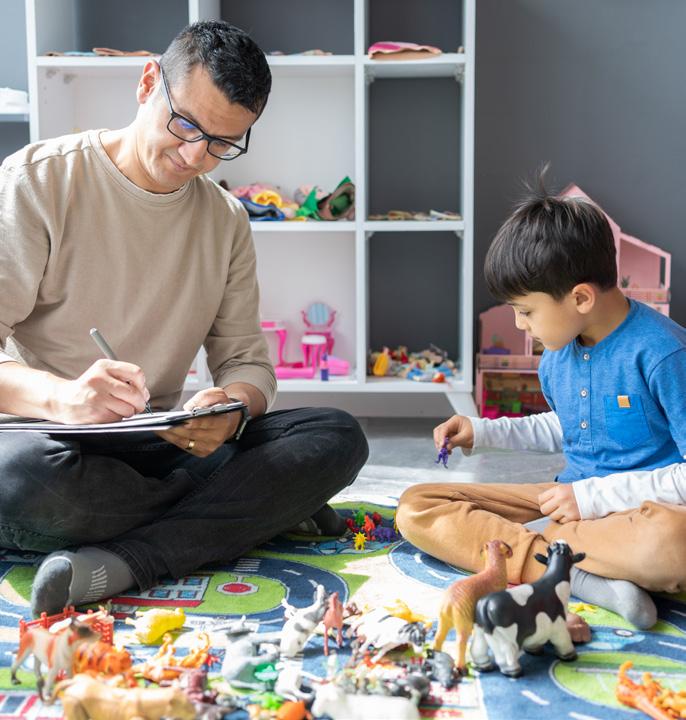 By Anita Aherne
By Anita Aherne
If your child is seeking an autism assessment or diagnosis, you are probably familiar with being on a waitlist. Waitlists can be a source of frustration and distress. It's common to find therapists with waitlists due to increased Autism awareness and the lack of qualified professionals in the industry. The Covid pandemic has exacerbated the waitlist crisis, with many practices still struggling to work through a backlog of appointment requests.
Here are some practical tips to consider while on a waitlist:
Be proactive
Make sure to add your details to multiple private and public waitlists to increase your chances of getting an earlier appointment. Then, regularly follow up with the practices to check how fast the waitlist moves and express your willingness to take last-minute cancellation appointments.
Consider expanding your search beyond your local area and adding your details to waitlists in other locations. If you can travel, this can broaden your opportunity for a shorter wait time. Remember, cancelling an appointment is more accessible than adding to existing waitlists. In addition, cancellation usually does not incur fees if done early enough.
Telehealth appointments have become a popular option for diagnostic assessments. Inquire about telehealth when adding your name to waitlists, as it may be a faster option to gain an appointment. Telehealth appointments offer the same diagnostic process as inperson appointments but are held online.
Start supports at school
While most schools are open to implementing individual learning
plans, a diagnosis may be necessary for accessing certain supports. But this shouldn’t stop you and the school from discussing ways to support your child. If your child is experiencing school refusal, discussing ways to encourage learning in a safe and supportive environment with the school is essential. Negotiating reduced school hours or alternative excursion arrangements is also possible. In addition, a school advocate can help navigate these conversations with the school. You can also use the Living on the Spectrum autism directory to find advocates in your area who can provide additional support and guidance. You do not need a diagnosis to access these supports.
Accessing your free support via your GP
Did you know that you can access up to 10 free or heavily subsidised Medicare appointments with a psychologist through the Better Access initiative with a referral from your GP? To obtain this referral, you must visit your GP, who will fill out a questionnaire and determine if you qualify for the plan. Once you have the referral, you can book a psychologist or a social worker to help your child with mental health challenges.
There are also new Medicare changes as of March 1, 2023. You can access up to eight rebated allied health sessions related to an autism assessment or complex neurodevelopment assessment. This is significant as you no longer must refer to your paediatrician to gain referrals. These allied health professionals can also liaise with your GP for multiple referrals that may be required during the assessment process. The age and eligibility for the rebates have also been increased to anyone up to 25 years of age. There are no forms to fill out, but your GP must provide a dated referral.
Reference (https://www. servicesaustralia.gov.au/educationguide-medicare-items-for-complexneurodevelopmental-disorder-andeligible-disability?context=20)
Start engaging with the community
There are many online groups and advocates you can learn from right now. Social media is a great place to start and learn from others in a similar position. It is also a great place to ask questions.
As parents and carers, we understand the complexities and stress of locating support and information. Because of the stress involved in navigating a diagnosis, it was the driving force for us in establishing the Living on the Spectrum website (www.livingonthespectrum. com). We wanted a free national autism directory that was accessible. In addition, we wanted to have one location to find services, products, and events. Because finding support and assistance should be easy. So, while waitlists are frustrating and stressful, there is no need to wait until you are diagnosed to start implementing strategies and learning more.
Anita Aherne is director and founder of Living on the Spectrum
linkonline.com.au 67 AUTISM
Early detection for autism means PEOPLE FIND THE RIGHT SUPPORT
By Professor Robyn Young
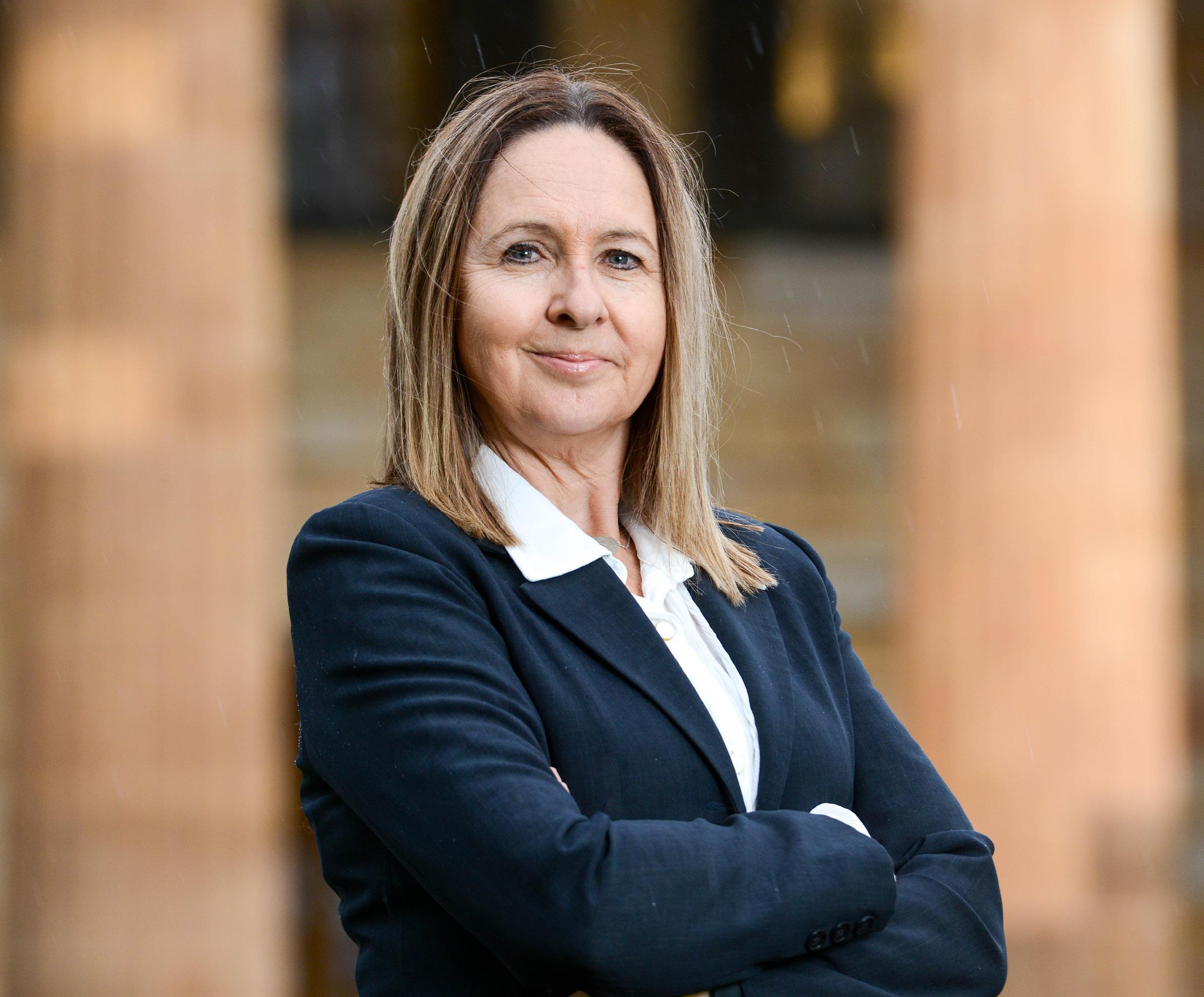
With increasing public awareness, a rising number of autism diagnoses are being made into adult years.
We have seen a dramatic shift in the data presented in autism journals and conferences, with much of the data presented being overwhelming high-
functioning adults, most of whom are females. As a result, our perception of autism has changed – not only among lay people but also in the research domain.
Link to... Autism
April/May 2023 68
ProfessorRobyn Young
It is important to note that to meet diagnostic criteria for autism, symptoms must, “cause clinically significant impairment in social, occupational, or other important areas of current functioning” (APA, 2022).
To diagnose and provide support to autistic people does not mean undermining their value.
It is hoped that proper diagnoses and support will minimise the “impairment” in functioning, that by definition, they must be experiencing to receive this diagnosis.
There is a strong link between age of diagnosis and outcome
Non-autistic researchers, of which I am one, fear being “cancelled” when they dare mention words such as intervention or even diagnoses. Yet it is important to note that between 18 per cent and 48 per cent of autistic people are not the higher functioning members of the community that we see advocating for themselves and opposing terms such as intervention and treatment. Instead, many autistic people have intellectual disabilities or language impairments and need support and treatment.
A recent 53-page report, chaired by Catherine Lord and Tony Charman, involving autistic and non-autistic stakeholders, suggested a return to terms such as “profound autism” to reflect those autistic people who needed significant intervention. While some have argued that this may strip autistic people of their dignity, others argue that it is required to combat the neurodiversity movement and get adequate support for their children.
There is a strong link between age of diagnosis and outcome. Yet this is confounded by a link between impairment and age. It is important to diagnose or at least recognise early to ensure the best outcome and support for people with autism, who when showing signs very early, are often the most impacted.
Further, given people with intellectual disabilities, language delays, (Flackhill et al., 2017) other neurological impairments or even those who have experienced trauma (Davidson et al., 2022;), may present with behaviours that intersect with autism, we need to be sure that the diagnosis is correct to ensure appropriate support and sometimes treatment is provided.
Often people who do not obtain a timely and accurate diagnosis go on to develop co-occurring, behavioural or mental health issues which can compound and complicate their health, wellbeing and personal independence.
Consistent with the National Guideline for the Assessment and Diagnosis of Autism Spectrum Disorders, we have worked to develop accurate, clear and consistent early detection and diagnosis to ensure that individuals and their families receive the best possible support and education. Early identification enables support to be appropriate and target the needs to the child.
Validated screening tools can be useful in assisting practitioners to decide if a child’s early developmental behaviours are likely the result of autism or the result of trauma (Radecki et al., 2011; Shulman et al., 2020).
developed an easy-to-follow online screening tool known as Autism Detection in Early Childhood - Virtual administration (ADEC-V) which can be used for children as young as 12 months. We hope that early identification and subsequent diagnoses will enable families to access resources. Further, consistent with the new ‘Supporting Autistic Children Guidelines’ they will access evidence based clinical practice and support.
The ADEC-2 and the ADEC-V are now available through the Australian Council for Educational Research.
The ADEC-V is delivered to the client within their own home. Clinician and client meet via a video conferencing platform. The clinician provides instructions to the parent according to the ADEC-V protocol, allowing the parent and child to interact as instructed, while the clinician observes virtually.
Overall, our data show that ADEC-V could be used as a valid and reliable screening tool for autism in young children.
Many older Australians are now going online and finding ways to selfdiagnose and then negotiate the best support and health services.
The delay in diagnosis or even misdiagnosis means that they have not received the support they may need or may have developed maladaptive coping skills or co-occurring conditions such as depression and anxiety.
child.
The Autism Detection in Early Childhood, Second Edition (ADEC-2) developed at Flinders University is a popular screening tool for autism in toddlers that has shown the ability to discriminate between autism and developmental delays (Nah et al., 2014).
Our current research, which includes researchers with lived experiences is aimed at making early detection, which is accessible, efficient and cost-effective.
Together with interstate and international colleagues, we have
Based on Australian Bureau of Statistics data, it is estimated that $40,000-$50,000 spent on informed interventions can stave off lifetime costs upwards of $2 million in healthcare and other support per person.
Professor Robyn Young is a Flinders University academic and clinical psychologist who has worked in autism for more than 30 years.
Preliminary Validation and Feasibility of the Autism Detection in Early Childhood-Virtual (ADEC-V) for Autism Telehealth Evaluations in a Hospital Setting - PubMed (nih.gov)
Early identification enables support to be appropriate and target the needs to the
AUTISM linkonline.com.au 69
‘Self-care for caregivers: putting your mask on first before assisting others’
Caring for an autistic person, whether your child, sibling or someone else, can feel like a full-time job, one that’s often undertaken alongside endless other commitments. Between juggling multiple therapy appointments and constantly advocating for another person’s needs, dedicating enough energy to your own self-care often becomes an afterthought. And although we all understand the importance of putting your mask on before helping others in theory, it’s rare that carers can find the time and resources to appropriately support themselves, even when it matters the most.
The stress that carers experience can be exacerbated by a range of factors. Money and career sacrifices, changes to your relationship with your partner or spouse and unsupportive people in your family or community can all take an emotional toll. And if you’re caring for someone who has recently received an autism diagnosis, it may take a while to adjust, regardless of how unexpected that diagnosis was.
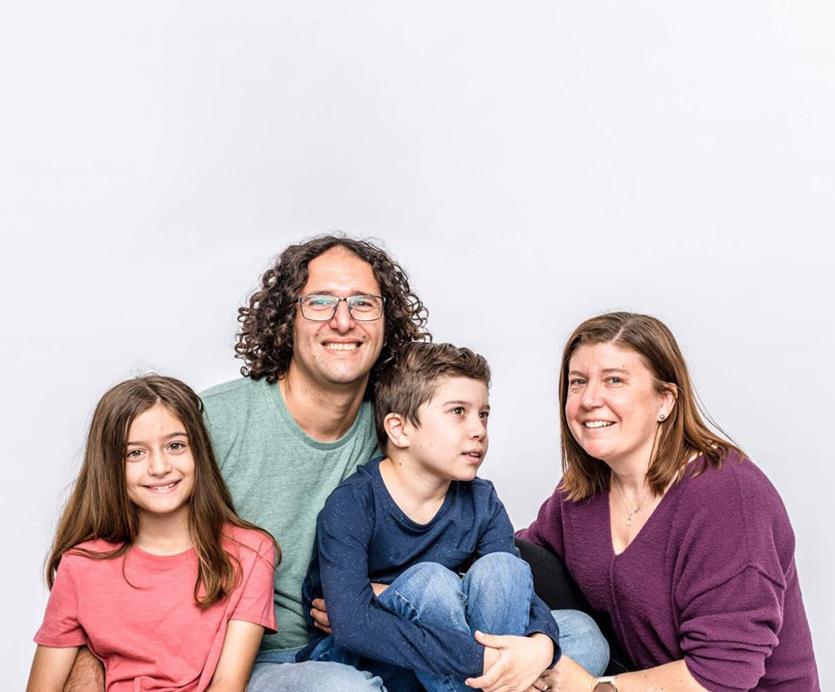
But how do you put your mask on first before helping others?
The first step is to acknowledge that looking after yourself is one of the hardest things a carer has to do. Many unfortunate stereotypes perpetuate the myth that self-care is a mindless and simple practice indulged in by self-centred people, a direct conflict with the empathetic and selfless nature carers have. But this couldn’t be further from the truth. Effective self-care requires a strong understanding of your needs, and in the long-term, make you a better advocate for yourself and others.
Self-care relates to all aspects of our lives, meaning the more areas of your wellbeing you can address, the better.
If you’re just beginning to think about self-care, you might like to focus deeply on one area before considering others. Here are some of our tips to help you get started:
Physical wellbeing
• Get enough sleep as often as you can and consistently.
• Eat healthy meals. Planning your meals in advance or ordering healthy meal kits could help.
• Get plenty of exercise. This could be done individually, or you could join a gym, class or community group to help stay motivated.
Emotional/mental wellbeing
• Talk about your feelings and experiences often. This could be informally with a partner or friend, or with a health professional, whoever is able to meet your needs.
• Learn and practice mindfulness techniques.
• Consider joining a support group for carers.
Perhaps the most important takeaway is that something is always better than nothing. Don’t have time to exercise for an hour? Exercise for 10 minutes. Don’t have time to grab coffee with your friend? Set aside time to call or text them. Although the many forms of selfcare can initially seem overwhelming, they also mean there’s something out there that everyone can do, and on their own terms.
Caregiving isn’t an easy job, but it’s much easier when you take care of yourself.
Visit: www.autismwhatnext.com. au to check out more tips for looking after yourself and links to professional support for carers.

Link to... Autism April/May 2023 70
Autism disclosure: how can we do better?
By Chris Edwards
Autism disclosure is the focus of major new research study by the Aspect Research Centre for Autism Practice (ARCAP). The study provides a comprehensive insight into the many thought processes autistic adults go through, when deciding whether or not to share their autism diagnosis/identity.
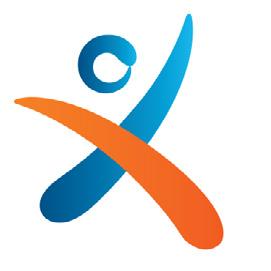
There has been a simplistic view that ‘blanket disclosure’ is the best option, and while sharing your identity can be liberating and powerful, our research shows it is not always the best path and can expose the autistic person to risk of discrimination and bullying.
Either way, it is clear that the decision to disclose is complex and can lead to a variety of reactions.
Our study documented 231 disclosure experiences of 36 autistic adults, aged 21 to 71, using a specially designed smart-phone application, in a range of environments.
We identified the workplace as the most common environment for disclosure by autistic adults (31 per cent), followed by the community (21 per cent), education settings (11 per cent), home (11 per cent), healthcare (9 per cent) and retail (6 per cent).
It is quite significant that during the study 153 opportunities were categorised as disclosure, where the participant shared they were autistic and 78 opportunities were labelled non-disclosure, where the participant felt there was an opportunity, but decided not to share.
What are the most common reactions that follow a disclosure?
Workplaces, healthcare, education and community settings need to adapt to allow autistic people to be
their authentic selves – words, body language and reactions matter.
Here are some quotes from research participants that demonstrate the wide range of disclosure experiences, grouped under whether they felt it was a positive or negative experience for them.
Negative:
• “My former boss … she didn’t really acknowledge it and just kind of ended the text exchange”
• “Didn’t look like they cared”
• “No reaction, none, zero. Was not acknowledged”
• “The person seemed to somewhat dismiss what I had said”
• “Angry and took it personal… they were offensive when I told them that I was saddened by their response to my disclosing”
• “Ignored my disclosure.”
Positive:
• Their reaction looked “happy and understanding…I felt included”
• They “wanted to know more about autism”
• “He didn’t treat me different and if anything he thought it was cool”
• “The person was joyful as her son was on the spectrum and my story gave her hope”
• “She was happy because she had
just disclosed her autism to me.”
• “Origami club… I disclosed while sitting next to a new kid and he looked surprised and said ‘I’m autistic too’”
• “Very understanding and interested in being educated about it”
• “She seemed genuinely empathetic. I felt heard and understood.”
How do I respond if someone discloses to me?
For people on the receiving end of disclosure, it is important to recognise that this can be a daunting moment and it may mean your colleague, client, friend or family member trusts you with this information.
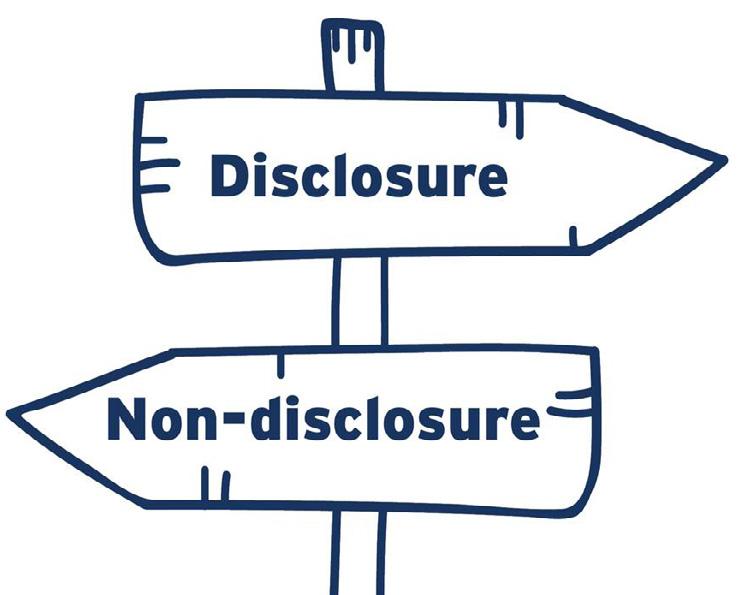
For those working in a carer role, a diagnosis of an additional disability might be surprising. Providing the right support when someone tells you they are autistic is crucial to their sense of self. Believe them, accept them, they are still the same person as before.
Society has a long way to go before blanket disclosure becomes acceptable, and until that day, autistic people and non-autistic people require the skills to evaluate and positively receive a disclosure.
A series of practical evidence-informed resource guides has been developed utilising data from this research study. The guides support autistic people in their disclosure experiences and provides helpful advice on how to receive a disclosure for colleagues, employers, friends, educators and family. They can be downloaded here: https://www.autismspectrum.org. au/about-autism/our-research/ourresearch-program/disclosure
Chris Edwards, postdoctoral researcher at The Aspect Research Centre for Autism Practice (ARCAP)
AUTISM linkonline.com.au 71
Our image of autism is changing and that is good
By Dr Olivia Karaolis
The new national guideline for the support of children on the spectrum and their shift in focus from diagnosis to therapy and support is a cause for celebration.
T his version is aligned to the intention of a diagnosis. When I first started teaching children in their first year of school, I was assured that a diagnosis was “a passport to services”. Yet for many families, this “passport” was difficult to acquire, and the services focused much more on “changing” or “correcting” the deficits associated with autism. Many young children were participating in extensive therapy outside of school, and other children were not eligible for services to support their communication and physical or emotional autonomy. Parents were ‘told’ what their child needed to develop and the skills they needed to learn.
T he guideline reflects a change in this thinking, is child centred and respects the individual needs of every child. For too long our response has been a one size fits all approach to supporting children and families.
The guideline speak to the image of the child that I see inform the model of supported playgroups and best practice in early childhood education. Supported playgroups are facilitated groups specifically for children aged 0-6 years for a range of purposes, they may be for children with a disability or who speak English as an additional language. Often many families are waiting for a diagnosis and are unsure how to respond to their child and their unique ways of playing, communicating, and responding to the world. Through conversations with other families, the playgroup facilitator and guest speakers, parents and caregivers learn
On campus at La Trobe
The La Trobe University Community Children’s Centre at Bundoora, Melbourne offers education and care for children from six weeks to six years. Among its services is the Autism Specific Early Learning & Care Centre (ASELCC) said to be the only centre of its kind to be located on a university campus.
“We run programs for nursery, toddlers aged 2-3 years and kindergarten for children 3-4 years,” director Kristy Capes told Link. Its focus on early childhood outcomes has resulted in one of the largest data bases on early childhood development, from research outcomes collected from the six ASELCCs nationally over the past 11 years.
A s well as occupational therapists, there are psychologists and speech pathologists on staff who work in
partnership with the education and research teams.
The Centre has adapted the Early Start Denver Model, working with developers to successfully incorporate this into its long daycare program, applying it to a group of children rather than a one-on-one service delivery model. It is the only centre in Australia certified in group delivery of this program.
“ We did research on the efficacy of the early group setting of the Denver model that is play-based, embedded in everyday routines, and found it has a positive effect on child development as a whole,” Capes said. “We concentrate on all areas of development such as play, communication and growth. It is a very comprehensive child-centred model and supportive of development across all areas.”
about the many approaches that may be helpful to them and their child. They are introduced to new ways of playing and an opportunity to share their concerns. The informal nature of a playgroup is part of its power and often individuals will feel more relaxed and comfortable in their interactions with others. It is a natural setting- less clinical and one that is welcoming.
A s highlighted in the guideline, playgroups seek to empower parents and create an opportunity for them to support their child. The playgroups are inclusive and value everyone’s voice. It is wonderful to see this change in the way we view disability and the valuable resources that we all bring to the lives of young children.
Social Work.
Autism Acceptance Month will be celebrated across all age groups and education programs with attention on helping children to understand and celebrate differences and the neurodiversity movement, continuing its focus around inclusive practice and how to best support the inclusion and participation of all children.
According to clinical manager, Carolyne Jones there is a fulltime researcher in the ASELCC, employed by La Trobe’s Olga Tennison Autism Research Centre, who assesses children when they start and what fine motor skills they have gained in a year and whether a specific program is warranted. “We do the same assessment 12 months later to evaluate the yearly learning and track any changes that have occurred that gives us an objective measure of their progress,” she said.
Link to... Autism April/May 2023 72
D r Olivia Karaolis lectures at Sydney University Faculty of Education &
Why our autistic children are struggling with School Can’t
By Anita Aherne
School Can’t has been in the news lately, for a good reason. Our kids deserve an education. However, for many, attending school presents challenges.
School Can’t, also known as School Refusal, occurs when a child feels overwhelmed and stressed by the school to the point that attending becomes challenging. It is now recognised that this is not a voluntary decision for many children, as it is often caused by excessive sensory overload, anxiety, and stress. In such cases, the traditional on-site educational setting is no longer a safe and healthy environment for these children's mental well-being.
What is School Can’t
Jill Sewell, the Centre for Community Child Health deputy director at Royal Children's Hospital Melbourne, defines "school refusal" as difficulty attending school due to emotional distress, including refusal to attend or remain in school for the entire day. This condition affects 1-5 per cent of all school children, with peaks at ages 5-7, 11 and 14. It occurs across all socioeconomic groups and equally among boys and girls.
"School refusal" or “School Can’t” can also describe absenteeism based on its timeline. For example, the selfcorrective School Can't behaviour refers to absenteeism that resolves spontaneously within two weeks. Acute refusal behaviour lasts from two weeks to one year, and chronic refusal behaviour lasts longer than one year. The longer the chronicity, the more challenging it is to reintroduce the child to school.
Why can’t our kids attend school?
There are many reasons why autistic kids struggle with attending school. It is a complex issue that varies for
each student. However, there are a few underlying issues shared amongst autistic students.
Sensory processing disorder
For autistic children, school environments are often unsuitable. As a result, many aspects of a typical school day, such as loud school buzzers and bells, fluorescent lighting, noisy children, and echoing gyms, can be overwhelming for autistic children. These sensory stimuli can trigger extreme anxiety and stress. Because of this, you leave your autistic child unable to learn and even attend school.
distinguish between playful teasing and bullying or to identify sarcasm from factual statements. This can leave your autistic child feeling unsafe and socially isolated.
Learning styles
It is commonly recognised that people learn in different ways. Our education system must recognise this and make reasonable adjustments based on each student’s needs. Unfortunately, this is not always the case. Hence students find attending school almost impossible, and School Can’t can become a chronic issue if learning styles are not adequately addressed.
What can we do?
The effort to deal and cope
with
all these stimuli is just too much for an autistic student, and learning becomes impossible.
Social communication
Many autistic students struggle with communication and navigating friendships. In school, social interactions are abundant and constantly changing. Additionally, what is appropriate in the classroom may be inappropriate in other areas, such as hallways, gyms, or playgrounds. Autistic children may struggle to identify social cues that signal when to modify their behaviours.
Furthermore, due to their deficits in verbal communication skills, it can be challenging for autistic children to
In Australia, every child has the right to an education. But what does this mean? The Disability and Standards for Education 2005 is quite clear. Students with a disability must have opportunities and choices comparable to those offered to students without disabilities. This applies to, admission or enrolment in an institution, participation in courses or programs and use of facilities and services.
The standards clarify the obligations of education and training providers and the rights of people with a disability under the Discrimination Act 1992 (DDA).
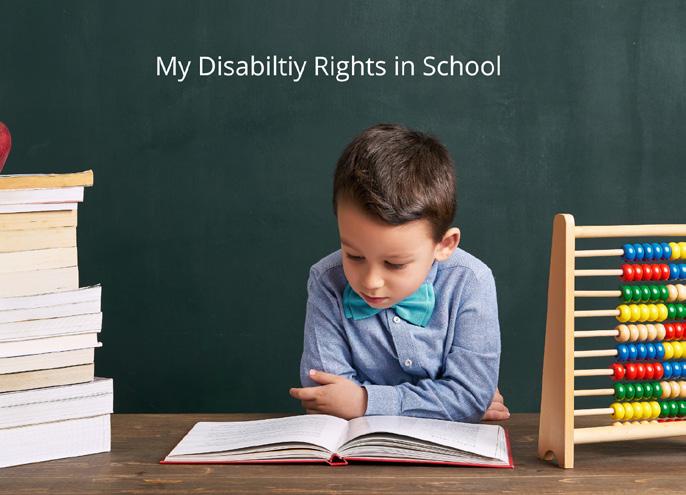
While legally, our children have rights, it is ultimately up to us as parents and carers to continue to advocate for our child’s rights while we support our autistic children if they Schools Can’t.
https://www.livingonthespectrum. com/education/what-are-reasonableadjustments-in-school-for-my-childwho-has-a-disability/
AUTISM linkonline.com.au 73
Anita Aherne is founder and director of Living on the Spectrum
NDIS reforms put forward for aged-care sector
By Dr Libby Callaway
Around 1 in 6 (18 per cent) of people in Australia, or about 4.4 million, have disability1 and the prevalence of disability generally increases with age, with 50 per cent aged 65 and over experiencing disability2. Whilst Australia’s National Disability Insurance Scheme (NDIS)3 is available for Australians who experience significant and permanent disability and are aged under 65 years at the time of scheme entry, there are many Australians who aren’t eligible for the NDIS but still have a need for support, including assistive technology and home modifications.
For Australians aged over 65 years, some funding is available through Australia’s in-home aged care programs, including the Commonwealth Home Support Program, the Home Care Packages Program and the Short-Term Restorative Care Program. However, these will soon be replaced by a reformed in-home aged care program, in response to recommendations stemming from the Royal Commission into Aged Care Quality and Safety4
As part of these proposed aged care reforms, on December 21, 2022, the Commonwealth Government Department of Health released a discussion document on a proposed new Assistive Technology and Home Modifications Program for In-home Aged Care for Older Australians 5 These changes will be of interest to many Australians, given they are likely to affect them, or their family members, for years to come.
As the peak body for AT stakeholders in Australia, the Australian Rehabilitation and Assistive Technology Association (ARATA)6 has been contributing to consultations on this reform work, with the aim to reduce the inequities that exist for some
Australians7, particularly those with disability who have AT and home modification needs and are not eligible for the NDIS.
The Department of Health has run various co-design workshops with consumers, providers and peak bodies in 2022, which ARATA contributed to. This year, further workshops will focus on engagement of Aboriginal and Torres Strait Islander and other Culturally and Linguistically Diverse groups, as well as stakeholders in regional and remote areas, as part of scheme design. The government also propose to develop a program assistive products list, and are considering a national AT technology loan program, with a design yet to be released. Such a program will require close consideration based on past learning from state-wide AT loan schemes, and to determine the cost effectiveness of this approach in a national context8. It is also important that any such program is designed with consideration of the good practice steps of AT service provision, including both a safe and
fit-for-purpose product, as well as ‘wrap around’ advisory services to ensure the AT is customised to the person’s needs, and effective in its use9
After the monumental disability reforms now rolled out nationally via the NDIS, Australians need to understand, and can actively contribute to, this next major reform of in-home aged care programs. For ongoing updates regarding the aged care reforms underway, go to https://www.health. gov.au/our-work/aged-care-reforms
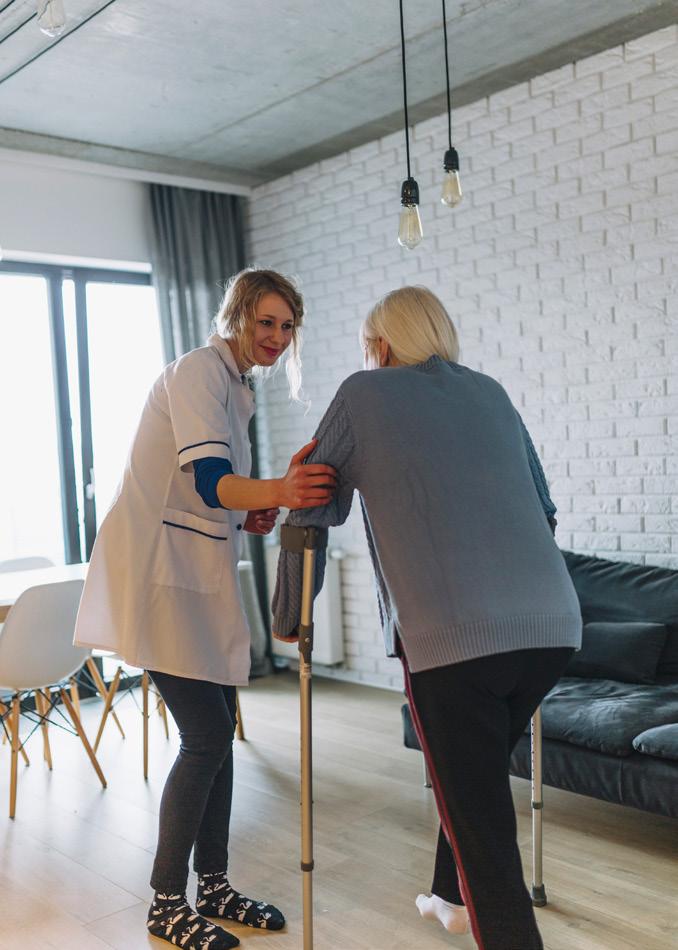
1. https://www.aihw.gov.au/reports/ disability/people-with-disabilityin-australia/contents/people-withdisability/prevalence-of-disability
2. https://www.abs.gov.au/statistics/ health/disability/disability-ageingand-carers-australia-summaryfindings/latest-release
3. https://www.ndis.gov.au/applyingaccess-ndis/am-i-eligible
4. https://agedcare.royalcommission. gov.au/
5. https://www.health.gov.au/ resources/publications/assistivetechnologies-and-homemodifications-scheme-for-in-homeaged-care?language=en
6. https://www.arata.org.au/
7. https://assistivetechforall.org.au/ wp-content/uploads/2022/10/ Australian_AT_Equity_Studies_ Report-final.pdf
8. https://www.health.gov.au/sites/ default/files/documents/2021/01/ review-of-assistive-technologyprograms-in-australia-final-report. pdf
9. https://www.arata.org.au/public/33/ files/Publications/ARATA_ StatementOnGoodPractice.pdf
Dr Libby Callaway is associate professor, RAIL Research Centre & Occupational Therapy Department, Monash University and ARATA president.
Link to... Assistive Technology April/May 2023 74
Travelling at your leisure with your assistance companion
Living their mission of providing accessible travel for all, the team at Leisure Options strives to provide enjoyable, immersive and memorable holiday experiences to travelers that require some level of companionship, assistance and support during their travels.
Whilst the travel crew at Leisure Options take pride in providing industry leading supported holiday experiences, sometimes they do need some help from some equally hardworking assistance animals whilst on tour.
Some members of the Leisure Options travel family find their lives enhanced by the support of their assistance or service animal and the team are all adept at ensuring that your furry companion can safely travel with you while still being able to perform their valuable support duties.
If a service or assistance animal plays an important role in your daily life and you are considering the holiday options available to you our experienced, compassionate travel coordinators are here to help you achieve your travel goals. Travelers with assistance animals are welcome to join a suitable group holiday departure or the team can help you create the perfect holiday getaway designed specially for you to your dream destination.
The team at Leisure Options will help you select the most suitable holiday option that suits your needs and will explain any considerations required when bringing your support animal along.
You will be matched with fellow travelers that respect the role that your assistance animal undertakes. In most cases your travel companions are genuinely thrilled to have an animal
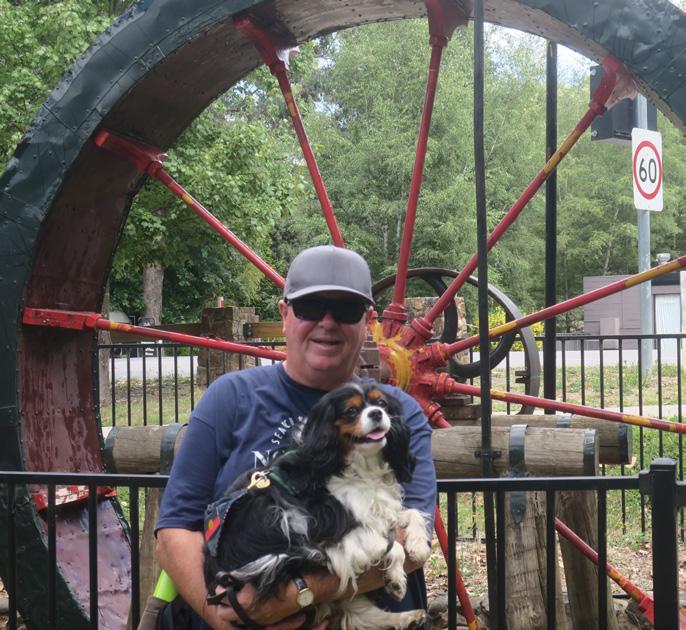
joining them on tour and the tour staff are always on hand to ensure your dog is not hindered in performing their role.
To explore the many exciting holiday options available for your next dream holiday or relaxing getaway contact Leisure Options on: 03 9646 0666 or: mail@leisureoptions.com.au
Great holidays and travel for people with disabilities
With more than 30 years’ experience in both the travel and disability industries, Leisure Options is Australia’s only national award-winning, accredited travel agent specialising in supported travel for the disability sector.


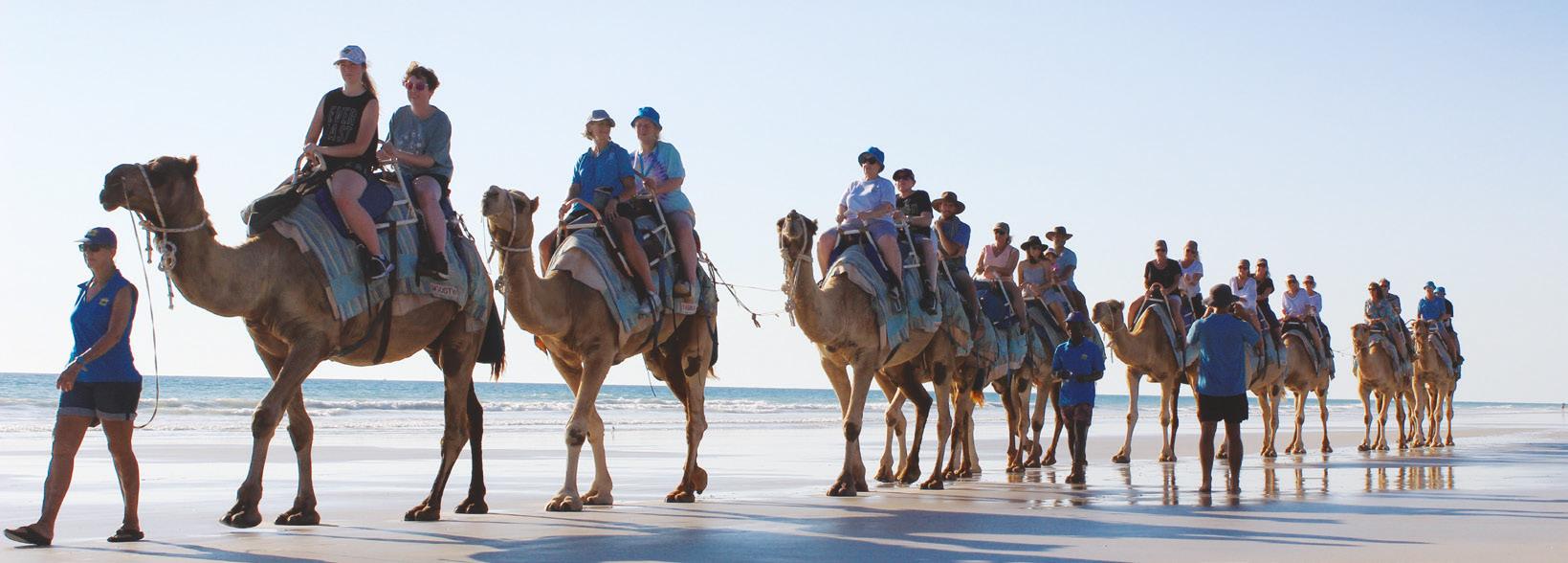
• Focus on providing holidays that allow maximum choice, loads of fun, high staffing ratios, commitment to individual needs, and a supportive holiday environment

Choice of either group or individualised touring
Respite care offered in a stimulating and fun-filled environment
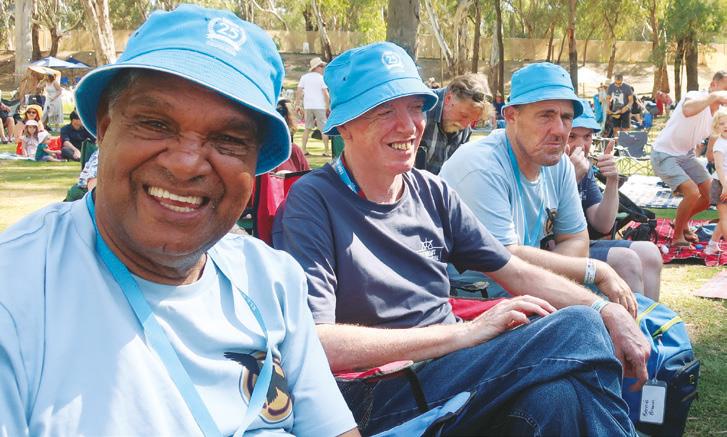
Over 80 departures annually to local, national and international destinations
• Passionate, energetic, and professional tour leaders with extensive qualifications and a world of experience
Registered service provider with the NDIS
We support the

For more information call 1300 363 713 or visit our website www.leisureoptions.com.au

linkonline.com.au 75
TRAVEL
& LEISURE
Stephen with Abby
The Circadian Orchestra
By Tommy Trout
What if I told you there was one underlying principle to human health that when in rhythm has you jumping out of bed every morning, full of pep during the day and falling asleep with ease.
It's called the circadian rhythm and it is the most important function of the body. Why? Well, because it’s all the functions of your body.
Think of it like an orchestra, and the circadian rhythm like the conductor. Without the conductor, the instruments just make noise or none and it’s a mess. The conductor has them in sync, playing when they are supposed to play. Harmony.
Like an orchestra your body has a ton of processes like digesting food, sleeping, being active as well as internal processes you don’t tend to notice during your day. But they are happening. All of them are needed to live and experience wellbeing, which is why if you don’t sleep well one night you feel bad the next day. You tend to eat more, maybe not be in the best mood or feel particularly sharp
mentally. One bad night of sleep and all these other functions suffer. Your body is out of rhythm.
So, how do you get your body into rhythm? How do we conduct the orchestra? Easy. Routine.
Your body runs on a 24-hour clock, your circadian clock. And every 24 hours your body restarts its processes, like getting sleepy at night or hungry at lunch. These aren’t by coincidence. Your body is a prediction machine, and like a violinist waiting to hit a note your body times its processes.
An example: If you eat breakfast every day at 8am, within a week you are getting hungry at 8am. Because
What’s On Calendar
APRIL:
April 21-22: Melbourne Disability Connection Expo
Melbourne Convention & Exhibition Centre www.dacexpo.com.au/melb
April 29: Wellbeing for Polio Survivors and Carers Seminar
Darebin Arts & Entertainment Centre, Melbourne https://www.trybooking.com/events/ landing/1024504
MAY:
May 12-13: Hunter Disability Expo
Newcastle Entertainment Centre. www.hunterdisabilityexpo.com.au
May 17: International Virtual Conference on Special Needs Sydney https://waset.org
May 31- June 1: ATSA Independent Living Expo
Claremont Showground, Perth www.atsaindependentlivingexpo. com.au
your body is expecting food and is even starting to prepare the digestive tract, aka, tummy rumbling and even salivating. If you go to bed every night at 10pm before long you will get sleepy around then.
Setting a routine with food, sleep, exercise and work can have huge benefits for your health and have your body running more efficiently. So here are some quick ways to get your body in rhythm.
1. Set a sleep schedule, preferably within the recommended 7-9 hour range.
2. Within an hour of waking up, go outside and get some natural lightsets the circadian clock.
3. Exercise is always good. But better in the morning and as an added bonus over time you will wake up early as your body predicts exercise in the morning, so it will have energy ready to burn.
Routine isn’t sexy, but it sure is healthy.
Together, WeFlex. PH: 1300 933 539 or hello@weflex.com.au or www.weflex.com.au
JUNE:
June 6: Australian Network on Disability National Conference
International Convention Centre Sydney info@and.org.au
June 16-17: Sydney Disability Connection Expo
International Convention Centre Sydney www.eventbrite.com.au
June 21: OT Australia National Conference
Cairns Convention Centre https://www.otausevents.com.au/ otaus2023/contact
Link to... Travel, Leisure & Wellbeing
April/May 2023 76
Helen is Still a ‘Dancing Queen’ At Heart
She writes about how the Luggie scooter gave her back her life.
Hi Glen [Scooters store manager],
Me and that scooter were joined at the hip from the time you showed it to me. The pic was taken at the Abba Festival in Trundle shortly after I got it. We went to Parkes and Cowra and saw the Japanese gardens. I went on a bus trip with friends and the driver happily took the scooter plus my walker, so I had no mobility issues.

I would not have been able to go there if I did not have my scooter. As a person with multiple sclerosis my mobility was limited until I saw the Luggie and my world opened up.
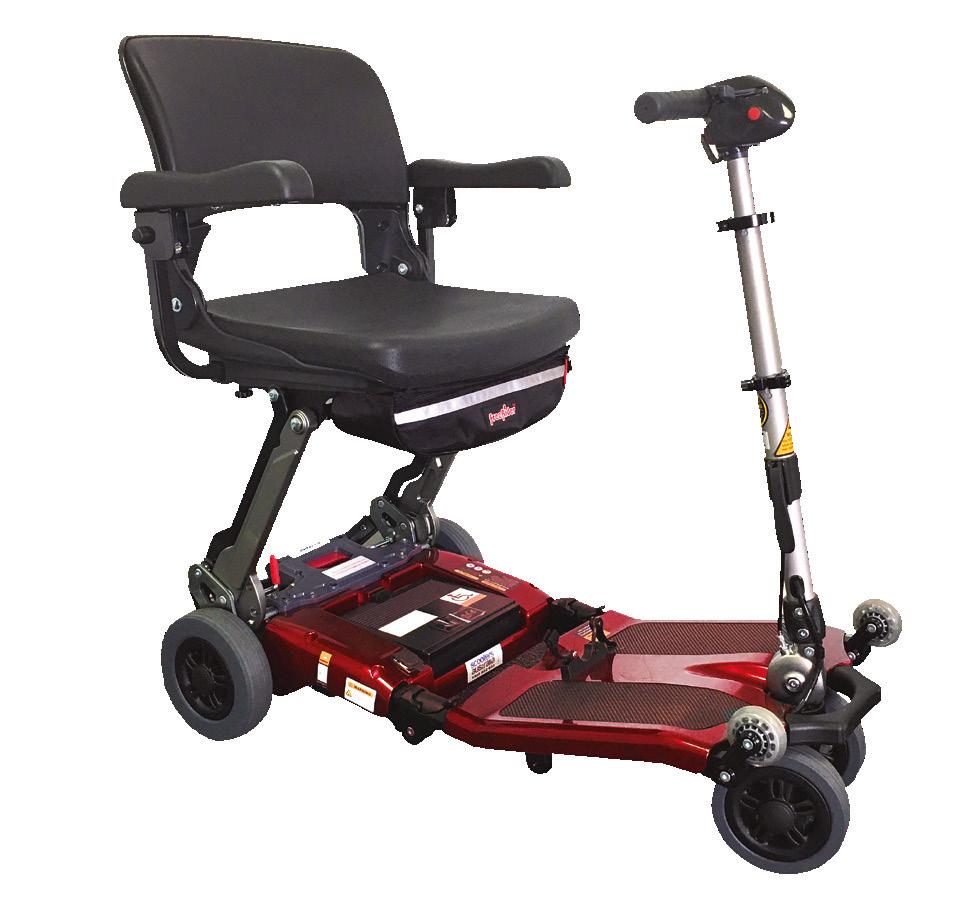
I ride it to the shops or put it in the car and can unload it myself as you showed me. I have a great time catching up with friends with a coffee or lunch. I am loving my freedom getting around the centre to do my shopping. I hated having to wait until someone was free to take me.
The aim of a mobility device is to give back a person’s freedom. For many, that means going to the shops or work. For others it’s more extravagant: travel and cruises. For Helen, it meant a bus trip through the country. Including a stopover at an Abba festival!
I followed all instructions and I know it read ‘unsuitable for grass,’ but did not have a choice at the festival. I made sure to go slowly and it managed OK.

Have no idea how this guy, pictured, survived in that outfit. It was freezing cold! He came up behind me flapping that thing and gave me a shock. Despite the weather it was a fabulous trip.
Thanks for everything, Helen
Helen's story is unique to her. She has that in common with the thousands of other Luggie success stories across the country.
Scooters Australia is importer for the Luggie scooter. More info at: www.scootersaus.com.au
linkonline.com.au 77 Online sales & free delivery* 1300 622 633 www.scootersAus.com.au SCA34716 Unfold and Go PREMIUM FOLDING SCOOTERS …see Australia *Conditions apply
TRAVEL & LEISURE
A diverse community-based facility
There’s no pain; instead, laughter and friendly chat as you exercise.
How? The answer is our unique, power-assisted rehabilitation machines. They help you exercise and move with ease to help you start achieving your individual goals.
When you experience Easy Exercising, you will find integrity, courage, respect and understanding.
You can rely on our service, knowledge and experience. At Easy Exercising, we really listen and want to get to know you. We are here to help you plan your future and are passionate about helping to create a brighter future.
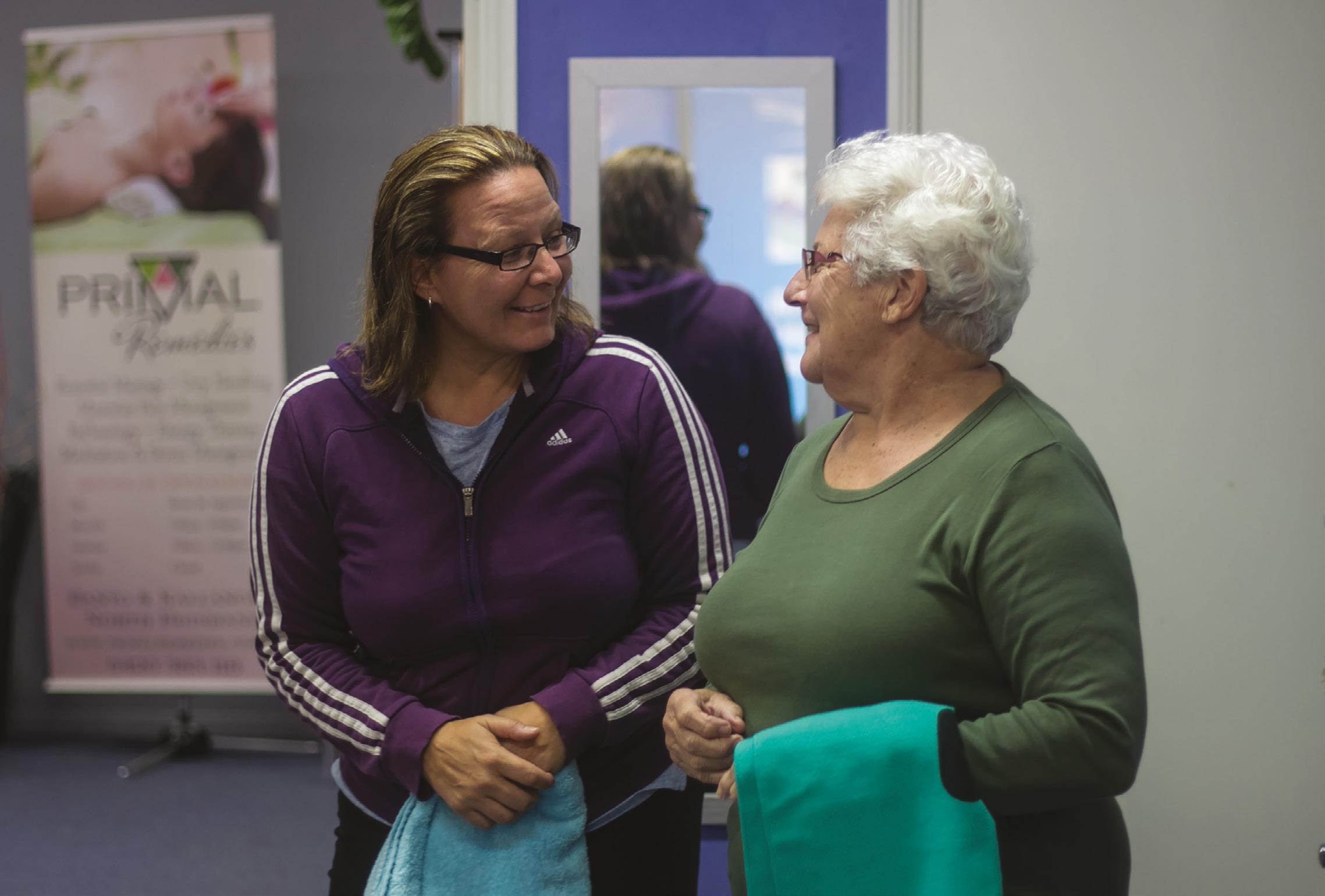
We supervise each participant to ensure you are exercising in the correct position, using the muscles without putting pressure on the joints with a controlled method of combining positioning and exercising.
Sounds too good to be true? We would like to invite you to come along, have a FREE trial session at your closest Easy Exercising clinic.
Your free trial session will help you understand how the power-assisted machines work and also help you get a sense of the close-knit community that we foster.
You will be safe and will not be intimidated, with no judgement and be with the same like-minded people.
You won’t be forced into any program, just offered solutions with guaranteed results.
Here’s what Donna said after starting at Easy Exercising: “I am suffering with multiple sclerosis and my movement has been restricted, but after a couple of weeks I am starting to move better even getting out of the car more easily. Other clients also help motivate me
with encouragement as they can see my progress. I look forward to attending to meet new people and have fun while exercising. It truly is gentle which makes my program even better.”
Another comments from Maureen who said: “It’s improved my muscle strength after years of health issues”.
Easy Exercising have a number of locations in Brisbane/South-east Queensland and plan to open more across Australia. Find your nearest location at our website.
Visit: easyexercising.com.au to book a free trial session at your nearest clinic.
NOTE: We also provide opportunities for respite care with a difference, via our weekends away with participants. Please register your interest in those trips at:
https://easycommunityservices.com
Link to... Travel, Leisure & Wellbeing
community.
Exercise with ease and enjoy a close-knit
Scan the QR and mention code: EASY to book your free trial session now!
NDIA REGISTERED
April/May 2023 78
Onyx – a jewel of a dog for a PROGRAM IN DEMAND
What does it take to become a therapy dog?
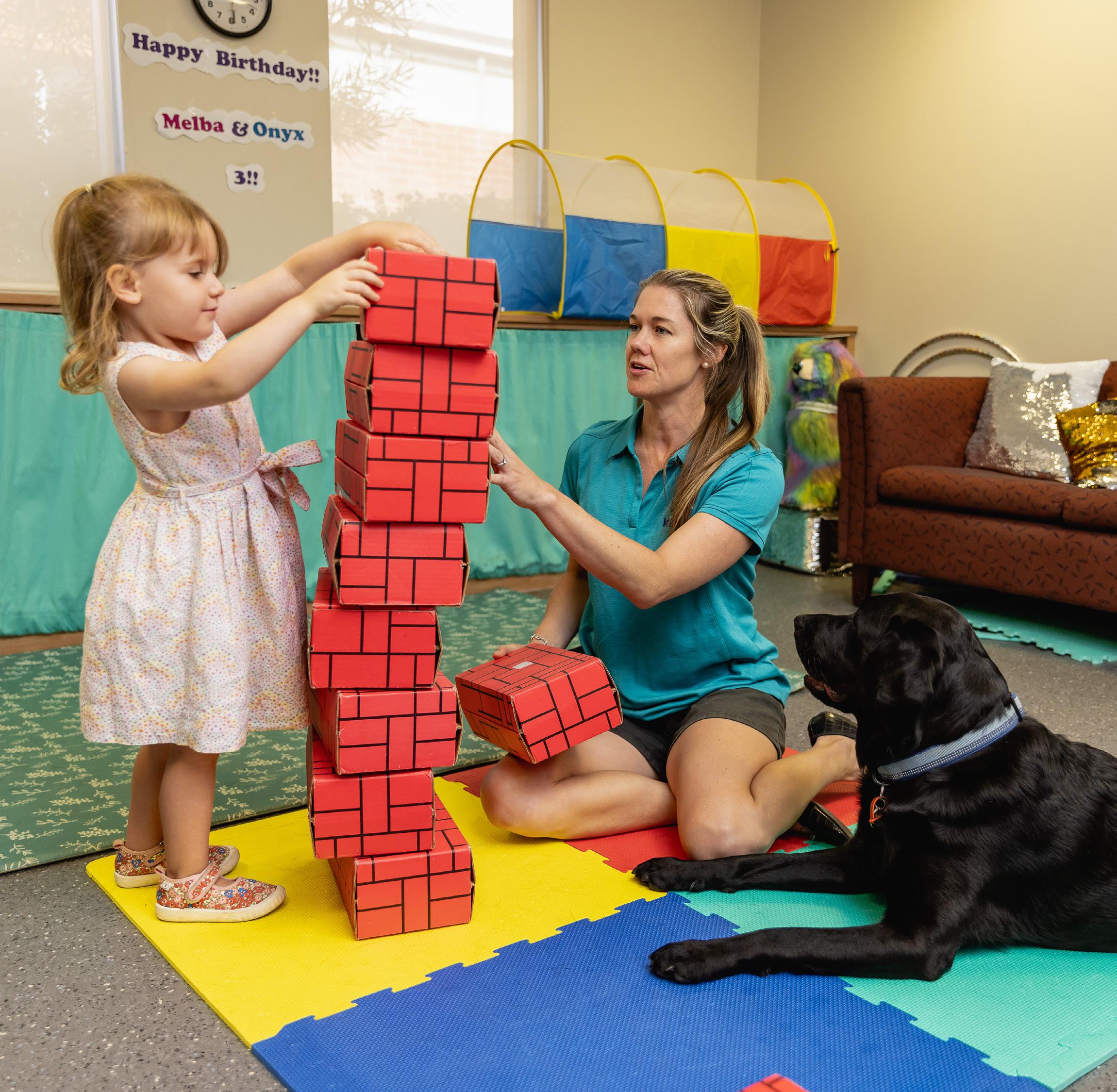
Link to... Therapy & Assistance Dogs
linkonline.com.au 79
KitesdogtrainerVictoria Wilkinson
No one can dispute the special bond that exists between people and dogs. Dogs can provide a sense of calm, comfort and safety to reduce stressful situations.
It’s no wonder, we are witnessing an increase in dogs used in therapy as human interaction with dogs can have numerous physical and psychological benefits.
Kites Children’s Therapy in Western Australia offers a Dog-Assisted Therapy program with goals and activities relating to physical, emotional and social development.
This can include motivation for children to engage in practice skills, gross and fine motor development, emotional regulation, self-care skills, communication with others and pretend play.
The program offered by the Kites team is led by a registered occupational therapist and involves a series of eight sessions. Children with anxiety, ADHD or who are autistic are among those who participate in the program. The use of dogs can add an element of fun compared to traditional occupational therapy. A dog has the ability to break down barriers to make the therapy more relaxed, leading to less stress for the child.
The dogs used in the program are selected from a young age and trained in areas such as obedience, responsiveness, bonding, focus and relationship building. The temperament of the dog is of prime importance.
But how does a playful pup become a therapy dog suited to work with children who are neurodiverse?
According to Kites dog trainer Victoria Wilkinson, it’s a mix of nature and nurture. Kites has a formal partnership with Guide Dogs WA and her role is to identify dogs with a suitable temperament and select them for training from 14 months of age.
“To become a successful therapy dog, it needs to be laid-back, calm and relaxed around children - one that doesn’t get easily excitable. They need to be both confident and adaptable to work with different children and handlers. Importantly, they should be willing and happy to learn new tasks,” she told Link
Wilkinson has international qualifications in Guide Dog Training and Autism Assistance Dog Instruction and has worked in this area for more than a decade.
She recently finished training Onyx, a black labrador who has joined three other dogs working in the program at Kites’ base near Perth.
“Onyx was a natural choice to become a therapy dog. He was a very gentle and relaxed puppy born into a Guide Dogs litter. His disposition made him a good fit. Plus, he comes from a good lineage. His siblings Ian, Harper and Lynette have all gone on to become, a Guide Dog, Autism Assistance Dog and Ambassador Dog,”
At the age of one, after Onyx had completed his socialisation training with Guide Dogs WA, she could see his potential and selected him as a therapy dog for the Kites Dog-Assisted program.
“I had to build on the foundation of training by Guide Dogs WA, developing and building the relationship and bond with him which is essential to support his training. Onyx is
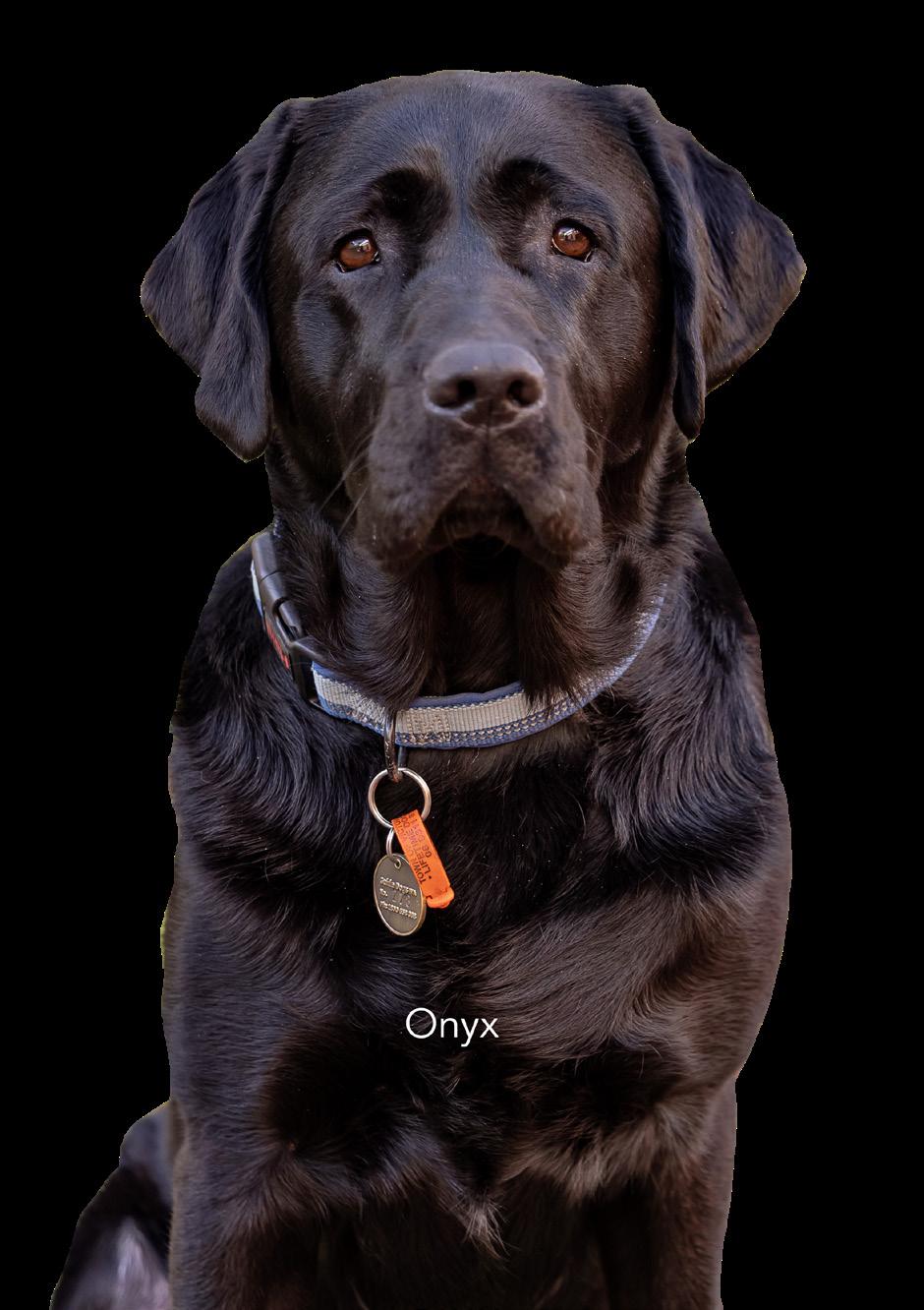
willing and very keen to learn tasks and loves positive feedback and rewards. It is fulfilling working with Onyx and seeing him motivated to learn during these sessions.”
It was also necessary to ensure Onyx would be able to work well with children. The therapy sessions may include him being brushed and groomed. He would be participating in games and tricks, such as rolling a ball and spinning his wheel with his nose, using his paws to turn pages of a book and turn-taking with games. He also had to be comfortable with children dressing him up as part of imaginative play.
After Onyx had mastered the tasks that Wilkinson taught him, practice therapy sessions began. These involved an occupational therapist and a volunteer, usually a staff member’s son or daughter.
How does a playful pup become a therapy dog suited to work with children who are neurodiverse?
“During these sessions, I would work on fine tuning or shaping the tasks by using positive reinforcement and supportive handling techniques to build Onyx’s confidence and develop better understanding. I also looked at better ways I could encourage Onyx to complete tasks by being mindful of better eye contact, tone of voice, lures and rewards.”
When Onyx was 18 months old, Wilkinson stepped back and the OT Nat O'Neil became the primary handler.
As a working dog within the Kites Dog-Assisted Therapy program, Onyx’s average day includes two sessions. Each one is mentally challenging, so three is the maximum. Sessions and demands on the dog can vary because each child is different.
Every Dog-Assisted Therapy session has a purpose. Goals are established
Link to... Therapy & Assistance Dogs
80
between therapist and the child’s parents. It may be to motivate a child to engage in functional activities or to develop certain motor skills.
The goal could be to improve emotional regulation by creating a calm and judgement free space where the child can enjoy close play and tactile contact with the dog. Tasks such as caring for the dog such as brushing Onyx or getting him water. During activities with the dog, children often communicate more openly.
At each therapy session as well as the therapist, dog and child, there will also be the parent or caregiver. It’s important that what’s learned in the therapy room is applied to real-life situations, so they have long-lasting impact.
Dog-Assisted Therapy can also support children who have a fear of dogs.
During Onyx’s working day, he requires downtime with the opportunity to play with other therapy dogs in Guide Dog
WA’s enrichment yard which is close to the Kites therapy rooms. Onyx also has periods for grooming and other enrichment activities.
“I take him for regular lead walks for exercise, enrichment and to maintain his general focus, responsiveness and lead behaviour. At the end of the day, he goes home with a volunteer boarder who will care for him in their house. They will drop him off and pick him up each day from the therapy rooms,” O'Neil said.
Dog-Assisted Therapy can also support children who have a fear of dogs. With gentle guidance from the occupational therapist, trust can be built between the dog and the child as part of a gradual process. It may start with the child looking at the dog through a therapy window, to talking about dogs, to eventually sitting next to the animal to engage in activities.
While the modern practice of DogAssisted Therapy was first introduced in the 1970s, in recent times the use of therapy dogs has become more widespread. Individual therapy is funded under the NDIS and Kites is a NDIS registered service provider in WA offering Dog-Assisted Therapy.
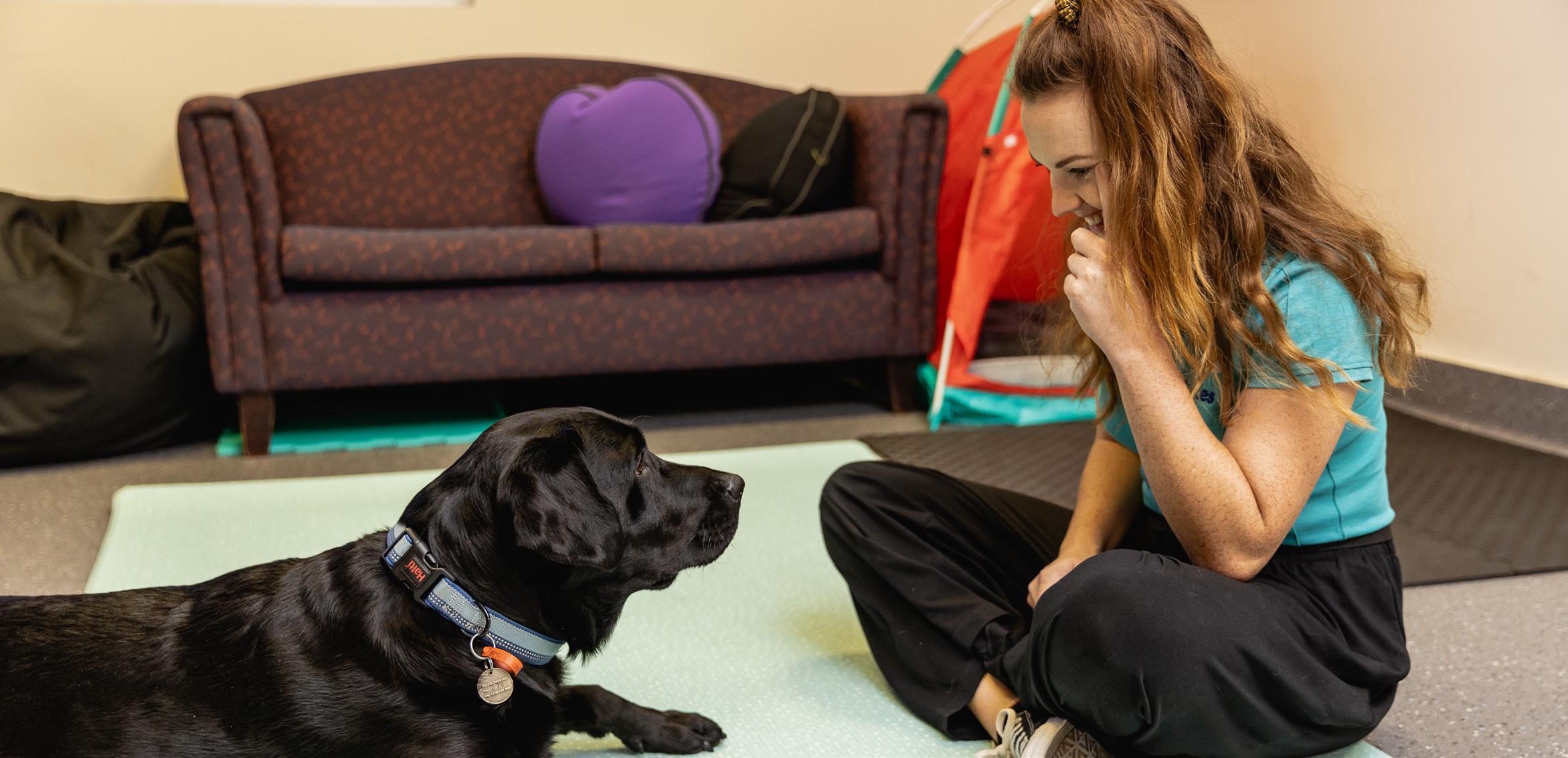
Kites is seeing such a demand for the program that a second hub is planned for the northern suburbs of Perth to be opened in the autumn.
The Channel 7 Telethon Trust, a charitable organisation providing life-changing support for Western Australian children living with disabilities, is assisting with the program’s expansion. Telethon is providing resources and additional training for therapy dogs, allowing more children in Western Australia to benefit from Dog-Assisted Therapy.
Wilkinson is pleased to see the growth of the program and the positive impact it has on others.
“My role of selecting the right dog is vital. Bringing out the best in the dog to help support each child to reach their goals is profoundly rewarding. It’s positively impacting the child and also the whole family. It’s uplifting to hear feedback from families of how the interactions and relationships developed in therapy sessions between the dog and the child has such positive benefits.”
If you’d like to find out more about Dog-Assisted Therapy, go to:
www.kitestherapyorg.au/DAT
K i t es
onaltherapistNatO’Neil THERAPY & ASSISTANCE DOGS linkonline.com.au 81
occupati
Can I bring my dog with me?
Assistance animals and disability discrimination law.
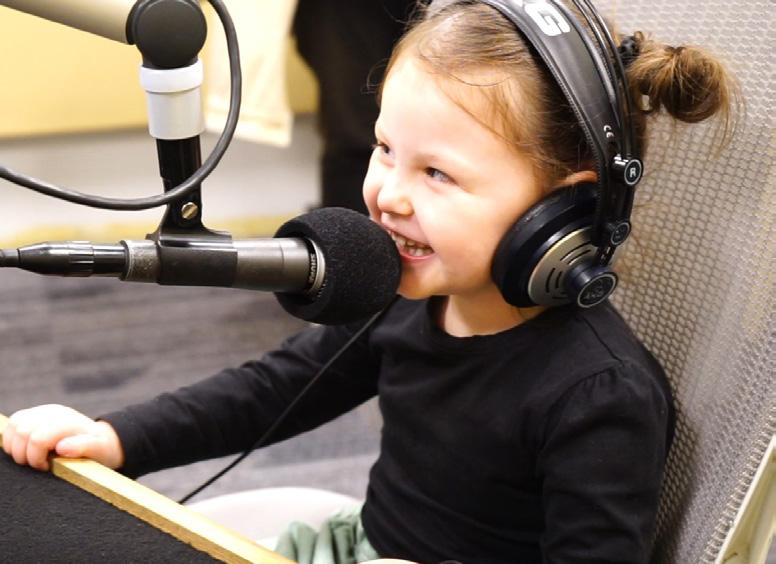
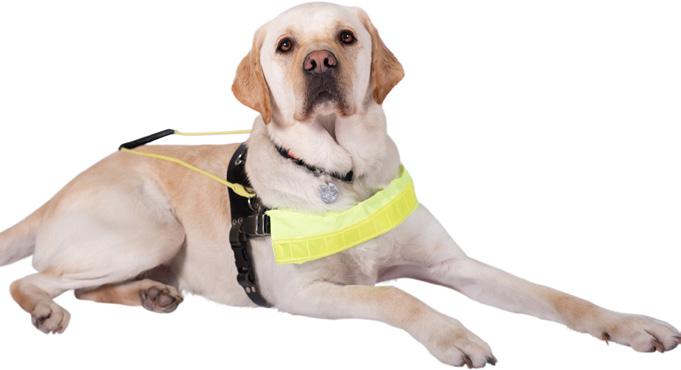
Assistance animals are a critical part of life for many Australians with disabilities. From navigating sidewalks to bustling shopping centres, accompanying their person to court or to a café, assistance animals ensure that people with a variety of disabilities can access public places.
While most people react to assistance animal (usually a dog) with an overwhelming desire to pat the animal (not appropriate when they are working), there is also a lot of people who reject assistance animals when out and about in the community. Stories of people with assistance animals accessing cafes, restaurants and rideshare
cards being refused entry are, unfortunately, very common.
Showing up to a public space (or service in the case of ride share cars) to be rejected and refused entry is not only humiliating but it is unlawful. As readers know, disability discrimination laws are available at a federal and state or territory level but if we consider federal laws so as to benefit most readers, the Disability Discrimination Act 1992 (DDA) provides specific protection for people with disabilities using assistance animals. This is an important protection to be aware of if you suspect that you have been treated unfavourably because of your disability.
For example, if you order a ride share car and the driver pulls up but cancels the ride when they see that you have an assistance animal, you can seek
protection under the DDA and make a complaint to the Australian Human Rights Commission. For further information on making a complaint to the Australian Human Rights Commission, check out their website: https://humanrights.gov.au/complaints
When making a disability discrimination complaint, remember that you can get help from a disability advocate or lawyer if you want but it is not essential. If you think you have faced disability discrimination while with your assistance animal, contact a disability rights lawyer or the Australian Human Rights Commission as soon as possible to discuss your options.

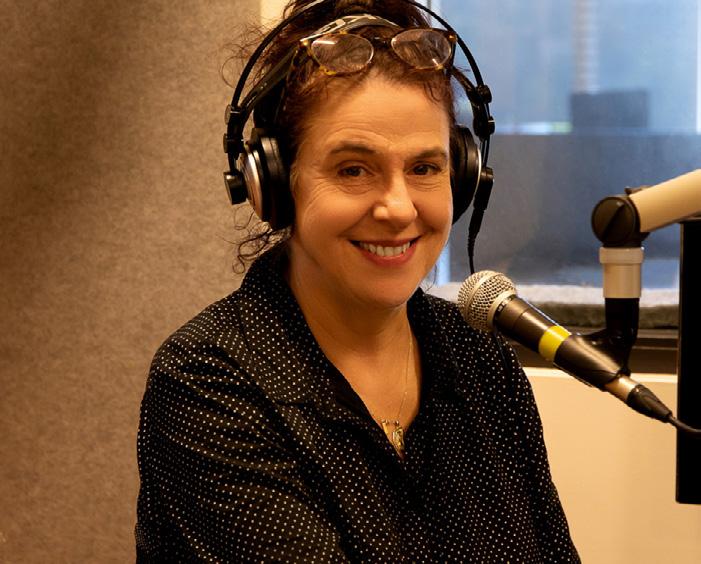 Natalie
Natalie
Wade is founder and principal lawyer at Equity Lawyers. PH: 08 7084 1190 or E: natalie@equitylawyers.com.au
Link to... Assistance Dogs
April/May 2023 82 Vision Australia Radio is a national print disability audio content provider, offering accessible news and information via radio and podcast. Stream our live radio services on your smart device or via varadio.org. Check out our range of disability focused podcasts on your favourite podcast app.
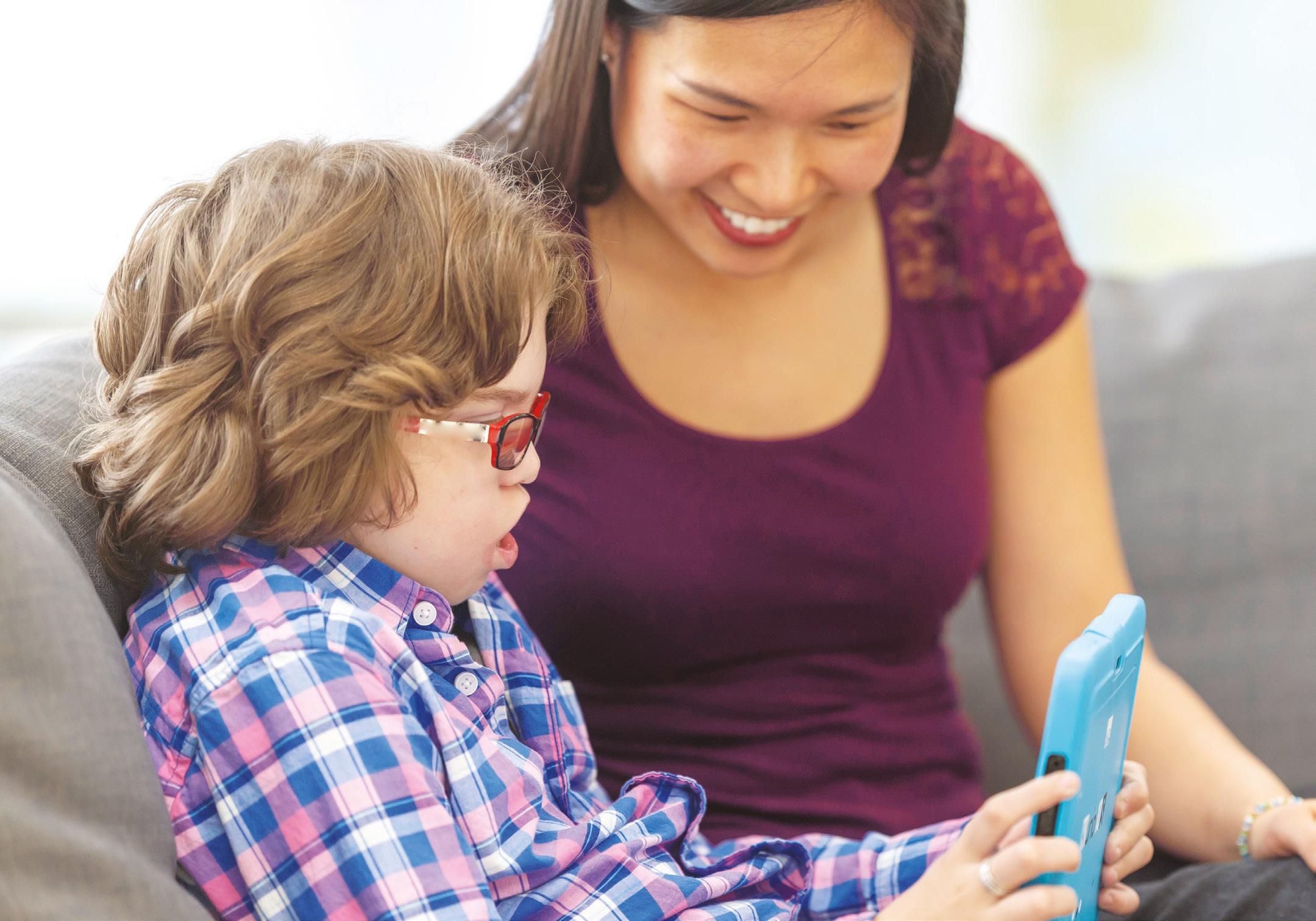
www.telstra.com/disability So everyone can thrive We want to help every Australian build a connected future, including those who have difficulty using a standard home phone. Telstra’s Disability Equipment Program offers a range of solutions to support customers who are older or have a disability. Visit telstra.com/disability, or call our Hotline 1800 068 424 (Voice), 133 677 (TTY).
FOCUS ABILITY
ON



FOCUSONABILITY












































































































































































 Visit the Wonder Sheet display at Stand #36 ATSA Melbourne Expo for a product demonstration.
Visit the Wonder Sheet display at Stand #36 ATSA Melbourne Expo for a product demonstration.




























 By Anita Aherne
By Anita Aherne

























 Natalie
Natalie



